
- About Michelle Waters
- Curriculum Vitae
- Tools I Use
- Podcast Episodes
- How To Be Our Podcast Guest
- Member Login
- Member Helpdesk
- Support Portal
- Resource Partners
- Writing Partners
- Certificate Verification
- How To Contribute
by Michelle Boyd Waters, M.Ed.

Essays Every High School Student Should Read
December 4, 2016 in Pedagogy
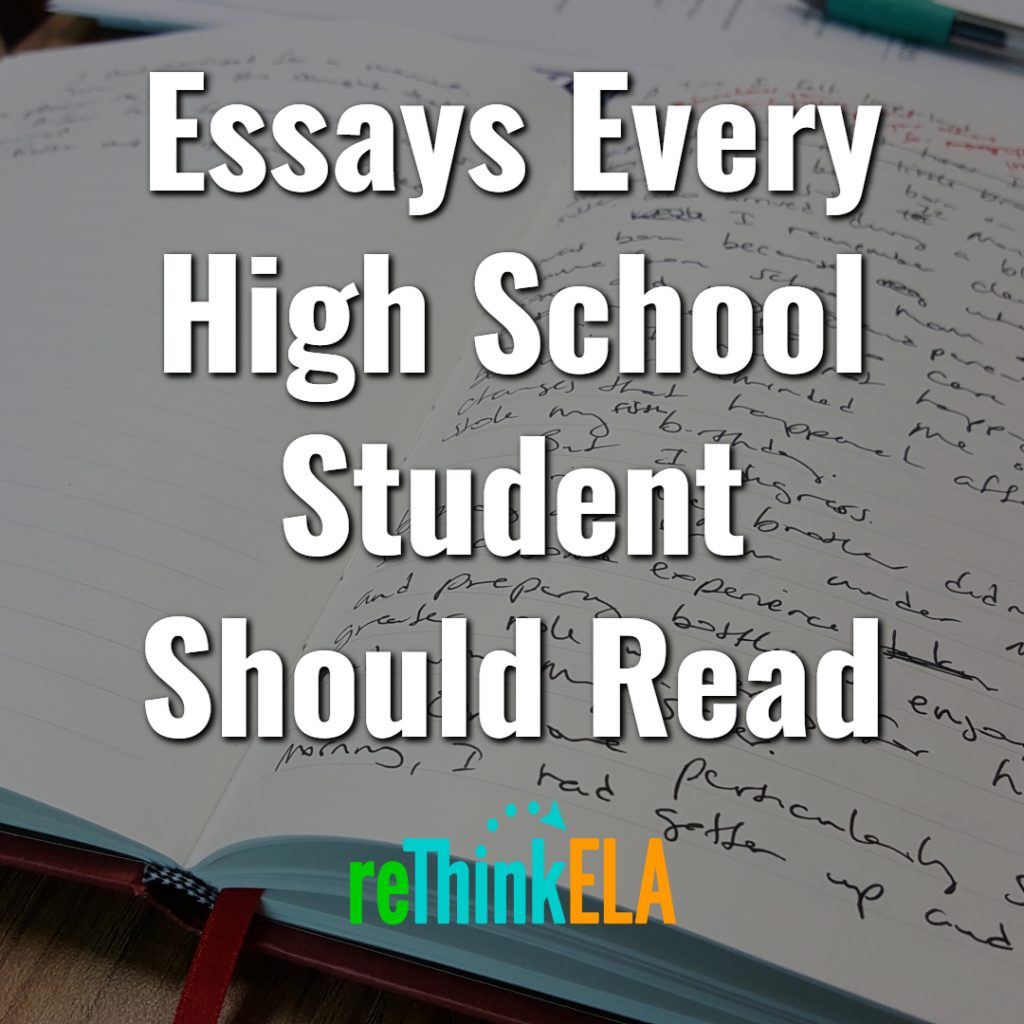
One of the most important goals of any English class should be to help students learn how to express themselves to an audience — how to tell their own stories, how to provide much-needed information, and how to convince others to see things from a different perspective.
Below are some essays students can read, not only to help them see how such writing is done in the real world, but also to learn more about the world around them.
[bctt tweet=”Need a #mentortext for student essays? Check out these exemplars for personal narrative, argumentative, and expository essay writing.”]
Note : This is a living list. I will continue adding to it as I find important essays and articles, and as my readers make suggestions.
If You Think Racism Doesn’t Exist by Jordan Womack | Lesson Plan
A 17-year-old Oklahoma author details incidents of discrimination he has faced within his own community. Brief, yet impactful, the author’s authenticity strikes readers at their core and naturally leads the audience to consider other perspectives.
Facebook hack ‘worse than when my house burned down’ says teacher by Michelle Boyd Waters, M.Ed.
When a hacker destroyed my Facebook account and I couldn’t find a way to reach out to Facebook, I decided to use my story, voice, and platform to shed light on a situation faced by people around the world. This can serve as a mentor text for students writing personal narratives on shared experiences in the context of current events.
Letter from a Vietnamese to an Iraqi Refugee by Andrew Lam
Vietnamese lecturer, journalist, and author Andrew Lam offers advice in this letter to a young Iraqi refugee he sees in a photograph on the Internet.
Allowing Teenage Boys to Love Their Friends by Jan Hoffman
Learn why early and lifelong friendships are as vital for boys as they are for girls and what happens when those friendships are fractured.
Chris Cecil: Plagiarism Gets You Fired by Leonard Pitts Jr
The Miami Herald columnist and 2004 Pulitzer Prize for Commentary winner castigates a Georgia newspaper editor for plagiarizing his work. This column would go great with this followup article from The Boston Globe: Ga. Editor is Fired for Lifting Columns .
Class Dismissed by Walter Kirn
The author of Lost in the Meritocracy postulates that getting rid of the high school senior year might be good for students.
Complaint Box | Packaging by Dylan Quinn
A high school junior complains about the impossible-to-open packaging faced by consumers of everything “from action figures to zip drives.”
Drowning in Dishes, but Finding a Home by Danial Adkison
In this 2014 essay, a teenager learns important lessons from his boss at Pizza Hut.
How to Tame a Wild Tongue by Gloria Anzaldua
An American scholar of Chicana cultural theory discusses how she maintained her identity by refusing to submit to linguistic terrorism.
Humble Beast: Samaje Perine by John Rohde
The five-time Oklahoma Sportswriter of the Year features the University of Oklahoma’s running back.
In Praise of the F Word by Mary Sherry
An adult literacy program teacher argues that allowing students to fail will actually help them.
The Joy of Reading and Writing: Superman and Me by Sherman Alexie
A Native American novelist recounts his experience loving reading and finally writing in spite of a culture that expected him to fail in the “non-Indian world” in order to be accepted.
Lane’s Legacy: One Final Ride by Keith Ryan Cartwright
A heartbreaking look back at the hours before and the circumstances surrounding Lane Frost’s untimely death, followed by reflections on his rise to fame — before and after death.
Learning to Read by Malcolm X
The 1960s Civil Rights leader writes about how educating himself in prison opened his mind and lead him to become one of the leading spokesmen for black separatism.
Learning to Read and Write by Frederick Douglass
A former slave born in 1818 discusses how he learned to read in spite of laws against teaching slaves and how reading opened his eyes to his “wretched condition, without remedy.”
Learning From Animal Friendships by Erica Goode
Scientists consider studying the phenomenon of cross-species animal friendships like the ones you see on YouTube.
Losing Everything, Except What Really Matters by Dan Barry
After a 2011 tornado destroys a house, but spares the family, a reporter writes about what’s important.
The Marked Woman by David Grann
How an Osage Indian family in Oklahoma became the prime target of one of the most sinister crimes in American history.
Meet Mikey, 8: U.S. Has Him on Watch List by Lizette Alvarez
Read about what happens if you happen to share a name of a “suspicious person” on the U.S. No-Fly List.
Newly Homeless in Japan Re-Establish Order Amid Chaos by Michael Wines
After the tsunami that resulted in nuclear disaster in 2011, a reporter writes about the “quiet bravery in the face of tragedy” of the Japanese people.
No Ordinary Joe by Rick Reilly
Why in creation did American Football Conference’s 1981 best young running back Joe Delaney jump into that pit full of water that day, even though he couldn’t swim?
Politics and the English Language By George Orwell
Animal Farm and 1984 author, Orwell correlates the degradation of the English language into multi-syllabic drivel and the corruption of the American political process.
Serving in Florida by Barbara Ehrenreich
The Nickel and Dimed: On (Not) Getting By in America author tells about her experiences attempting to survive on income of low-paying jobs.
Starvation Under the Orange Trees by John Steinbeck
John Steinbeck, who later authored the fictionalized account of Okies in California, The Grapes of Wrath, first wrote this essay documenting the starvation of migrant workers in California during the Great Depression.
To Fall in Love With Anyone, Do This by Mandy Len Catron
Is falling in love really a random event, or can two people “love smarter?”
We’ll Go Forward from this Moment by Leonard Pitts
The 2004 Pulitzer Prize for Commentary winner pens a column chronicling the toughness of the American family’s spirit in the face of the September 11, 2001 World Trade Center attacks. He wrote the column one day after the attacks.
What’s Wrong with Black English? by Rachel L. Jones
Jones, a student at Southern Illinois University in the 1980s, wrote this piece for Newsweek. In her essay, Jones adds her story and perspective to the debate over Black English.
Related topics: Mentor Texts , Teaching Writing
About the author
Michelle Boyd Waters, M.Ed.
I am a secondary English Language Arts teacher, a University of Oklahoma student working on my doctorate in Instructional Leadership and Academic Curriculum with an concentration in English Education and co-Editor of the Oklahoma English Journal. I am constantly seeking ways to amplify students' voices and choices.
A wonderful list of essays! I have neglected to teach essays as literature (only as student writing samples before we began work on an essay, after a novel). I’m looking forward to using these!
Thank you very much! I’d love to hear (or read) your feedback on the selections. Your input can help other teachers decide which essays to teach their students.
This list looks really great. Unfortunately, the first two links I chose were not working. One took me to a professors homepage and the other never opened.
Thank you for letting us know. I checked the “If you think racism doesn’t exist” went to the WordPress.com site where the author wrote his article and “Letter from a Vietnamese to an Iraqi Refugee” went to the Huffington Post article. Is it possible that your school web filter is blocking WordPress and Huffington Post?
Thank you for this. I am teaching a summer class that prepares 8th graders for high school essay writing. Trying to find a way to make it more creative and interesting, even interactive. I like the essays. If you have ideas about specific ways to use them, beyond reading and discussion, I would love to hear them.
You’re welcome! I think additional activities would depend on who your students are, their interests, and which essay(s) you plan to use. Perhaps if you join our RTE Facebook group and tell us about your kids and the essay you want to use, we can devise some activities to help them engage. Check us out here .
Comments are closed.

7sistershomeschool.com
Homeschool Help and Curriculum
Articles and Essays to Read in High School
- Facebook 14
- Pinterest 2423
We were asked to share essays to read in high school.

Reading different kinds of literature is important for high school students. Homeschool high schoolers need to read various genres to develop skills in:
- comprehension
- interpretation
- life skills
- as well as academic achievement
(For more on effectively teaching literature to teens – even those who don’t naturally love books – see my post series here .)
Teens often love reading novels and biographies. Therefore they thrive with curriculum such as 7Sisters:
- British Literature
- American Literature
- Great Christian Writers
- World Literature
These genres are excellent choices, but not the only types of reading material that teens need to experience. In fact, articles and essays are important but often-neglected sources of good reading material. These are good genres for reading because they are shorter types of writing.
Even though essays are articles are shorter in length, they are good for teens. This is because these genres help develop teens’ attention and critical thinking skills as well as the comprehension, inference and evaluation skills listed above. Some essays and articles even help build life skills!
With this in mind, here are suggestions to help you get started compiling a good list of articles and essays to read in high school with your homeschoolers.
Many of these can be found in their entirety on the internet.
- John Milton’s “Areopagitica”
- Jonathan Swift’s “A Modest Proposal”
- Thomas DeQuincey’s “On the Knocking at the Gate in Macbeth”
- Ralph Waldo Emerson’s “Self-Reliance”
- Henry David Thoreau’s “Civil Disobedience”
- William Hazlitt’s “On Going a Journey”
- George Orwell’s “Shooting an Elephant”
- E.B. White’s “A Weekend With the Angels”
- James Baldwin’s “The Fire Next Time”
- Joan Didion’s “Goodbye To All That”
- There are many essays to consider from these authors:
- G.K. Chesterton (here’s a cool reading plan from the American Chesterton Society )
- Michel de Montaigne
- Francis Bacon
- Thomas Babington Macaulay (find some of Macaulay’s works on Project Gutenberg here )
- Virginia Woolf
- Robert Louis Stevenson ( Stevenson’s works here on Project Gutenberg )
- James Thurber
I have also enjoyed looking to acclaimed collections of articles on various subjects for another reading resource in homeschool.
Here are a couple that help engage even reluctant readers (if you pick a subject that interests them) when it’s time to choose articles to read in high school.
- The Best of American Science Writing – Ten Years of the Series (Jesse Cohen, Senior Editor) from Harper Collins publishers.
- The Best American Sports Writing 2000 (Dick Schaap) from Houghton Mifflin.
Sites like these provide a wealth of articles from which to choose:
- Recommended Read-Alouds from the N.Y. Times
- Recommended articles by topic at The Electric Typewriter
Don’t overlook shorter pieces of writing. Including a good selection of essays and articles in your high school reading is smart!
While we are at it, reading essays can be a good kick-off to an essay writing.
This is especially true for older homeschool high schoolers, who have some experience writing essays. With this in mind, perhaps start your junior- or senior-year teens’ essay unit with a few essays to read.
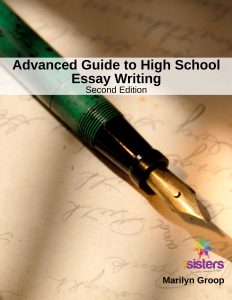
Then download an essay writing guide and get started. Here is our Advanced Essay Writing Guide :
How about introducing your students to Hymns and Creeds as literature. Check out our study guide.
Here’s an essay we wrote in answer to an attack on homeschooling by a Harvard professor .
Do you have favorites to recommend? Leave a comment!
7Sisters email subscribers receive periodic practical encouragement, special offers and NO SPAM EVER.
Click the image above to periodically receive real homeschool value in your inbox.
Sabrina Justison
Dear Sabrina:
I lost a reader that I read in h.s. it contained a compilation of essays. There was an essay in it about a college student who was a jester in a school play and his mother had sewn on bells on the costume which rang at the wrong times . It was so funny that it made me laugh out loud every time I read it. Do you happen to know it?
I graduated in 1967.
Thanks, Isabelle
Hi Isabelle, This is a new one to me, but I did a little research and think you are referring to R. L. Burdette’s Chimes from a Jester’s Bells published in 1897. If you Google his name and the title, you should be able to find places from which you can order a copy. I didn’t find a free text on the internet, but I didn’t dig very deeply, so it may exist somewhere in cyberspace. Hope that helps!
Leave a Reply Cancel reply
Your email address will not be published. Required fields are marked *
Save my name, email, and website in this browser for the next time I comment.
Have a language expert improve your writing
Run a free plagiarism check in 10 minutes, generate accurate citations for free.
- Knowledge Base
- Example of a great essay | Explanations, tips & tricks
Example of a Great Essay | Explanations, Tips & Tricks
Published on February 9, 2015 by Shane Bryson . Revised on July 23, 2023 by Shona McCombes.
This example guides you through the structure of an essay. It shows how to build an effective introduction , focused paragraphs , clear transitions between ideas, and a strong conclusion .
Each paragraph addresses a single central point, introduced by a topic sentence , and each point is directly related to the thesis statement .
As you read, hover over the highlighted parts to learn what they do and why they work.
Instantly correct all language mistakes in your text
Upload your document to correct all your mistakes in minutes

Table of contents
Other interesting articles, frequently asked questions about writing an essay, an appeal to the senses: the development of the braille system in nineteenth-century france.
The invention of Braille was a major turning point in the history of disability. The writing system of raised dots used by visually impaired people was developed by Louis Braille in nineteenth-century France. In a society that did not value disabled people in general, blindness was particularly stigmatized, and lack of access to reading and writing was a significant barrier to social participation. The idea of tactile reading was not entirely new, but existing methods based on sighted systems were difficult to learn and use. As the first writing system designed for blind people’s needs, Braille was a groundbreaking new accessibility tool. It not only provided practical benefits, but also helped change the cultural status of blindness. This essay begins by discussing the situation of blind people in nineteenth-century Europe. It then describes the invention of Braille and the gradual process of its acceptance within blind education. Subsequently, it explores the wide-ranging effects of this invention on blind people’s social and cultural lives.
Lack of access to reading and writing put blind people at a serious disadvantage in nineteenth-century society. Text was one of the primary methods through which people engaged with culture, communicated with others, and accessed information; without a well-developed reading system that did not rely on sight, blind people were excluded from social participation (Weygand, 2009). While disabled people in general suffered from discrimination, blindness was widely viewed as the worst disability, and it was commonly believed that blind people were incapable of pursuing a profession or improving themselves through culture (Weygand, 2009). This demonstrates the importance of reading and writing to social status at the time: without access to text, it was considered impossible to fully participate in society. Blind people were excluded from the sighted world, but also entirely dependent on sighted people for information and education.
In France, debates about how to deal with disability led to the adoption of different strategies over time. While people with temporary difficulties were able to access public welfare, the most common response to people with long-term disabilities, such as hearing or vision loss, was to group them together in institutions (Tombs, 1996). At first, a joint institute for the blind and deaf was created, and although the partnership was motivated more by financial considerations than by the well-being of the residents, the institute aimed to help people develop skills valuable to society (Weygand, 2009). Eventually blind institutions were separated from deaf institutions, and the focus shifted towards education of the blind, as was the case for the Royal Institute for Blind Youth, which Louis Braille attended (Jimenez et al, 2009). The growing acknowledgement of the uniqueness of different disabilities led to more targeted education strategies, fostering an environment in which the benefits of a specifically blind education could be more widely recognized.
Several different systems of tactile reading can be seen as forerunners to the method Louis Braille developed, but these systems were all developed based on the sighted system. The Royal Institute for Blind Youth in Paris taught the students to read embossed roman letters, a method created by the school’s founder, Valentin Hauy (Jimenez et al., 2009). Reading this way proved to be a rather arduous task, as the letters were difficult to distinguish by touch. The embossed letter method was based on the reading system of sighted people, with minimal adaptation for those with vision loss. As a result, this method did not gain significant success among blind students.
Louis Braille was bound to be influenced by his school’s founder, but the most influential pre-Braille tactile reading system was Charles Barbier’s night writing. A soldier in Napoleon’s army, Barbier developed a system in 1819 that used 12 dots with a five line musical staff (Kersten, 1997). His intention was to develop a system that would allow the military to communicate at night without the need for light (Herron, 2009). The code developed by Barbier was phonetic (Jimenez et al., 2009); in other words, the code was designed for sighted people and was based on the sounds of words, not on an actual alphabet. Barbier discovered that variants of raised dots within a square were the easiest method of reading by touch (Jimenez et al., 2009). This system proved effective for the transmission of short messages between military personnel, but the symbols were too large for the fingertip, greatly reducing the speed at which a message could be read (Herron, 2009). For this reason, it was unsuitable for daily use and was not widely adopted in the blind community.
Nevertheless, Barbier’s military dot system was more efficient than Hauy’s embossed letters, and it provided the framework within which Louis Braille developed his method. Barbier’s system, with its dashes and dots, could form over 4000 combinations (Jimenez et al., 2009). Compared to the 26 letters of the Latin alphabet, this was an absurdly high number. Braille kept the raised dot form, but developed a more manageable system that would reflect the sighted alphabet. He replaced Barbier’s dashes and dots with just six dots in a rectangular configuration (Jimenez et al., 2009). The result was that the blind population in France had a tactile reading system using dots (like Barbier’s) that was based on the structure of the sighted alphabet (like Hauy’s); crucially, this system was the first developed specifically for the purposes of the blind.
While the Braille system gained immediate popularity with the blind students at the Institute in Paris, it had to gain acceptance among the sighted before its adoption throughout France. This support was necessary because sighted teachers and leaders had ultimate control over the propagation of Braille resources. Many of the teachers at the Royal Institute for Blind Youth resisted learning Braille’s system because they found the tactile method of reading difficult to learn (Bullock & Galst, 2009). This resistance was symptomatic of the prevalent attitude that the blind population had to adapt to the sighted world rather than develop their own tools and methods. Over time, however, with the increasing impetus to make social contribution possible for all, teachers began to appreciate the usefulness of Braille’s system (Bullock & Galst, 2009), realizing that access to reading could help improve the productivity and integration of people with vision loss. It took approximately 30 years, but the French government eventually approved the Braille system, and it was established throughout the country (Bullock & Galst, 2009).
Although Blind people remained marginalized throughout the nineteenth century, the Braille system granted them growing opportunities for social participation. Most obviously, Braille allowed people with vision loss to read the same alphabet used by sighted people (Bullock & Galst, 2009), allowing them to participate in certain cultural experiences previously unavailable to them. Written works, such as books and poetry, had previously been inaccessible to the blind population without the aid of a reader, limiting their autonomy. As books began to be distributed in Braille, this barrier was reduced, enabling people with vision loss to access information autonomously. The closing of the gap between the abilities of blind and the sighted contributed to a gradual shift in blind people’s status, lessening the cultural perception of the blind as essentially different and facilitating greater social integration.
The Braille system also had important cultural effects beyond the sphere of written culture. Its invention later led to the development of a music notation system for the blind, although Louis Braille did not develop this system himself (Jimenez, et al., 2009). This development helped remove a cultural obstacle that had been introduced by the popularization of written musical notation in the early 1500s. While music had previously been an arena in which the blind could participate on equal footing, the transition from memory-based performance to notation-based performance meant that blind musicians were no longer able to compete with sighted musicians (Kersten, 1997). As a result, a tactile musical notation system became necessary for professional equality between blind and sighted musicians (Kersten, 1997).
Braille paved the way for dramatic cultural changes in the way blind people were treated and the opportunities available to them. Louis Braille’s innovation was to reimagine existing reading systems from a blind perspective, and the success of this invention required sighted teachers to adapt to their students’ reality instead of the other way around. In this sense, Braille helped drive broader social changes in the status of blindness. New accessibility tools provide practical advantages to those who need them, but they can also change the perspectives and attitudes of those who do not.
Bullock, J. D., & Galst, J. M. (2009). The Story of Louis Braille. Archives of Ophthalmology , 127(11), 1532. https://doi.org/10.1001/archophthalmol.2009.286.
Herron, M. (2009, May 6). Blind visionary. Retrieved from https://eandt.theiet.org/content/articles/2009/05/blind-visionary/.
Jiménez, J., Olea, J., Torres, J., Alonso, I., Harder, D., & Fischer, K. (2009). Biography of Louis Braille and Invention of the Braille Alphabet. Survey of Ophthalmology , 54(1), 142–149. https://doi.org/10.1016/j.survophthal.2008.10.006.
Kersten, F.G. (1997). The history and development of Braille music methodology. The Bulletin of Historical Research in Music Education , 18(2). Retrieved from https://www.jstor.org/stable/40214926.
Mellor, C.M. (2006). Louis Braille: A touch of genius . Boston: National Braille Press.
Tombs, R. (1996). France: 1814-1914 . London: Pearson Education Ltd.
Weygand, Z. (2009). The blind in French society from the Middle Ages to the century of Louis Braille . Stanford: Stanford University Press.
If you want to know more about AI tools , college essays , or fallacies make sure to check out some of our other articles with explanations and examples or go directly to our tools!
- Ad hominem fallacy
- Post hoc fallacy
- Appeal to authority fallacy
- False cause fallacy
- Sunk cost fallacy
College essays
- Choosing Essay Topic
- Write a College Essay
- Write a Diversity Essay
- College Essay Format & Structure
- Comparing and Contrasting in an Essay
(AI) Tools
- Grammar Checker
- Paraphrasing Tool
- Text Summarizer
- AI Detector
- Plagiarism Checker
- Citation Generator
Prevent plagiarism. Run a free check.
An essay is a focused piece of writing that explains, argues, describes, or narrates.
In high school, you may have to write many different types of essays to develop your writing skills.
Academic essays at college level are usually argumentative : you develop a clear thesis about your topic and make a case for your position using evidence, analysis and interpretation.
The structure of an essay is divided into an introduction that presents your topic and thesis statement , a body containing your in-depth analysis and arguments, and a conclusion wrapping up your ideas.
The structure of the body is flexible, but you should always spend some time thinking about how you can organize your essay to best serve your ideas.
Your essay introduction should include three main things, in this order:
- An opening hook to catch the reader’s attention.
- Relevant background information that the reader needs to know.
- A thesis statement that presents your main point or argument.
The length of each part depends on the length and complexity of your essay .
A thesis statement is a sentence that sums up the central point of your paper or essay . Everything else you write should relate to this key idea.
A topic sentence is a sentence that expresses the main point of a paragraph . Everything else in the paragraph should relate to the topic sentence.
At college level, you must properly cite your sources in all essays , research papers , and other academic texts (except exams and in-class exercises).
Add a citation whenever you quote , paraphrase , or summarize information or ideas from a source. You should also give full source details in a bibliography or reference list at the end of your text.
The exact format of your citations depends on which citation style you are instructed to use. The most common styles are APA , MLA , and Chicago .
Cite this Scribbr article
If you want to cite this source, you can copy and paste the citation or click the “Cite this Scribbr article” button to automatically add the citation to our free Citation Generator.
Bryson, S. (2023, July 23). Example of a Great Essay | Explanations, Tips & Tricks. Scribbr. Retrieved April 1, 2024, from https://www.scribbr.com/academic-essay/example-essay-structure/
Is this article helpful?
Shane Bryson
Shane finished his master's degree in English literature in 2013 and has been working as a writing tutor and editor since 2009. He began proofreading and editing essays with Scribbr in early summer, 2014.
Other students also liked
How to write an essay introduction | 4 steps & examples, academic paragraph structure | step-by-step guide & examples, how to write topic sentences | 4 steps, examples & purpose, "i thought ai proofreading was useless but..".
I've been using Scribbr for years now and I know it's a service that won't disappoint. It does a good job spotting mistakes”

- Online Course
40 Best Essays of All Time (Including Links & Writing Tips)
I wanted to improve my writing skills. I thought that reading the forty best essays of all time would bring me closer to my goal.
I had little money (buying forty collections of essays was out of the question) so I’ve found them online instead. I’ve hacked through piles of them, and finally, I’ve found the great ones. Now I want to share the whole list with you (with the addition of my notes about writing). Each item on the list has a direct link to the essay, so please click away and indulge yourself. Also, next to each essay, there’s an image of the book that contains the original work.
About this essay list:
Reading essays is like indulging in candy; once you start, it’s hard to stop. I sought out essays that were not only well-crafted but also impactful. These pieces genuinely shifted my perspective. Whether you’re diving in for enjoyment or to hone your writing, these essays promise to leave an imprint. It’s fascinating how an essay can resonate with you, and even if details fade, its essence remains. I haven’t ranked them in any way; they’re all stellar. Skim through, explore the summaries, and pick up some writing tips along the way. For more essay gems, consider “Best American Essays” by Joyce Carol Oates or “101 Essays That Will Change The Way You Think” curated by Brianna Wiest.

40 Best Essays of All Time (With Links And Writing Tips)
1. david sedaris – laugh, kookaburra.

A great family drama takes place against the backdrop of the Australian wilderness. And the Kookaburra laughs… This is one of the top essays of the lot. It’s a great mixture of family reminiscences, travel writing, and advice on what’s most important in life. You’ll also learn an awful lot about the curious culture of the Aussies.
Writing tips from the essay:
- Use analogies (you can make it funny or dramatic to achieve a better effect): “Don’t be afraid,” the waiter said, and he talked to the kookaburra in a soothing, respectful voice, the way you might to a child with a switchblade in his hand”.
- You can touch a few cognate stories in one piece of writing . Reveal the layers gradually. Intertwine them and arrange for a grand finale where everything is finally clear.
- Be on the side of the reader. Become their friend and tell the story naturally, like around the dinner table.
- Use short, punchy sentences. Tell only as much as is required to make your point vivid.
- Conjure sentences that create actual feelings: “I had on a sweater and a jacket, but they weren’t quite enough, and I shivered as we walked toward the body, and saw that it was a . . . what, exactly?”
- You may ask a few tough questions in a row to provoke interest and let the reader think.
2. Charles D’Ambrosio – Documents

Do you think your life punches you in the face all too often? After reading this essay, you will change your mind. Reading about loss and hardships often makes us sad at first, but then enables us to feel grateful for our lives . D’Ambrosio shares his documents (poems, letters) that had a major impact on his life, and brilliantly shows how not to let go of the past.
- The most powerful stories are about your family and the childhood moments that shaped your life.
- You don’t need to build up tension and pussyfoot around the crux of the matter. Instead, surprise the reader by telling it like it is: “The poem was an allegory about his desire to leave our family.” Or: “My father had three sons. I’m the eldest; Danny, the youngest, killed himself sixteen years ago”.
- You can use real documents and quotes from your family and friends. It makes it so much more personal and relatable.
- Don’t cringe before the long sentence if you know it’s a strong one.
- At the end of the essay, you may come back to the first theme to close the circuit.
- Using slightly poetic language is acceptable, as long as it improves the story.
3. E. B. White – Once more to the lake

What does it mean to be a father? Can you see your younger self, reflected in your child? This beautiful essay tells the story of the author, his son, and their traditional stay at a placid lake hidden within the forests of Maine. This place of nature is filled with sunshine and childhood memories. It also provides for one of the greatest meditations on nature and the passing of time.
- Use sophisticated language, but not at the expense of readability.
- Use vivid language to trigger the mirror neurons in the reader’s brain: “I took along my son, who had never had any fresh water up his nose and who had seen lily pads only from train windows”.
- It’s important to mention universal feelings that are rarely talked about (it helps to create a bond between two minds): “You remember one thing, and that suddenly reminds you of another thing. I guess I remembered clearest of all the early mornings when the lake was cool and motionless”.
- Animate the inanimate: “this constant and trustworthy body of water”.
- Mentioning tales of yore is a good way to add some mystery and timelessness to your piece.
- Using double, or even triple “and” in one sentence is fine. It can make the sentence sing.
4. Zadie Smith – Fail Better

Aspiring writers feel tremendous pressure to perform. The daily quota of words often turns out to be nothing more than gibberish. What then? Also, should the writer please the reader or should she be fully independent? What does it mean to be a writer, anyway? This essay is an attempt to answer these questions, but its contents are not only meant for scribblers. Within it, you’ll find some great notes about literary criticism, how we treat art , and the responsibility of the reader.
- A perfect novel ? There’s no such thing.
- The novel always reflects the inner world of the writer. That’s why we’re fascinated with writers.
- Writing is not simply about craftsmanship, but about taking your reader to the unknown lands. In the words of Christopher Hitchens: “Your ideal authors ought to pull you from the foundering of your previous existence, not smilingly guide you into a friendly and peaceable harbor.”
- Style comes from your unique personality and the perception of the world. It takes time to develop it.
- Never try to tell it all. “All” can never be put into language. Take a part of it and tell it the best you can.
- Avoid being cliché. Try to infuse new life into your writing .
- Writing is about your way of being. It’s your game. Paradoxically, if you try to please everyone, your writing will become less appealing. You’ll lose the interest of the readers. This rule doesn’t apply in the business world where you have to write for a specific person (a target audience).
- As a reader, you have responsibilities too. According to the critics, every thirty years, there’s just a handful of great novels. Maybe it’s true. But there’s also an element of personal connection between the reader and the writer. That’s why for one person a novel is a marvel, while for the other, nothing special at all. That’s why you have to search and find the author who will touch you.
5. Virginia Woolf – Death of the Moth

Amid an ordinary day, sitting in a room of her own, Virginia Woolf tells about the epic struggle for survival and the evanescence of life. This short essay is truly powerful. In the beginning, the atmosphere is happy. Life is in full force. And then, suddenly, it fades away. This sense of melancholy would mark the last years of Woolf’s life.
- The melody of language… A good sentence is like music: “Moths that fly by day are not properly to be called moths; they do not excite that pleasant sense of dark autumn nights and ivy-blossom which the commonest yellow- underwing asleep in the shadow of the curtain never fails to rouse in us”.
- You can show the grandest in the mundane (for example, the moth at your window and the drama of life and death).
- Using simple comparisons makes the style more lucid: “Being intent on other matters I watched these futile attempts for a time without thinking, unconsciously waiting for him to resume his flight, as one waits for a machine, that has stopped momentarily, to start again without considering the reason of its failure”.
6. Meghan Daum – My Misspent Youth

Many of us, at some point or another, dream about living in New York. Meghan Daum’s take on the subject differs slightly from what you might expect. There’s no glamour, no Broadway shows, and no fancy restaurants. Instead, there’s the sullen reality of living in one of the most expensive cities in the world. You’ll get all the juicy details about credit cards, overdue payments, and scrambling for survival. It’s a word of warning. But it’s also a great story about shattered fantasies of living in a big city. Word on the street is: “You ain’t promised mañana in the rotten manzana.”
- You can paint a picture of your former self. What did that person believe in? What kind of world did he or she live in?
- “The day that turned your life around” is a good theme you may use in a story. Memories of a special day are filled with emotions. Strong emotions often breed strong writing.
- Use cultural references and relevant slang to create a context for your story.
- You can tell all the details of the story, even if in some people’s eyes you’ll look like the dumbest motherfucker that ever lived. It adds to the originality.
- Say it in a new way: “In this mindset, the dollars spent, like the mechanics of a machine no one bothers to understand, become an abstraction, an intangible avenue toward self-expression, a mere vehicle of style”.
- You can mix your personal story with the zeitgeist or the ethos of the time.
7. Roger Ebert – Go Gentle Into That Good Night

Probably the greatest film critic of all time, Roger Ebert, tells us not to rage against the dying of the light. This essay is full of courage, erudition, and humanism. From it, we learn about what it means to be dying (Hitchens’ “Mortality” is another great work on that theme). But there’s so much more. It’s a great celebration of life too. It’s about not giving up, and sticking to your principles until the very end. It brings to mind the famous scene from Dead Poets Society where John Keating (Robin Williams) tells his students: “Carpe, carpe diem, seize the day boys, make your lives extraordinary”.
- Start with a powerful sentence: “I know it is coming, and I do not fear it, because I believe there is nothing on the other side of death to fear.”
- Use quotes to prove your point -”‘Ask someone how they feel about death’, he said, ‘and they’ll tell you everyone’s gonna die’. Ask them, ‘In the next 30 seconds?’ No, no, no, that’s not gonna happen”.
- Admit the basic truths about reality in a childlike way (especially after pondering quantum physics) – “I believe my wristwatch exists, and even when I am unconscious, it is ticking all the same. You have to start somewhere”.
- Let other thinkers prove your point. Use quotes and ideas from your favorite authors and friends.
8. George Orwell – Shooting an Elephant

Even after one reading, you’ll remember this one for years. The story, set in British Burma, is about shooting an elephant (it’s not for the squeamish). It’s also the most powerful denunciation of colonialism ever put into writing. Orwell, apparently a free representative of British rule, feels to be nothing more than a puppet succumbing to the whim of the mob.
- The first sentence is the most important one: “In Moulmein, in Lower Burma, I was hated by large numbers of people — the only time in my life that I have been important enough for this to happen to me”.
- You can use just the first paragraph to set the stage for the whole piece of prose.
- Use beautiful language that stirs the imagination: “I remember that it was a cloudy, stuffy morning at the beginning of the rains.” Or: “I watched him beating his bunch of grass against his knees, with that preoccupied grandmotherly air that elephants have.”
- If you’ve ever been to war, you will have a story to tell: “(Never tell me, by the way, that the dead look peaceful. Most of the corpses I have seen looked devilish.)”
- Use simple words, and admit the sad truth only you can perceive: “They did not like me, but with the magical rifle in my hands I was momentarily worth watching”.
- Share words of wisdom to add texture to the writing: “I perceived at this moment that when the white man turns tyrant it is his freedom that he destroys.”
- I highly recommend reading everything written by Orwell, especially if you’re looking for the best essay collections on Amazon or Goodreads.
9. George Orwell – A Hanging

It’s just another day in Burma – time to hang a man. Without much ado, Orwell recounts the grim reality of taking another person’s life. A man is taken from his cage and in a few minutes, he’s going to be hanged. The most horrible thing is the normality of it. It’s a powerful story about human nature. Also, there’s an extraordinary incident with the dog, but I won’t get ahead of myself.
- Create brilliant, yet short descriptions of characters: “He was a Hindu, a puny wisp of a man, with a shaven head and vague liquid eyes. He had a thick, sprouting mustache, absurdly too big for his body, rather like the mustache of a comic man on the films”.
- Understand and share the felt presence of a unique experience: “It is curious, but till that moment I had never realized what it means to destroy a healthy, conscious man”.
- Make your readers hear the sound that will stay with them forever: “And then when the noose was fixed, the prisoner began crying out on his god. It was a high, reiterated cry of “Ram! Ram! Ram! Ram!”
- Make the ending original by refusing the tendency to seek closure or summing it up.
10. Christopher Hitchens – Assassins of The Mind

In one of the greatest essays written in defense of free speech, Christopher Hitchens shares many examples of how modern media kneel to the explicit threats of violence posed by Islamic extremists. He recounts the story of his friend, Salman Rushdie, author of Satanic Verses who, for many years, had to watch over his shoulder because of the fatwa of Ayatollah Khomeini. With his usual wit, Hitchens shares various examples of people who died because of their opinions and of editors who refuse to publish anything related to Islam because of fear (and it was written long before the Charlie Hebdo massacre). After reading the essay, you realize that freedom of expression is one of the most precious things we have and that we have to fight for it. I highly recommend all essay collections penned by Hitchens, especially the ones written for Vanity Fair.
- Assume that the readers will know the cultural references. When they do, their self-esteem goes up – they are a part of an insider group.
- When proving your point, give a variety of real-life examples from eclectic sources. Leave no room for ambiguity or vagueness. Research and overall knowledge are essential here.
- Use italics to emphasize a specific word or phrase (here I use the underlining): “We live now in a climate where every publisher and editor and politician has to weigh in advance the possibility of violent Muslim reprisal. In consequence, several things have not happened.”
- Think about how to make it sound more original: “So there is now a hidden partner in our cultural and academic and publishing and the broadcasting world: a shadowy figure that has, uninvited, drawn up a chair to the table.”
11. Christopher Hitchens – The New Commandments

It’s high time to shatter the tablets and amend the biblical rules of conduct. Watch, as Christopher Hitchens slays one commandment after the other on moral, as well as historical grounds. For example, did you know that there are many versions of the divine law dictated by God to Moses which you can find in the Bible? Aren’t we thus empowered to write our version of a proper moral code? If you approach it with an open mind, this essay may change the way you think about the Bible and religion.
- Take the iconoclastic approach. Have a party on the hallowed soil.
- Use humor to undermine orthodox ideas (it seems to be the best way to deal with an established authority).
- Use sarcasm and irony when appropriate (or not): “Nobody is opposed to a day of rest. The international Communist movement got its start by proclaiming a strike for an eight-hour day on May 1, 1886, against Christian employers who used child labor seven days a week”.
- Defeat God on legal grounds: “Wise lawmakers know that it is a mistake to promulgate legislation that is impossible to obey”.
- Be ruthless in the logic of your argument. Provide evidence.
12. Phillip Lopate – Against Joie de Vivre

While reading this fantastic essay, this quote from Slavoj Žižek kept coming back to me: “I think that the only life of deep satisfaction is a life of eternal struggle, especially struggle with oneself. If you want to remain happy, just remain stupid. Authentic masters are never happy; happiness is a category of slaves”. I can bear the onus of happiness or joie de vivre for some time. But this force enables me to get free and wallow in the sweet feelings of melancholy and nostalgia. By reading this work of Lopate, you’ll enter into the world of an intelligent man who finds most social rituals a drag. It’s worth exploring.
- Go against the grain. Be flamboyant and controversial (if you can handle it).
- Treat the paragraph like a group of thoughts on one theme. Next paragraph, next theme.
- Use references to other artists to set the context and enrich the prose: “These sunny little canvases with their talented innocence, the third-generation spirit of Montmartre, bore testimony to a love of life so unbending as to leave an impression of rigid narrow-mindedness as extreme as any Savonarola. Their rejection of sorrow was total”.
- Capture the emotions in life that are universal, yet remain unspoken.
- Don’t be afraid to share your intimate experiences.
13. Philip Larkin – The Pleasure Principle

This piece comes from the Required Writing collection of personal essays. Larkin argues that reading in verse should be a source of intimate pleasure – not a medley of unintelligible thoughts that only the author can (or can’t?) decipher. It’s a sobering take on modern poetry and a great call to action for all those involved in it. Well worth a read.
- Write about complicated ideas (such as poetry) simply. You can change how people look at things if you express yourself enough.
- Go boldly. The reader wants a bold writer: “We seem to be producing a new kind of bad poetry, not the old kind that tries to move the reader and fails, but one that does not even try”.
- Play with words and sentence length. Create music: “It is time some of you playboys realized, says the judge, that reading a poem is hard work. Fourteen days in stir. Next case”.
- Persuade the reader to take action. Here, direct language is the most effective.
14. Sigmund Freud – Thoughts for the Times on War and Death

This essay reveals Freud’s disillusionment with the whole project of Western civilization. How the peaceful European countries could engage in a war that would eventually cost over 17 million lives? What stirs people to kill each other? Is it their nature, or are they puppets of imperial forces with agendas of their own? From the perspective of time, this work by Freud doesn’t seem to be fully accurate. Even so, it’s well worth your time.
- Commence with long words derived from Latin. Get grandiloquent, make your argument incontrovertible, and leave your audience discombobulated.
- Use unending sentences, so that the reader feels confused, yet impressed.
- Say it well: “In this way, he enjoyed the blue sea and the grey; the beauty of snow-covered mountains and green meadowlands; the magic of northern forests and the splendor of southern vegetation; the mood evoked by landscapes that recall great historical events, and the silence of untouched nature”.
- Human nature is a subject that never gets dry.
15. Zadie Smith – Some Notes on Attunement
“You are privy to a great becoming, but you recognize nothing” – Francis Dolarhyde. This one is about the elusiveness of change occurring within you. For Zadie, it was hard to attune to the vibes of Joni Mitchell – especially her Blue album. But eventually, she grew up to appreciate her genius, and all the other things changed as well. This top essay is all about the relationship between humans, and art. We shouldn’t like art because we’re supposed to. We should like it because it has an instantaneous, emotional effect on us. Although, according to Stansfield (Gary Oldman) in Léon, liking Beethoven is rather mandatory.
- Build an expectation of what’s coming: “The first time I heard her I didn’t hear her at all”.
- Don’t be afraid of repetition if it feels good.
- Psychedelic drugs let you appreciate things you never appreciated.
- Intertwine a personal journey with philosophical musings.
- Show rather than tell: “My friends pitied their eyes. The same look the faithful give you as you hand them back their “literature” and close the door in their faces”.
- Let the poets speak for you: “That time is past, / And all its aching joys are now no
- more, / And all its dizzy raptures”.
- By voicing your anxieties, you can heal the anxieties of the reader. In that way, you say: “I’m just like you. I’m your friend in this struggle”.
- Admit your flaws to make your persona more relatable.
16. Annie Dillard – Total Eclipse

My imagination was always stirred by the scene of the solar eclipse in Pharaoh, by Boleslaw Prus. I wondered about the shock of the disoriented crowd when they saw how their ruler could switch off the light. Getting immersed in this essay by Annie Dillard has a similar effect. It produces amazement and some kind of primeval fear. It’s not only the environment that changes; it’s your mind and the perception of the world. After the eclipse, nothing is going to be the same again.
- Yet again, the power of the first sentence draws you in: “It had been like dying, that sliding down the mountain pass”.
- Don’t miss the extraordinary scene. Then describe it: “Up in the sky, like a crater from some distant cataclysm, was a hollow ring”.
- Use colloquial language. Write as you talk. Short sentences often win.
- Contrast the numinous with the mundane to enthrall the reader.
17. Édouard Levé – When I Look at a Strawberry, I Think of a Tongue

This suicidally beautiful essay will teach you a lot about the appreciation of life and the struggle with mental illness. It’s a collection of personal, apparently unrelated thoughts that show us the rich interior of the author. You look at the real-time thoughts of another person, and then recognize the same patterns within yourself… It sounds like a confession of a person who’s about to take their life, and it’s striking in its originality.
- Use the stream-of-consciousness technique and put random thoughts on paper. Then, polish them: “I have attempted suicide once, I’ve been tempted four times to attempt it”.
- Place the treasure deep within the story: “When I look at a strawberry, I think of a tongue, when I lick one, of a kiss”.
- Don’t worry about what people might think. The more you expose, the more powerful the writing. Readers also take part in the great drama. They experience universal emotions that mostly stay inside. You can translate them into writing.
18. Gloria E. Anzaldúa – How to Tame a Wild Tongue

Anzaldúa, who was born in south Texas, had to struggle to find her true identity. She was American, but her culture was grounded in Mexico. In this way, she and her people were not fully respected in either of the countries. This essay is an account of her journey of becoming the ambassador of the Chicano (Mexican-American) culture. It’s full of anecdotes, interesting references, and different shades of Spanish. It’s a window into a new cultural dimension that you’ve never experienced before.
- If your mother tongue is not English, but you write in English, use some of your unique homeland vocabulary.
- You come from a rich cultural heritage. You can share it with people who never heard about it, and are not even looking for it, but it is of immense value to them when they discover it.
- Never forget about your identity. It is precious. It is a part of who you are. Even if you migrate, try to preserve it. Use it to your best advantage and become the voice of other people in the same situation.
- Tell them what’s really on your mind: “So if you want to hurt me, talk badly about my language. Ethnic identity is twin skin to linguistic identity – I am my language”.
19. Kurt Vonnegut – Dispatch From A Man Without a Country

In terms of style, this essay is flawless. It’s simple, conversational, humorous, and yet, full of wisdom. And when Vonnegut becomes a teacher and draws an axis of “beginning – end”, and, “good fortune – bad fortune” to explain literature, it becomes outright hilarious. It’s hard to find an author with such a down-to-earth approach. He doesn’t need to get intellectual to prove a point. And the point could be summed up by the quote from Great Expectations – “On the Rampage, Pip, and off the Rampage, Pip – such is Life!”
- Start with a curious question: “Do you know what a twerp is?”
- Surprise your readers with uncanny analogies: “I am from a family of artists. Here I am, making a living in the arts. It has not been a rebellion. It’s as though I had taken over the family Esso station.”
- Use your natural language without too many special effects. In time, the style will crystalize.
- An amusing lesson in writing from Mr. Vonnegut: “Here is a lesson in creative writing. First rule: Do not use semicolons. They are transvestite hermaphrodites representing absolutely nothing. All they do is show you’ve been to college”.
- You can put actual images or vignettes between the paragraphs to illustrate something.
20. Mary Ruefle – On Fear

Most psychologists and gurus agree that fear is the greatest enemy of success or any creative activity. It’s programmed into our minds to keep us away from imaginary harm. Mary Ruefle takes on this basic human emotion with flair. She explores fear from so many angles (especially in the world of poetry-writing) that at the end of this personal essay, you will look at it, dissect it, untangle it, and hopefully be able to say “f**k you” the next time your brain is trying to stop you.
- Research your subject thoroughly. Ask people, have interviews, get expert opinions, and gather as much information as possible. Then scavenge through the fields of data, and pull out the golden bits that will let your prose shine.
- Use powerful quotes to add color to your story: “The poet who embarks on the creation of the poem (as I know by experience), begins with the aimless sensation of a hunter about to embark on a night hunt through the remotest of forests. Unaccountable dread stirs in his heart”. – Lorca.
- Writing advice from the essay: “One of the fears a young writer has is not being able to write as well as he or she wants to, the fear of not being able to sound like X or Y, a favorite author. But out of fear, hopefully, is born a young writer’s voice”.
21. Susan Sontag – Against Interpretation

In this highly intellectual essay, Sontag fights for art and its interpretation. It’s a great lesson, especially for critics and interpreters who endlessly chew on works that simply defy interpretation. Why don’t we just leave the art alone? I always hated it when at school they asked me: “What did the author have in mind when he did X or Y?” Iēsous Pantocrator! Hell if I know! I will judge it through my subjective experience!
- Leave the art alone: “Today is such a time, when the project of interpretation is reactionary, stifling. Like the fumes of the automobile and heavy industry which befoul the urban atmosphere, the effusion of interpretations of art today poisons our sensibilities”.
- When you have something really important to say, style matters less.
- There’s no use in creating a second meaning or inviting interpretation of our art. Just leave it be and let it speak for itself.
22. Nora Ephron – A Few Words About Breasts

This is a heartwarming, coming-of-age story about a young girl who waits in vain for her breasts to grow. It’s simply a humorous and pleasurable read. The size of breasts is a big deal for women. If you’re a man, you may peek into the mind of a woman and learn many interesting things. If you’re a woman, maybe you’ll be able to relate and at last, be at peace with your bosom.
- Touch an interesting subject and establish a strong connection with the readers (in that case, women with small breasts). Let your personality shine through the written piece. If you are lighthearted, show it.
- Use hyphens to create an impression of real talk: “My house was full of apples and peaches and milk and homemade chocolate chip cookies – which were nice, and good for you, but-not-right-before-dinner-or-you’ll-spoil-your-appetite.”
- Use present tense when you tell a story to add more life to it.
- Share the pronounced, memorable traits of characters: “A previous girlfriend named Solange, who was famous throughout Beverly Hills High School for having no pigment in her right eyebrow, had knitted them for him (angora dice)”.
23. Carl Sagan – Does Truth Matter – Science, Pseudoscience, and Civilization

Carl Sagan was one of the greatest proponents of skepticism, and an author of numerous books, including one of my all-time favorites – The Demon-Haunted World . He was also a renowned physicist and the host of the fantastic Cosmos: A Personal Voyage series, which inspired a whole generation to uncover the mysteries of the cosmos. He was also a dedicated weed smoker – clearly ahead of his time. The essay that you’re about to read is a crystallization of his views about true science, and why you should check the evidence before believing in UFOs or similar sorts of crap.
- Tell people the brutal truth they need to hear. Be the one who spells it out for them.
- Give a multitude of examples to prove your point. Giving hard facts helps to establish trust with the readers and show the veracity of your arguments.
- Recommend a good book that will change your reader’s minds – How We Know What Isn’t So: The Fallibility of Human Reason in Everyday Life
24. Paul Graham – How To Do What You Love

How To Do What You Love should be read by every college student and young adult. The Internet is flooded with a large number of articles and videos that are supposed to tell you what to do with your life. Most of them are worthless, but this one is different. It’s sincere, and there’s no hidden agenda behind it. There’s so much we take for granted – what we study, where we work, what we do in our free time… Surely we have another two hundred years to figure it out, right? Life’s too short to be so naïve. Please, read the essay and let it help you gain fulfillment from your work.
- Ask simple, yet thought-provoking questions (especially at the beginning of the paragraph) to engage the reader: “How much are you supposed to like what you do?”
- Let the readers question their basic assumptions: “Prestige is like a powerful magnet that warps even your beliefs about what you enjoy. It causes you to work not on what you like, but what you’d like to like”.
- If you’re writing for a younger audience, you can act as a mentor. It’s beneficial for younger people to read a few words of advice from a person with experience.
25. John Jeremiah Sullivan – Mister Lytle

A young, aspiring writer is about to become a nurse of a fading writer – Mister Lytle (Andrew Nelson Lytle), and there will be trouble. This essay by Sullivan is probably my favorite one from the whole list. The amount of beautiful sentences it contains is just overwhelming. But that’s just a part of its charm. It also takes you to the Old South which has an incredible atmosphere. It’s grim and tawny but you want to stay there for a while.
- Short, distinct sentences are often the most powerful ones: “He had a deathbed, in other words. He didn’t go suddenly”.
- Stay consistent with the mood of the story. When reading Mister Lytle you are immersed in that southern, forsaken, gloomy world, and it’s a pleasure.
- The spectacular language that captures it all: “His French was superb, but his accent in English was best—that extinct mid-Southern, land-grant pioneer speech, with its tinges of the abandoned Celtic urban Northeast (“boned” for burned) and its raw gentility”.
- This essay is just too good. You have to read it.
26. Joan Didion – On Self Respect

Normally, with that title, you would expect some straightforward advice about how to improve your character and get on with your goddamn life – but not from Joan Didion. From the very beginning, you can feel the depth of her thinking, and the unmistakable style of a true woman who’s been hurt. You can learn more from this essay than from whole books about self-improvement . It reminds me of the scene from True Detective, where Frank Semyon tells Ray Velcoro to “own it” after he realizes he killed the wrong man all these years ago. I guess we all have to “own it”, recognize our mistakes, and move forward sometimes.
- Share your moral advice: “Character — the willingness to accept responsibility for one’s own life — is the source from which self-respect springs”.
- It’s worth exploring the subject further from a different angle. It doesn’t matter how many people have already written on self-respect or self-reliance – you can still write passionately about it.
- Whatever happens, you must take responsibility for it. Brave the storms of discontent.
27. Susan Sontag – Notes on Camp

I’ve never read anything so thorough and lucid about an artistic current. After reading this essay, you will know what camp is. But not only that – you will learn about so many artists you’ve never heard of. You will follow their traces and go to places where you’ve never been before. You will vastly increase your appreciation of art. It’s interesting how something written as a list could be so amazing. All the listicles we usually see on the web simply cannot compare with it.
- Talking about artistic sensibilities is a tough job. When you read the essay, you will see how much research, thought and raw intellect came into it. But that’s one of the reasons why people still read it today, even though it was written in 1964.
- You can choose an unorthodox way of expression in the medium for which you produce. For example, Notes on Camp is a listicle – one of the most popular content formats on the web. But in the olden days, it was uncommon to see it in print form.
- Just think about what is camp: “And third among the great creative sensibilities is Camp: the sensibility of failed seriousness, of the theatricalization of experience. Camp refuses both the harmonies of traditional seriousness and the risks of fully identifying with extreme states of feeling”.
28. Ralph Waldo Emerson – Self-Reliance

That’s the oldest one from the lot. Written in 1841, it still inspires generations of people. It will let you understand what it means to be self-made. It contains some of the most memorable quotes of all time. I don’t know why, but this one especially touched me: “Every true man is a cause, a country, and an age; requires infinite spaces and numbers and time fully to accomplish his design, and posterity seems to follow his steps as a train of clients”. Now isn’t it purely individualistic, American thought? Emerson told me (and he will tell you) to do something amazing with my life. The language it contains is a bit archaic, but that just adds to the weight of the argument. You can consider it to be a meeting with a great philosopher who shaped the ethos of the modern United States.
- You can start with a powerful poem that will set the stage for your work.
- Be free in your creative flow. Do not wait for the approval of others: “What I must do is all that concerns me, not what the people think. This rule, equally arduous in actual and in intellectual life, may serve for the whole distinction between greatness and meanness”.
- Use rhetorical questions to strengthen your argument: “I hear a preacher announce for his text and topic the expediency of one of the institutions of his church. Do I not know beforehand that not possibly say a new and spontaneous word?”
29. David Foster Wallace – Consider The Lobster

When you want simple field notes about a food festival, you needn’t send there the formidable David Foster Wallace. He sees right through the hypocrisy and cruelty behind killing hundreds of thousands of innocent lobsters – by boiling them alive. This essay uncovers some of the worst traits of modern American people. There are no apologies or hedging one’s bets. There’s just plain truth that stabs you in the eye like a lobster claw. After reading this essay, you may reconsider the whole animal-eating business.
- When it’s important, say it plainly and stagger the reader: “[Lobsters] survive right up until they’re boiled. Most of us have been in supermarkets or restaurants that feature tanks of live lobster, from which you can pick out your supper while it watches you point”.
- In your writing, put exact quotes of the people you’ve been interviewing (including slang and grammatical errors). It makes it more vivid, and interesting.
- You can use humor in serious situations to make your story grotesque.
- Use captions to expound on interesting points of your essay.
30. David Foster Wallace – The Nature of the Fun

The famous novelist and author of the most powerful commencement speech ever done is going to tell you about the joys and sorrows of writing a work of fiction. It’s like taking care of a mutant child that constantly oozes smelly liquids. But you love that child and you want others to love it too. It’s a very humorous account of what it means to be an author. If you ever plan to write a novel, you should read that one. And the story about the Chinese farmer is just priceless.
- Base your point on a chimerical analogy. Here, the writer’s unfinished work is a “hideously damaged infant”.
- Even in expository writing, you may share an interesting story to keep things lively.
- Share your true emotions (even when you think they won’t interest anyone). Often, that’s exactly what will interest the reader.
- Read the whole essay for marvelous advice on writing fiction.
31. Margaret Atwood – Attitude

This is not an essay per se, but I included it on the list for the sake of variety. It was delivered as a commencement speech at The University of Toronto, and it’s about keeping the right attitude. Soon after leaving university, most graduates have to forget about safety, parties, and travel and start a new life – one filled with a painful routine that will last until they drop. Atwood says that you don’t have to accept that. You can choose how you react to everything that happens to you (and you don’t have to stay in that dead-end job for the rest of your days).
- At times, we are all too eager to persuade, but the strongest persuasion is not forceful. It’s subtle. It speaks to the heart. It affects you gradually.
- You may be tempted to talk about a subject by first stating what it is not, rather than what it is. Try to avoid that.
- Simple advice for writers (and life in general): “When faced with the inevitable, you always have a choice. You may not be able to alter reality, but you can alter your attitude towards it”.
32. Jo Ann Beard – The Fourth State of Matter

Read that one as soon as possible. It’s one of the most masterful and impactful essays you’ll ever read. It’s like a good horror – a slow build-up, and then your jaw drops to the ground. To summarize the story would be to spoil it, so I recommend that you just dig in and devour this essay in one sitting. It’s a perfect example of “show, don’t tell” writing, where the actions of characters are enough to create the right effect. No need for flowery adjectives here.
- The best story you will tell is going to come from your personal experience.
- Use mysteries that will nag the reader. For example, at the beginning of the essay, we learn about the “vanished husband” but there’s no explanation. We have to keep reading to get the answer.
- Explain it in simple terms: “You’ve got your solid, your liquid, your gas, and then your plasma”. Why complicate?
33. Terence McKenna – Tryptamine Hallucinogens and Consciousness

To me, Terence McKenna was one of the most interesting thinkers of the twentieth century. His many lectures (now available on YouTube) attracted millions of people who suspect that consciousness holds secrets yet to be unveiled. McKenna consumed psychedelic drugs for most of his life and it shows (in a positive way). Many people consider him a looney, and a hippie, but he was so much more than that. He dared to go into the abyss of his psyche and come back to tell the tale. He also wrote many books (the most famous being Food Of The Gods ), built a huge botanical garden in Hawaii , lived with shamans, and was a connoisseur of all things enigmatic and obscure. Take a look at this essay, and learn more about the explorations of the subconscious mind.
- Become the original thinker, but remember that it may require extraordinary measures: “I call myself an explorer rather than a scientist because the area that I’m looking at contains insufficient data to support even the dream of being a science”.
- Learn new words every day to make your thoughts lucid.
- Come up with the most outlandish ideas to push the envelope of what’s possible. Don’t take things for granted or become intellectually lazy. Question everything.
34. Eudora Welty – The Little Store

By reading this little-known essay, you will be transported into the world of the old American South. It’s a remembrance of trips to the little store in a little town. It’s warm and straightforward, and when you read it, you feel like a child once more. All these beautiful memories live inside of us. They lay somewhere deep in our minds, hidden from sight. The work by Eudora Welty is an attempt to uncover some of them and let you get reacquainted with some smells and tastes of the past.
- When you’re from the South, flaunt it. It’s still good old English but sometimes it sounds so foreign. I can hear the Southern accent too: “There were almost tangible smells – licorice recently sucked in a child’s cheek, dill-pickle brine that had leaked through a paper sack in a fresh trail across the wooden floor, ammonia-loaded ice that had been hoisted from wet Croker sacks and slammed into the icebox with its sweet butter at the door, and perhaps the smell of still-untrapped mice”.
- Yet again, never forget your roots.
- Childhood stories can be the most powerful ones. You can write about how they shaped you.
35. John McPhee – The Search for Marvin Gardens

The Search for Marvin Gardens contains many layers of meaning. It’s a story about a Monopoly championship, but also, it’s the author’s search for the lost streets visible on the board of the famous board game. It also presents a historical perspective on the rise and fall of civilizations, and on Atlantic City, which once was a lively place, and then, slowly declined, the streets filled with dirt and broken windows.
- There’s nothing like irony: “A sign- ‘Slow, Children at Play’- has been bent backward by an automobile”.
- Telling the story in apparently unrelated fragments is sometimes better than telling the whole thing in a logical order.
- Creativity is everything. The best writing may come just from connecting two ideas and mixing them to achieve a great effect. Shush! The muse is whispering.
36. Maxine Hong Kingston – No Name Woman

A dead body at the bottom of the well makes for a beautiful literary device. The first line of Orhan Pamuk’s novel My Name Is Red delivers it perfectly: “I am nothing but a corpse now, a body at the bottom of a well”. There’s something creepy about the idea of the well. Just think about the “It puts the lotion in the basket” scene from The Silence of the Lambs. In the first paragraph of Kingston’s essay, we learn about a suicide committed by uncommon means of jumping into the well. But this time it’s a real story. Who was this woman? Why did she do it? Read the essay.
- Mysterious death always gets attention. The macabre details are like daiquiris on a hot day – you savor them – you don’t let them spill.
- One sentence can speak volumes: “But the rare urge west had fixed upon our family, and so my aunt crossed boundaries not delineated in space”.
- It’s interesting to write about cultural differences – especially if you have the relevant experience. Something normal for us is unthinkable for others. Show this different world.
- The subject of sex is never boring.
37. Joan Didion – On Keeping A Notebook

Slouching Towards Bethlehem is one of the most famous collections of essays of all time. In it, you will find a curious piece called On Keeping A Notebook. It’s not only a meditation about keeping a journal. It’s also Didion’s reconciliation with her past self. After reading it, you will seriously reconsider your life’s choices and look at your life from a wider perspective.
- When you write things down in your journal, be more specific – unless you want to write a deep essay about it years later.
- Use the beauty of the language to relate to the past: “I have already lost touch with a couple of people I used to be; one of them, a seventeen-year-old, presents little threat, although it would be of some interest to me to know again what it feels like to sit on a river levee drinking vodka-and-orange-juice and listening to Les Paul and Mary Ford and their echoes sing ‘How High the Moon’ on the car radio”.
- Drop some brand names if you want to feel posh.
38. Joan Didion – Goodbye To All That

This one touched me because I also lived in New York City for a while. I don’t know why, but stories about life in NYC are so often full of charm and this eerie-melancholy-jazz feeling. They are powerful. They go like this: “There was a hard blizzard in NYC. As the sound of sirens faded, Tony descended into the dark world of hustlers and pimps.” That’s pulp literature but in the context of NYC, it always sounds cool. Anyway, this essay is amazing in too many ways. You just have to read it.
- Talk about New York City. They will read it.
- Talk about the human experience: “It did occur to me to call the desk and ask that the air conditioner be turned off, I never called, because I did not know how much to tip whoever might come—was anyone ever so young?”
- Look back at your life and reexamine it. Draw lessons from it.
39. George Orwell – Reflections on Gandhi
George Orwell could see things as they were. No exaggeration, no romanticism – just facts. He recognized totalitarianism and communism for what they were and shared his worries through books like 1984 and Animal Farm . He took the same sober approach when dealing with saints and sages. Today, we regard Gandhi as one of the greatest political leaders of the twentieth century – and rightfully so. But did you know that when asked about the Jews during World War II, Gandhi said that they should commit collective suicide and that it: “would have aroused the world and the people of Germany to Hitler’s violence.” He also recommended utter pacifism in 1942, during the Japanese invasion, even though he knew it would cost millions of lives. But overall he was a good guy. Read the essay and broaden your perspective on the Bapu of the Indian Nation.
- Share a philosophical thought that stops the reader for a moment: “No doubt alcohol, tobacco, and so forth are things that a saint must avoid, but sainthood is also a thing that human beings must avoid”.
- Be straightforward in your writing – no mannerisms, no attempts to create ‘style’, and no invocations of the numinous – unless you feel the mystical vibe.
40. George Orwell – Politics and the English Language
Let Mr. Orwell give you some writing tips. Written in 1946, this essay is still one of the most helpful documents on writing in English. Orwell was probably the first person who exposed the deliberate vagueness of political language. He was very serious about it and I admire his efforts to slay all unclear sentences (including ones written by distinguished professors). But it’s good to make it humorous too from time to time. My favorite examples of that would be the immortal Soft Language sketch by George Carlin or the “Romans Go Home” scene from Monty Python’s Life of Brian. Overall, it’s a great essay filled with examples from many written materials. It’s a must-read for any writer.
- Listen to the master: “This mixture of vagueness and sheer incompetence is the most marked characteristic of modern English prose.” Do something about it.
- This essay is all about writing better, so go to the source if you want the goodies.

Other Essays You May Find Interesting
The list that I’ve prepared is by no means complete. The literary world is full of exciting essays and you’ll never know which one is going to change your life. I’ve found reading essays very rewarding because sometimes, a single one means more than reading a whole book. It’s almost like wandering around and peeking into the minds of the greatest writers and thinkers that ever lived. To make this list more comprehensive, below I included more essays you may find interesting.
Oliver Sacks – On Libraries
One of the greatest contributors to the knowledge about the human mind, Oliver Sacks meditates on the value of libraries and his love of books.
Noam Chomsky – The Responsibility of Intellectuals
Chomsky did probably more than anyone else to define the role of the intelligentsia in the modern world . There is a war of ideas over there – good and bad – intellectuals are going to be those who ought to be fighting for the former.
Sam Harris – The Riddle of The Gun
Sam Harris, now a famous philosopher and neuroscientist, takes on the problem of gun control in the United States. His thoughts are clear of prejudice. After reading this, you’ll appreciate the value of logical discourse overheated, irrational debate that more often than not has real implications on policy.
Tim Ferriss – Some Practical Thoughts on Suicide
This piece was written as a blog post , but it’s worth your time. The author of the NYT bestseller The 4-Hour Workweek shares an emotional story about how he almost killed himself, and what can you do to save yourself or your friends from suicide.
Edward Said – Reflections on Exile
The life of Edward Said was a truly fascinating one. Born in Jerusalem, he lived between Palestine and Egypt and finally settled down in the United States, where he completed his most famous work – Orientalism. In this essay, he shares his thoughts about what it means to be in exile.
Richard Feynman – It’s as Simple as One, Two, Three…
Richard Feynman is one of the most interesting minds of the twentieth century. He was a brilliant physicist, but also an undeniably great communicator of science, an artist, and a traveler. By reading this essay, you can observe his thought process when he tries to figure out what affects our perception of time. It’s a truly fascinating read.
Rabindranath Tagore – The Religion of The Forest
I like to think about Tagore as my spiritual Friend. His poems are just marvelous. They are like some of the Persian verses that praise love, nature, and the unity of all things. By reading this short essay, you will learn a lot about Indian philosophy and its relation to its Western counterpart.
Richard Dawkins – Letter To His 10-Year-Old Daughter
Every father should be able to articulate his philosophy of life to his children. With this letter that’s similar to what you find in the Paris Review essays , the famed atheist and defender of reason, Richard Dawkins, does exactly that. It’s beautifully written and stresses the importance of looking at evidence when we’re trying to make sense of the world.
Albert Camus – The Minotaur (or, The Stop In Oran)
Each person requires a period of solitude – a period when one’s able to gather thoughts and make sense of life. There are many places where you may attempt to find quietude. Albert Camus tells about his favorite one.
Koty Neelis – 21 Incredible Life Lessons From Anthony Bourdain
I included it as the last one because it’s not really an essay, but I just had to put it somewhere. In this listicle, you’ll find the 21 most original thoughts of the high-profile cook, writer, and TV host, Anthony Bourdain. Some of them are shocking, others are funny, but they’re all worth checking out.
Lucius Annaeus Seneca – On the Shortness of Life
It’s similar to the Rubaiyat of Omar Khayyam because it praises life. Seneca shares some of his stoic philosophy and tells you not to waste your time on stupidities. Drink! – for once dead you shall never return.
Bertrand Russell – In Praise of Idleness
This old essay is a must-read for modern humans. We are so preoccupied with our work, our phones, and all the media input we drown in our business. Bertrand Russell tells you to chill out a bit – maybe it will do you some good.
James Baldwin – Stranger in the Village
It’s an essay on the author’s experiences as an African-American in a Swiss village, exploring race, identity, and alienation while highlighting the complexities of racial dynamics and the quest for belonging.
Bonus – More writing tips from two great books
The mission to improve my writing skills took me further than just going through the essays. I’ve come across some great books on writing too. I highly recommend you read them in their entirety. They’re written beautifully and contain lots of useful knowledge. Below you’ll find random (but useful) notes that I took from The Sense of Style and On Writing.
The Sense of Style – By Steven Pinker
- Style manuals are full of inconsistencies. Following their advice might not be the best idea. They might make your prose boring.
- Grammarians from all eras condemn students for not knowing grammar. But it just evolves. It cannot be rigid.
- “Nothing worth learning can be taught” – Oscar Wilde. It’s hard to learn to write from a manual – you have to read, write, and analyze.
- Good writing makes you imagine things and feel them for yourself – use word pictures.
- Don’t fear using voluptuous words.
- Phonesthetics – or how the words sound.
- Use parallel language (consistency of tense).
- Good writing finishes strong.
- Write to someone. Never write for no one in mind. Try to show people your view of the world.
- Don’t tell everything you are going to say in summary (signposting) – be logical, but be conversational.
- Don’t be pompous.
- Don’t use quotation marks where they don’t “belong”. Be confident about your style.
- Don’t hedge your claims (research first, and then tell it like it is).
- Avoid clichés and meta-concepts (concepts about concepts). Be more straightforward!
- Not prevention – but prevents or prevented – don’t use dead nouns.
- Be more vivid while using your mother tongue – don’t use passive where it’s not needed. Direct the reader’s gaze to something in the world.
- The curse of knowledge – the reader doesn’t know what you know – beware of that.
- Explain technical terms.
- Use examples when you explain a difficult term.
- If you ever say “I think I understand this” it probably means you don’t.
- It’s better to underestimate the lingo of your readers than to overestimate it.
- Functional fixedness – if we know some object (or idea) well, we tend to see it in terms of usage, not just as an object.
- Use concrete language instead of an abstraction.
- Show your work to people before you publish (get feedback!).
- Wait for a few days and then revise, revise, revise. Think about clarity and the sound of sentences. Then show it to someone. Then revise one more time. Then publish (if it’s to be serious work).
- Look at it from the perspective of other people.
- Omit needless words.
- Put the heaviest words at the end of the sentence.
- It’s good to use the passive, but only when appropriate.
- Check all text for cohesion. Make sure that the sentences flow gently.
- In expository work, go from general to more specific. But in journalism start from the big news and then give more details.
- Use the paragraph break to give the reader a moment to take a breath.
- Use the verb instead of a noun (make it more active) – not “cancellation”, but “canceled”. But after you introduce the action, you can refer to it with a noun.
- Avoid too many negations.
- If you write about why something is so, don’t spend too much time writing about why it is not.
On Writing Well – By William Zinsser
- Writing is a craft. You need to sit down every day and practice your craft.
- You should re-write and polish your prose a lot.
- Throw out all the clutter. Don’t keep it because you like it. Aim for readability.
- Look at the best examples of English literature . There’s hardly any needless garbage there.
- Use shorter expressions. Don’t add extra words that don’t bring any value to your work.
- Don’t use pompous language. Use simple language and say plainly what’s going on (“because” equals “because”).
- The media and politics are full of cluttered prose (because it helps them to cover up for their mistakes).
- You can’t add style to your work (and especially, don’t add fancy words to create an illusion of style). That will look fake. You need to develop a style.
- Write in the “I” mode. Write to a friend or just for yourself. Show your personality. There is a person behind the writing.
- Choose your words carefully. Use the dictionary to learn different shades of meaning.
- Remember about phonology. Make music with words .
- The lead is essential. Pull the reader in. Otherwise, your article is dead.
- You don’t have to make the final judgment on any topic. Just pick the right angle.
- Do your research. Not just obvious research, but a deep one.
- When it’s time to stop, stop. And finish strong. Think about the last sentence. Surprise them.
- Use quotations. Ask people. Get them talking.
- If you write about travel, it must be significant to the reader. Don’t bother with the obvious. Choose your words with special care. Avoid travel clichés at all costs. Don’t tell that the sand was white and there were rocks on the beach. Look for the right detail.
- If you want to learn how to write about art, travel, science, etc. – read the best examples available. Learn from the masters.
- Concentrate on one big idea (“Let’s not go peeing down both legs”).
- “The reader has to feel that the writer is feeling good.”
- One very helpful question: “What is the piece really about?” (Not just “What the piece is about?”)
Now immerse yourself in the world of essays
By reading the essays from the list above, you’ll become a better writer , a better reader, but also a better person. An essay is a special form of writing. It is the only literary form that I know of that is an absolute requirement for career or educational advancement. Nowadays, you can use an AI essay writer or an AI essay generator that will get the writing done for you, but if you have personal integrity and strong moral principles, avoid doing this at all costs. For me as a writer, the effect of these authors’ masterpieces is often deeply personal. You won’t be able to find the beautiful thoughts they contain in any other literary form. I hope you enjoy the read and that it will inspire you to do your writing. This list is only an attempt to share some of the best essays available online. Next up, you may want to check the list of magazines and websites that accept personal essays .

Digital marketing course: Join my full AI Marketing course, with over 6h and 30 minutes of video lessons and 5 bonuses and learn the skills necessary to thrive as a marketer in the digital era.

Rafal Reyzer
Hey there, welcome to my blog! I'm a full-time entrepreneur building two companies, a digital marketer, and a content creator with 10+ years of experience. I started RafalReyzer.com to provide you with great tools and strategies you can use to become a proficient digital marketer and achieve freedom through online creativity. My site is a one-stop shop for digital marketers, and content enthusiasts who want to be independent, earn more money, and create beautiful things. Explore my journey here , and don't miss out on my AI Marketing Mastery online course.
What are your chances of acceptance?
Calculate for all schools, your chance of acceptance.
Your chancing factors
Extracurriculars.
50 Engaging Narrative Essay Topics for High Schoolers
Do you know how to improve your profile for college applications.
See how your profile ranks among thousands of other students using CollegeVine. Calculate your chances at your dream schools and learn what areas you need to improve right now — it only takes 3 minutes and it's 100% free.
Show me what areas I need to improve
What’s Covered:
Narrative essays vs. analytical essays, how to pick the right narrative essay topic, elements of a strong narrative essay, engaging narrative essay topics for high schoolers, where to get your narrative essay edited for free.
Narrative essays are an extensive form of writing that gives readers the opportunity to follow along as a person goes through a journey or sets of experiences. Rather than providing analytic insight, narrative essays simply share a story and offer a first-person account. These essays may seem easy to write at first, but it takes a certain finesse to write a narrative essay that is interesting, cohesive, and well-researched. Whether you’re looking for a unique topic to write about, or just want some new inspiration, CollegeVine is here to help! These 50 narrative essay topics are engaging, unique and will have you writing in no time.
A narrative essay is a great way to express your personal experiences and opinions, but it is important to remember that this type of essay is different from an analytical paper. In a narrative essay, you do not need to provide background information or explain your thoughts and feelings; instead, you simply tell a story. It’s important to avoid too much telling in your writing; instead, use creative details and vivid imagery to make readers feel as if they are actually right there with you.
Where You Will Encounter Narrative Essays
This type of essay is typically encountered in high school, where students may be required to write personal statements to prepare for their Common App essay . Narrative essays are also commonly seen in AP Language and Composition. Therefore, it’s important you are aware of the style because you are bound to have a narrative essay assignment.
Of course, before you start writing, it is important to pick the right essay topic. There are many factors involved in the process of picking the perfect narrative essay topic for your story.
You should always choose a topic that you are passionate about, since writing on something you care about will make the process much easier. Not only will it be more interesting to create your paper around something that truly interests you, but it will also allow you to fully express yourself in your essay. You also want to be sure that the topic has enough material to work with. If your chosen topic is too short, you will not have enough content to write a complete paper. For example, if you are writing about your experience getting lost at the mall, make sure that you have enough information to work with to craft an engaging narrative.
The best topic for an engaging narrative essay is one that focuses on showing versus telling, has a clear structure, and provides a dialogue. These elements come together to form an engaging narrative essay. Regardless of what subject you pick, any topic may be turned into a fascinating, A+ worthy narrative using the tips below.
Show, Don’t Tell
To write a good narrative essay, it’s important to show, not tell. Instead of simply informing your audience, show them what you mean. For example, instead of saying “I was nervous,” you could say “My heart began to race and my stomach filled with butterflies.” Also make sure to use sensory details, such as sights, sounds and tastes, and include a personal reflection at the end of your narrative.
Begin with a Strong Opening Line
A good narrative essay will begin with an attention-grabbing opening line. But make sure to avoid common clichés, such as “It was the best of times, it was the worst of times.” Instead, come up with something original and specific to you and your situation. For example: “My pre-calc teacher was obsessed with circles. I mean, he even used circular note cards.” Or, “It all started the day my mom brought home a guinea pig.”
Follows a Three-Act Structure
A strong narrative essay follows the same three-act structure as other essays. But in order to make it interesting, you’ll need to come up with a creative way to break things down into sections. For example, using the guinea pig example from above, you could write the following:
- Act 1 – Introduction: The day my mom brought home a guinea pig.
- Act 2 – Conflict: The day I had to say goodbye to my beloved pet.
- Act 3 – Conclusion: Looking back at how much I miss him now that he’s gone.
Conclude with Personal Reflection
To conclude your narrative essay, you’ll want to explain what this specific experience taught you or how you’ve changed. For example, upon realizing that her pre-calc teacher was obsessed with circles, the writer of the previous example begins to notice circular shapes everywhere. Another way to conclude your narrative essay is by touching on how this experience impacted you emotionally. For example, after losing his guinea pig, the writer explains how much he missed it.
Use Dialogue
Include a conversation in your essay to make it come alive. For example, instead of simply saying that you met a new friend, talk about how you introduced yourselves or what they were wearing when you met them.

Discover your chances at hundreds of schools
Our free chancing engine takes into account your history, background, test scores, and extracurricular activities to show you your real chances of admission—and how to improve them.
The following list of 50 narrative essay topics is divided into categories. This will make it easier to find a topic that fits your writing style.
1. What is a childhood song that still sticks with you today?
2. Your first day of Kindergarten
3. Talk about a time when you’re siblings looked up to you
4. Describe the best birthday party you’ve ever had
5. Talk about the best day you ever spent with a childhood friend
6. Explain your first childhood hobby
7. Describe your first halloween costume
8. A family vacation gone wrong
9. Your first family reunion
10. Describe a tradition that is unique to your family
11. Describe your family to a person who’s never met them before
12. What frustrates you most about your family
13. If you could only keep one memory of your family, what would it be and why?
14. Describe a time your family embarrassed you in public
15. The most beautiful place in the world
16. Your favorite season and why
17. If you were a part of nature, what element would you be? Why?
18. When you go outside, which of your senses are you most thankful to have?
19. Describe the first time you witnessed a tornado
20. Write a poem about your favorite season
21. Describe yourself as one of the four seasons
22. Describe a time in which you felt connected with nature
23. Describe the first time you played an instrument and how you felt
24. What major event would be much worse if music was removed, and why?
25. If you could only listen to one song for the rest of your life, what would it be and why?
26. What would a life without music look like?
27. If you could master one instrument, what would it be and why?
Relationships
28. What if you had never met your best friend?
29. Describe a time when you fixed a broken relationship
30. Talk about a movie that defined a relationship for you
31. Describe your first date
32. Describe the first time you made a friend
33. Describe your relationship with your parents
Self Reflection
34. Have you ever fooled someone? If so, describe what happened and how you felt about it
35. What is the worst thing you’ve done to someone else?
36. Write about the difference between how things seem and how they really are.
37. Have you ever been embarrassed in some way? If so, describe the situation and how it affected you as well as those around you
38. Have you ever witnessed something really beautiful? Describe it
39. Is your glass half empty or half full?
Overcoming Adversity
40. Have you ever been very afraid of something but tried your hardest to appear fearless? If so, describe that experience
41. When have you ever succeeded when you thought you might fail
42. What are your secret survival strategies?
43. Describe the last time you were stressed and why?
44. Describe a time when you were discriminated against
45. The most memorable class you’ve had and why
46. Your favorite study abroad memory
47. Describe your kindergarten classroom
48. Describe your first teacher
49. The first time you experienced detention
50. Your first field trip
Hopefully these topics will get you thinking about a personal experience that could make for a thoughtful and engaging narrative essay. Remember, a strong narrative essay must contain relatable details and a clear flow that keeps the reader entertained and engaged to read all the way to the end.
If you need some additional guidance on your narrative essay, use CollegeVine’s free peer review essay tool to get feedback for free!
Related CollegeVine Blog Posts

+1 (603) 932 7897

- 5 Common Types of High School Essays (With Examples)
- Last modified 2024-04-01
- Published on 2021-08-28

When it comes to high school essays, descriptive and narrative essays are very similar in the sense that they encourage writers to be creative in expressing their ideas. Expository and argumentative essays focus on providing clear information and making compelling points. Analytical essays require writers to present their arguments and are intended to enhance readers’ understanding of a topic, while persuasive writers try to persuade readers to accept a point of view.
In this article, we will go into detail about each one to help you better define the type and the writing method when you start writing.
1. Descriptive high school essays
A descriptive essay asks writers to describe something vividly —object, person, place, experience, emotion, situation, etc., but more commonly, you will be asked to describe something abstract —emotions, experiences, or something outside of your typical experience.
A descriptive essay allows writers to be creative and have the freedom to express, especially when the topic is personal about them and what they care about, such as their favorite food or culture. Even though this sounds easy, this type of essay tests the writer’s ability to make appropriate word choices and have strong creativity to help readers visualize the overall picture of what they are writing about. A descriptive essay normally starts with introducing the subject or object of description, continuing with giving an overall picture, and then going into details. Additionally, understanding different points of view, as detailed in the Guide to Point of View in Writing , can greatly enhance the descriptive elements of the essay, providing varied perspectives and enriching the reader’s experience
Below is an example of a descriptive essay from Yourdictionary :
I watched a thunderstorm, far out over the sea. It began quietly, and with nothing visible except tall dark clouds and a rolling tide. There was just a soft murmur of thunder as I watched the horizon from my balcony. Over the next few minutes, the clouds closed and reflected lightning set the rippling ocean aglow. The thunderheads had covered up the sun, shadowing the vista. It was peaceful for a long time.
I was looking up when the first clear thunderbolt struck. It blazed against the sky and sea; I could see its shape in perfect reverse colors when I blinked. More followed. The thunder rumbled and stuttered as if it could hardly keep up. There were openings in the cloud now, as if the sky were torn, and spots of brilliant blue shone above the shadowed sea.
I looked down then, watching the waves. Every bolt was answered by a moment of spreading light on the surface. The waves were getting rough, rising high and crashing hard enough that I could hear them.
Then came the rain. It came all at once and in sheets, soaking the sand, filling the sea. It was so dense I could only see the lightning as flashes of light. It came down so hard the thunder was drowned. Everything was rhythmic light and shadow, noise and silence, blending into a single experience of all five senses.
In an instant it stopped. The storm broke. The clouds came apart like curtains. The rain still fell, but softly now. It was as if there had never been a storm at all, except for a single signature. A rainbow, almost violently bright, spread above and across the water. I could see the horizon again.
2. Narrative Essay
A narrative high school essay is similar to a descriptive essay but focuses more on the story description rather than the object description. The story can be about a personal experience that the writer has had, an event, a story, or an incident. Writers can even narrate a fictional experience that they haven’t had. Narrative essays are typically written in the first person. For example, the personal statement high school students must write for college applications.
The purpose of a narrative essay is not only to tell a story, but also to highlight the importance of the experience. Therefore, to write a perfect narrative essay, writers must include the elements of settings, context, plot, ending, and climax.
We have an example from a student’s work, which was published on the blog: People’s Republic of Creativity
Glup, glup.
I sat watching the plunger slowly make its way down the tube and into Miriam’s body. Inside the tube was a clear unknown liquid that would soon be injected into my own body. This was the third time this week, the twelfth time this month, and who knows how many times since we have been trapped in this hell on earth. Each day, we have only been given the bare minimum of food, water, and sleep. I don’t know how much longer we can survive before deemed useless by him.
Miriam fell out of her chair and onto the cold concrete floor, screaming in pain. She scrambles for something she can grasp onto to prop her malnourished body up. Then the piercing sound just suddenly stopped. Her thin arms that look only of bones and skin drop to the ground and she lay still on the floor, as if she were…dead. Please don’t tell me she’s dead! No, she couldn’t be; we promised each other to live until the day of liberation.
She needs to live.
It was my turn. He walked over with a syringe full of what had just been injected into Miriam. I try to focus on the red, black, and white badge on his left arm instead of letting the fear crawl in and take over my brain. But the unsettling tension stirs my thoughts around and around.
“Twin A1387, let’s hope what happened to your sister doesn’t happen to you.” He smirked. The needle pierced through my skin and my body was suddenly aflame. The raging blaze spread through every one of my veins, until I was shrouded in darkness.
When I opened my eyes again, I found myself in an empty confinement. The space next to me, the space for Miriam, was empty too. Where was everyone? Most importantly, where was Miriam?
I got up and set my bare foot onto the dirty, wooden floor. Suddenly, my head started spinning and along with it, the world spun too. I fell to the ground, and when I could finally lift my head, what I saw above me terrified me. It was him, death in human form, and beside him were four of his helpers. They grabbed my arms and forced me to stand up.
“Good morning A1387. I am afraid your dear twin sister couldn’t handle the injections from yesterday. Let’s hope your fragile little limbs can endure those chemicals. I wonder how many more injections it will take for you to meet your pathetic sister,” he said, patting my head. His tone was playful, but deadly.
I froze. What? Miriam…dead? That one word, “twins”, has taken away everything of what feels like my past life, and now my last hope? I felt a surge of anger, hatred, sadness, fear, devastation swirling inside me like boiling lava in a volcano, ready to erupt. I wanted to scream, to shout, to kill him, but I couldn’t. My soft limbs felt as if they would collapse merely by trying to stand up. They would be harmless and defenceless against the Angel of Death. When he saw the hatred on my face, he started laughing hysterically and simply said, “What a shame; she was only 13. I cannot wait to see how long it will take for you to fall apart!”
3. Expository Essay
According to Purdue University , the expository essay is a genre of essay that requires the student to investigate an idea, evaluate evidence, expound on the idea, and set forth an argument concerning that idea in a clear and concise manner. To accomplish this, writers use the method of comparison and contrast, definition, example, cause and effect, etc.
Writers are not required to argue or make a personal opinion but to present balanced and well-organized facts and figures.
In an expository essay–as the name suggests–you need to expose the particular subject in question by providing enough information. It is an informative piece of writing that provides a balanced analysis of the topic. It does not contain any personal opinion; instead, it is based on real facts and figures. Therefore, this kind of high school essay is commonly assigned in high school or college in order to test students’ familiarity with a topic and ability to convey information.
This is an example from College Board’s SAT Writing Prompt.
In response to our world’s growing reliance on artificial light, writer Paul Bogard argues that natural darkness should be preserved in his article “Let There be dark”. He effectively builds his argument by using a personal anecdote, allusions to art and history, and rhetorical questions.
Bogard starts his article off by recounting a personal story – a summer spent on a Minnesota lake where there was “woods so dark that [his] hands disappeared before [his] eyes.” In telling this brief anecdote, Bogard challenges the audience to remember a time where they could fully amass themselves in natural darkness void of artificial light. By drawing in his readers with a personal encounter about night darkness, the author means to establish the potential for beauty, glamour, and awe-inspiring mystery that genuine darkness can possess. He builds his argument for the preservation of natural darkness by reminiscing for his readers a first-hand encounter that proves the “irreplaceable value of darkness.” This anecdote provides a baseline of sorts for readers to find credence with the author’s claims.
Bogard’s argument is also furthered by his use of allusion to art – Van Gogh’s “Starry Night” – and modern history – Paris’ reputation as “The City of Light”. By first referencing “Starry Night”, a painting generally considered to be undoubtedly beautiful, Bogard establishes that the natural magnificence of stars in a dark sky is definite. A world absent of excess artificial light could potentially hold the key to a grand, glorious night sky like Van Gogh’s according to the writer. This urges the readers to weigh the disadvantages of our world consumed by unnatural, vapid lighting. Furthermore, Bogard’s alludes to Paris as “the famed ‘city of light’”. He then goes on to state how Paris has taken steps to exercise more sustainable lighting practices. By doing this, Bogard creates a dichotomy between Paris’ traditionally alluded-to name and the reality of what Paris is becoming – no longer “the city of light”, but moreso “the city of light…before 2 AM”. This furthers his line of argumentation because it shows how steps can be and are being taken to preserve natural darkness. It shows that even a city that is literally famous for being constantly lit can practically address light pollution in a manner that preserves the beauty of both the city itself and the universe as a whole.
Finally, Bogard makes subtle yet efficient use of rhetorical questioning to persuade his audience that natural darkness preservation is essential. He asks the readers to consider “what the vision of the night sky might inspire in each of us, in our children or grandchildren?” in a way that brutally plays to each of our emotions. By asking this question, Bogard draws out heartfelt ponderance from his readers about the affecting power of an untainted night sky. This rhetorical question tugs at the readers’ heartstrings; while the reader may have seen an unobscured night skyline before, the possibility that their child or grandchild will never get the chance sways them to see as Bogard sees. This strategy is definitively an appeal to pathos, forcing the audience to directly face an emotionally-charged inquiry that will surely spur some kind of response. By doing this, Bogard develops his argument, adding gutthral power to the idea that the issue of maintaining natural darkness is relevant and multifaceted.
Writing as a reaction to his disappointment that artificial light has largely permeated the presence of natural darkness, Paul Bogard argues that we must preserve true, unaffected darkness. He builds this claim by making use of a personal anecdote, allusions, and rhetorical questioning.
4. Argumentative Essay
The argumentative high school essay is similar to the expository essay, because it requires writers to present their evidence-based arguments. Writers have to present a thesis statement, gather and evaluate evidence, and establish a position on the topic. Many people think argumentative and expository essays are the same. They belong to a similar genre, but an argumentative essay requires more research than an expository essay. An expository essay is normally used in the SAT test, because test takers are required to investigate and present points from the prompts given. An argumentative essay is generally used in a final project or a capstone, which requires length and detailed research. The essay is divided into 3 parts: introduction, body, and conclusion. The introduction has a topic and thesis statement, the body has evidence and arguments, and the conclusion summarizes the arguments and potential directions for future research.
Below is an example from a GRE writing answer from ETS :
Prompt : The best ideas arise from a passionate interest in commonplace things
Discuss the extent to which you agree or disagree with the statement above and explain your reasoning for the position you take. In developing and supporting your position, you should consider ways in which the statement might or might not hold true and explain how those considerations shape your position.
Passion is clearly necessary for a truly great idea to take hold among a people—passion either
on the part of the original thinker, the audience, or ideally both. The claim that the most lucrative
subject matter for inspiring great ideas is “commonplace things” may seem initially to be counterintuitive. After all, aren’t great ideas usually marked by their extraordinary character? While this is true, their extraordinary character is as often as not directly derived from their insight into things that had theretofore gone unquestioned. While great ideas certainly can arise through seemingly pure innovation… say, for example, Big Bang cosmology, which developed nearly all of its own scientific and philosophical precepts through its own process of formation, it is nevertheless equally true that such groundbreaking thought was, and is, still largely
a reevaluation of previous assumptions to a radical degree… after all, the question of the ultimate nature of the universe, and man’s place in it, has been central to human thought since the dawn of time. Commonplace things are, additionally, necessary as material for the generation of “the best ideas” since certainly the success among an audience must be considered in evaluating the significance and quality of an idea.
The advent of Big Bang cosmology, which occurred in rudimentary form almost immediately upon Edwin Hubble’s first observations at the Hooker telescope in California during the early 20th century, was the most significant advance in mankind’s understanding of the universe in over 400 years. The seemingly simple fact that everything in the universe, on a very large scale, is moving away from everything else in fact betrays nearly all of our scientific knowledge of the origins and mechanics of the universe. This slight, one might even say commonplace, distortion of tint on a handful of photographic plates carried with it the greatest challenge to Man’s general, often religiously reinforced, conception of the nature of the world to an extent not seen since the days of Galileo. Not even Charles Darwin’s theory, though it created more of a stir than Big Bang cosmology, had such shattering implications for our conceptions of the nature of our reality. Yet it is not significant because it introduced the question of the nature of what lies beyond Man’s grasp. A tremendous number of megalithic ruins, including the Pyramids both of Mexico and Egypt, Stonehenge, and others, indicate that this question has been foremost on humankind’s collective mind since time immemorial. Big Bang cosmology is so incredibly significant in this line of reasoning exactly because of the degree to which it changed the direction of this generally held, constantly pondered, and very ancient train of thought.
Additionally, there is a diachronic significance to the advent of Big Bang cosmology, which is that, disregarding limitations such as the quality of optical devices available and the state of theoretical math, it could have happened at any point in time. That is to say, all evidence points to roughly the same raw intellectual capacity for homo sapiens throughout our history, our progress has merely depended upon the degree of it that a person happens to inherit, a pace that has been increasing rapidly since the industrial revolution. Yet this discovery had to happen at a certain point in time or another—it cannot have been happening constantly or have never happened yet still be present—and this point in time does have its own significance. That significance is precisely the fact that the aforementioned advent must have occurred at precisely the point in time at which it truly could have occurred—that is to say, it marks the point in our history when we had progressed sufficiently to begin examining, with remarkable substantiated acuity, the workings of the universe across distances that would take millions of human lifetimes to reach or to traverse. The point for the success of this advent must necessarily have been, additionally, the point at which the audience concerned was capable and prepared to accept such a radical line of reasoning.
Both factors, a radical, passionate interpretation of the commonplace and the preparedness to accept such an interpretation, are necessary for the formulation of a truly great idea. If the passion is absent from an inquiry by the thinker or by the bulk of an audience, the idea will die out if it comes to fruition at all. If the material is not sufficiently commonplace to be considered by an informed audience of sufficient size, the same two hazards exist. Given these two factors, the idea must still be found palatable and interesting by the audience if it is to hope to gain a foothold and eventually establish itself in a significant fashion.
5. Analytical Essay
An analytical essay is a writing genre that provides an in-depth analysis of a topic, ranging from art, music, and literary text to politics, science, and philosophy, etc. Analytical essays can boost a writer’s writing skills and overall comprehension of a topic while helping readers become more educated about the subjects of importance. This type of essay does not aim to persuade readers to a certain point of view but rather to provide a well-rounded and comprehensive analysis for the readers. The analytical essay is normally used in the GRE writing section.
A good analytical essay includes a thesis statement stating your main argument, followed by an analysis of your thesis and supporting evidence. Here are the 7 Steps to Write a Literary Analysis Essay .
We will take an example from a student’s work about CRISPR, a genetic engineering method. The full essay can be accessed here , but below is the preview of the essay:
No matter how much money people are willing to pay for health care, they may still suffer terribly from incurable diseases such as AIDS and cancer because of the underdevelopment of medical technology. However, today, the advancement in human knowledge has led to the introduction of human gene-editing, turning impossibility to possibility. In particular, the recent technology for genome editing called CRISPR has been having a groundbreaking impact on research in genetic science. This is due to its remarkable potential to simply cure genetic diseases in an embryo before they have a serious effect on further developmental progression. Although currently, there have been numerous debates regarding its extension in research for widespread uses, CRISPR is a completely promising technology because of the benefits it brings to people.
CRISPR, or Clustered regularly interspaced short palindromic repeats, is the newest innovation in genetic engineering. The way CRISPR works is similar to “the scissor-like action of Cas 9 to target… any specific DNA sequence” (Baylis and Rossant). By making cuts in specific locations in DNA, CRISPR can cure diseases and make alterations in an embryo’s DNA, which prevent diseases from being passed down to following generations (Baylis and Rossant). Throughout the history, governments and researchers came up with different approaches politically and scientifically in attempt to control population. They hoped to encourage the “richest, wisest and healthiest to breed like rabbits” and the “sick, stupid, and poor to take one for the empire and remain childless” (Comfort 28). The second attempt happened during the 20th century, when the U.S government passed the law preventing marriage and immigration that would threaten a perceived core American “stock.” Another more extreme example was when Nazi sterilization law further advanced this population control approach. Later in the century, a biotechnological approach was established as a safer and more humane way to manage population health (qtd in Comfort 28). “Gene surgery,” which is similar to CRISPR technology, was established and followed by contentious debates regarding ethical issues between disease treatment and human trait enhancements. Currently, there has been a halt in the use of CRISPR because of the increase in concern from the public about the pros and cons of this technology.
Further reading:
- Where to Submit Your Writing Works: 5 Main Platforms
- 6 Differences between High School and College Writing
- 20 Tips to Improve Your Writing
- Guide to Point of View in Writing
- 10 Mistakes High School Students Make in Creative Writing
- How to Overcome Writer’s Block in High School Writing Competitions
Aralia Writing Courses

This class is offered in the summer every year. Students from 13 to 18 years old wanting to learn how to shape their written English into effective and publishable creative pieces will find this particular Writing Competition course very exciting. The class will be shown a range of tools to learn the nuances of controlled, purposeful writing, including: figurative language, effective structuring and specific forms that they will apply to their own pieces.

This course helps students develop and improve their writing skills to prepare students for higher education courses. The methodology emphasizes the ability to read critically, think critically, and write critically. Students will learn informative, narrative, descriptive, creative, and persuasive essay writing skills. Students will learn how to brainstorm, structure and outline, form an argument, defend it, incorporate academic sources, and develop a clear, articulate writing style. The focus will be on the writing process, intended audience, consistent tenses, point of view, correct grammar uses, building vocabulary, appropriate style, and proper research and citation protocols.
- Academic Tips
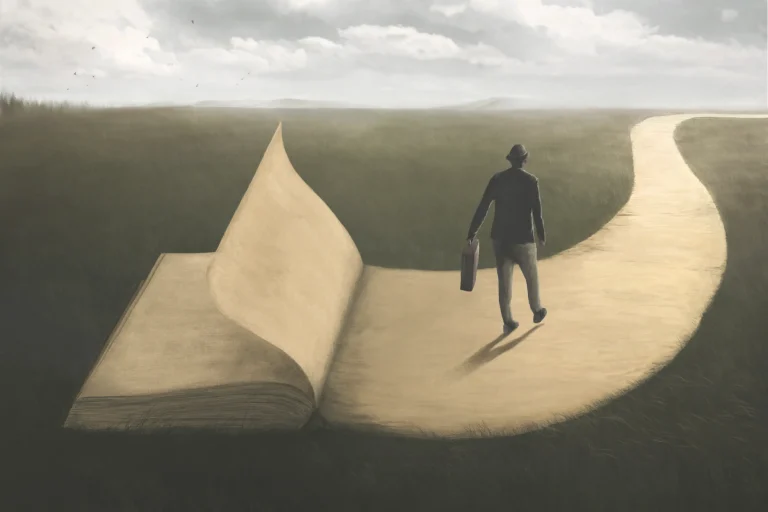
Interested in learning more?
Aralia Education is an innovative online education platform for ambitious middle and high school students worldwide. Aralia’s instructors propel students forward by helping them build a strong foundation in traditional academic courses. They also actively engage and guide students in exploring personal interests beyond their school curriculum. With this holistic approach, Aralia ensures its students are well-prepared for college and equipped for success in their future careers.
- College Accelerator Program
- Comprehensive Introduction to High School
- Academic Empowerment Program
- Test Preparation Bootcamp
- Private Lessons
- Student Awards
- Competitions
Give us a call: +1 (603) 932 7897
Email us: [email protected]
Add us on WhatsApp:

- How It Works
- Essay Examples
117 Great Persuasive Essay Topics for High School Level Students
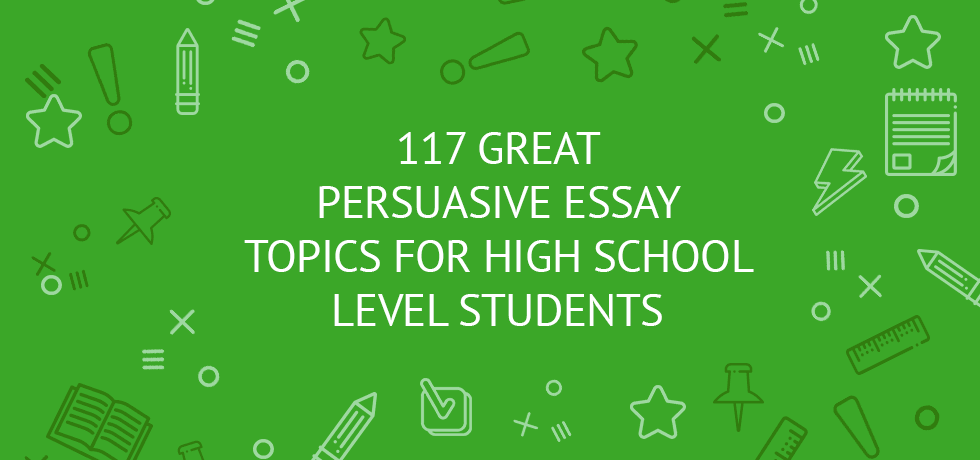
When working on any essay, the first thing you’ll have to figure out is your topic. In high school, you are supposed to pick the kind of topic you will be able to dig into — that is, you have to make sure you can find enough info on the subject. Sure, today it seems that getting your hands on any kind of information is simple and question how long is a thesis isn't on the table yet. Still, you have to remember that apart from being available, the info you discuss should be engaging. So, that’s something to think about.
Argumentative and persuasive essays are most commonly assigned to high school students. So, there are plenty of papers in public domains that are written in one of these styles — and you can take a look at those if you need some inspiration. When working on an argumentative paper, for example, a student is supposed to present two polar different opinions on the subject and present enough evidence to support each point of view. But simply discussing two sides of the argument is not enough — a writer should also come up with a comprehensible conclusion. The same goes for persuasive essays — after all, the student’s primary goal here is to persuade the reader in his/her point of view.
In fact, a lot of argumentative essays are actually persuasive papers. So, if you’ve written at least one of those, you'll know how to write the other one. If you haven’t, here is a tip for you: choose a topic you feel strongly about. This is the certain way to make sure you will have enough ideas for a truly engaging paper; and, since you feel strongly about the subject, it will be way easier to prove your point of view to the reader.
Another word of advice while choosing a persuasive essay topic is to pick something that would be neither too broad, nor too narrow. Remember that most high school papers are no longer than five pages (often, even shorter than that), so it’s best to choose just one question and focus on it in your work. Also, remember that you will have to provide some factual evidence for your opinion (after all, any academic paper should be supported by academically recognized sources), so do not go for subjects that are purely opinionated and do not have any chance of justification.
Now that we’ve highlighted how important choosing a persuasive topic is for a student, let’s give you some great topic ideas to get you started.
50 Simple Essay Topics for High School
- How can a person overcome fear?
- Describe a piece of art (book, painting, poem) that changed your life.
- Should students evaluate their teachers?
- Do standardized tests really reveal student knowledge?
- Should there be extra incentives for good grades at school?
- Should Gym classes be obligatory?
- Should we make our school calendar longer?
- Can a class size influence student performance?
- Should schools punish inappropriate student behavior?
- Is there a connection between real-life violence and video games?
- Should illegal immigrants’ children get an education?
- Is there a way to deal with bullies in schools?
- How reality TV is enforcing dangerous stereotypes
- Is pop culture encouraging students not to pursue education?
- White lies: what are they and should we really believe them to be innocent?
- Should violent video games be sold to minors?
- Using cell phones for education: the pros and cons
- Should we conceal our real identities on the web?
- Technology: distraction or a bonus?
- Educational apps: how helpful are they?
- Should everyone go for a college education?
- The role of affirmative action in the modern world
- College admission criteria: is there anything else apart from SAT?
- The skinny model stereotype and its pressure on average girls
- Do we really have equal rights for men and women?
- Why so few girls pursue careers in exact sciences?
- Stopping sexual abuse against young women
- Should sports bets be legalized?
- Can cheerleading be considered a sport?
- Homosexual rights for sportsmen
- The role of sports in our world
- Are sports in the US too commercialized?
- The benefits of local sports franchises
- Should colleges pay their baseball players?
- The debate of the naming rights
- How should we treat juvenile offenders?
- Pros and cons of death penalty
- Leadership and the moral obligations that come with it
- A cure against mass shootings
- Should we change our gun control policy?
- Is there too much digital censorship these days?
- Should rich people pay higher taxes?
- Government and the confidence we place in it
- Privacy Vs. Security: which one comes first?
- Should the US monitor its allies and citizens?
- Should students be able to pick their teachers?
- Is it reasonable to lower the voting age?
- How important is fashion?
- The appropriate dating age
- Can older generation learn from the new one?
50 Persuasive topic ideas for high school
- The pros and cons of allowing cell phones in schools
- Free state college attendance for the state residents
- The pros and cons of marijuana treatment
- Is death penalty justifiable for violent offenders?
- Should illegal immigrants be granted same rights as citizens?
- Airport security: do we really need that many screenings?
- Should we allow birth control for minors?
- Free condoms at schools: atrocity or necessity?
- Should schools separate gym grades from the grade list?
- Free wi-fi in the cities: pros and cons
- How often should teachers pass qualification tests?
- Universal wealthy: how reasonable it is in the US realia?
- Animal product testing: ethical vs. practical
- Civil unions: should the government recognize them?
- Is it reasonable to keep suspected terrorists under custody?
- Should students be allowed to bring their music players to school?
- Can we charge plus size citizens double ticket fair?
- Corporate lobbyists and political campaigns: is their support legal?
- Should school dedicate more attention to world religions?
- Introducing obligatory community service in schools
- Is it safe to keep exotic pets?
- Cellphones in the classroom: should the teachers have them?
- Violent crimes and minors: should the government treat them as adults?
- Should we legalize euthanasia?
- Should federal government control and restrict certain content on the Internet?
- Sexual education as an obligatory subject in high schools
- Should ESL students pass state tests in their native languages?
- Can digital devices replace traditional textbooks?
- Is it reasonable to test professional sportsmen for drugs?
- Should corporate advertising be allowed in schools?
- Can students and over be friends on social media?
- How ethical it is to use stem cells from aborted children for the research?
- Should the USA spend more time on internal affairs and less on overseas issues?
- Drunk driving: should we enforce stricter punishment?
- Is it ethical for a rape victim to go for an abortion?
- Driving without a seat-belt: should it be considered a crime?
- Is it necessary for high school sportsmen to take drug tests?
- Should schools increase their budgets by selling food and drinks to students?
- Is it ethical to advertise alcohol on TV?
- Should foreign goods be taxed higher than internal products?
- Free bus rides for seniors: do we need them?
- Should the government ban sports betting?
- Should the government lower the budget for schools that show weak results on SAT?
- Would it be reasonable to euthanize dogs that have shown aggressive behavior towards people?
- Should we introduce government censorship on certain online content?
- Should we lower the minimal working age to 14 years old?
- The pros and cons of wearing uniforms in schools
- Should we allow getting a driving permit starting the age of 21?
- Should schools introduce fast food in their menus?
- Should booster seats for children be made obligatory?
12 Controversial Topics for School
- Are there any moral grounds that can justify torture?
- Should we consider police cameras an invasion of our privacy?
- Should we ban tobacco once and for all?
- Is the access to condoms affecting teenage irresponsible behavior?
- Is the mankind really responsible for global warming?
- Is it reasonable to teach creationism in schools?
- How fair is our election process?
- Should fathers get a paternity leave just as mothers do?
- Are parents disrupting their children’s privacy by posting photos online?
- Is advertising to children ethical?
- Is average CEO salary justifiable?
- Should the army promote their programs to high school students?
Best Topics for high school that are interesting and fun to read
- The positive aspects of rivalry
- The matter of age in a relationship
- Is boredom is the surest way to trouble?
- Should we increase or lower the drinking age?
- Are the college tuition fees too high?
Those are some of the most interesting, opinionated essay topics for high school level. The biggest perk of the above examples is that most of them are based on a student’s opinion. At the same time, most of these topics presuppose some research — so any idea you’re proving will not be without confirmation. If you want to get more inspiration check out exploratory essay topics as well.
The final word of advice would be to pay your attention not only to the topic you choose but also to the way you present and organize your ideas. Do not forget that any essay should have an intro, main body and conclusion. The main body should be divided into a series of logically connected paragraphs, each presenting a certain point.
Finally, if you are to write and essay but have little knowledge or interest in the subject, do not forget that there are plenty of custom essay writers that will gladly do the job for you. Perhaps, the toughest thing to do when looking for an essay writing service or lab report example is determining which of them are reliable and which are not. But, with a little bit of time and patience (and attention to detail, of course), you will have no problem figuring out which service is worth a shot. A tip: these companies usually have a great number of positive customer reviews, are available through multiple support channels and have no problem sharing useful information for free.
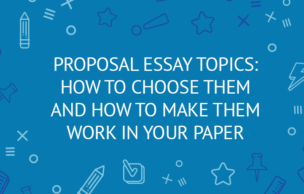
- How to Write Why This College Essay: Tips and Examples
- How To Write a Communication Essay
- How to Write an Argumentative Essay Introduction
- Why Is College So Expensive?
- MBA Essay Writing Tips


Choose Your Test
Sat / act prep online guides and tips, the 31 best books to read in high school.
Coursework/GPA
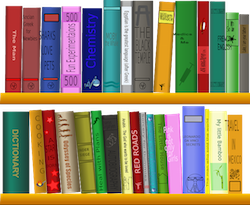
A huge number of books exist out there, ready and waiting for you to read them. Whether you prefer manga or ancient, epic poems, reading is great for all sorts of reasons .
What follows is a list of highly beneficial books to read in high school (or after!). These are remarkable books— books that made history, books that challenge societal perceptions of the world, and books that are quite simply interesting and moving. The books are presented in alphabetical order, and a short description is given for each book, as well an explanation of why it is worth reading.
Why Is Reading Important?
Why should you read these books? Why should you read at all for that matter? Reading is essential to communication, especially in an era of emails and texting. Beyond even that, though, reading has an array of crucial purposes. It will help improve your grades and test scores. You'll learn about other places, other times, and other cultures. You'll encounter issues you can relate to—issues that speak to you and challenge you to think and feel in new ways. You will grow, empathetically and intellectually. Plus, you'll understand more of the references that crop up all the time in pop culture.
Below are 31 books to read in high school that will help you prepare for college and beyond.
1984 (George Orwell)
This dystopian novel by George Orwell was written 35 years before the date referenced by the title. In this book, Orwell tells a story that warns readers about the possible consequences of complacency in the face of rising dictators (think Hitler and Stalin) and burgeoning technology ripe for misuse. He describes a world where everything is monitored, right down to citizens’ thoughts, and where any opposition to the ruling class is punishable by extreme measures. The oft-encountered quote, "Big Brother is watching," finds its origin in this novel.
The Adventures of Huckleberry Finn (Mark Twain)
This sequel to Mark Twain’s The Adventures of Tom Sawyer is much graver in nature than its predecessor. There are still plenty of good antics worthy of a laugh, but it concerns itself largely with a young boy’s attempt to escape severe family dysfunction and the moral implications of his taking an escaped slave as a companion on his adventure down the Mississippi River. Readers should be warned that the " n -word" is used liberally throughout the novel, which tends to be jarring to many a modern ear.
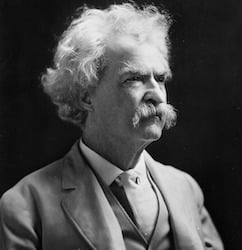
Mark Twain wants you to read his novel(s).
The Awakening (Kate Chopin)
Set in the Creole culture of the late 1800s, this novel by Kate Chopin details one woman’s process of becoming aware of herself. At the time, women were essentially property, and they were expected to act in demure and socially acceptable ways. As the protagonist "awakens" to her emotional and sexual needs, as well as the ultimate truth of her own independence , all sorts of problems ensue. The novel examines the balance between self-respect and selfishness.
The Bell Jar (Sylvia Plath)
This autobiographical novel by poet Sylvia Plath explores the deep, dark reality of mental illness. The protagonist, Esther, a stand-in for Plath herself, is a college student exploring her talents, interests, and sexuality as she descends into an unsettling spiral of mental instability. It is essential for students to understand the seriousness of mental illness as it is so earnestly portrayed in this book.
Black Rain (Masuji Ibuse)
Black Rain , by Masuji Ibuse, is about the very immediate, human consequences of the atom bombs dropped on Hiroshima and Nagasaki. It follows a small family of survivors, detailing what happened to them during the days of the bombing and what the effects are some years later. The book adopts a gentle, subtle tone, and yet it is not afraid to delve into very explicit and challenging topics related to the bombings.
Bless Me, Ultima (Rudolfo Anaya)
This semi-autobiographical novel by Rudolfo Anaya contains a healthy dose of magical realism and is considered a staple of Chicano literature. It combines Spanish, Mexican, and Native American influences, showing openly the ways in which these forces within the protagonist’s life come into conflict. Young Antonio is growing up in a world that leaves him with more questions than answers: major questions about life and death, good and evil, and so on. These issues seem too big for his six-year-old mind, and yet he grapples with them valiantly through the end of the novel.

Antonio has lots of questions surrounding his faith traditions.
Brave New World (Aldous Huxley)
In Brave New World , Aldous Huxley explores themes similar to those found in Orwell’s 1984 . Huxley wrote this novel earlier than Orwell wrote his, and yet both deal with dystopian concepts. In particular, Huxley balances utopian and dystopian interpretations of a world that is highly controlled, easily manipulated, and extremely dysfunctional, ready to fall apart at any provocation. There are insiders of and outsiders to this world, and each character views and interacts with the society in a different light.
Bury My Heart at Wounded Knee (Dee Brown)
Dee Brown covers a lot of historical ground in this book. In it, Brown describes the history of European Americans as they interact with (and slaughter) the Native Americans who already inhabit what they claim as their country. It’s an infuriating and accurate tale of mistreatments and abuses, as well as the unfortunate decline of a noble people trying to defend their established way of life. It’s essential for students to understand this part of United States history.
The Catcher in the Rye (J. D. Salinger)
This bold and controversial novel by J. D. Salinger centers around ideas including adolescent sexuality and relationships. The protagonist is constantly bouncing around from person to person, place to place, activity to activity. Critics were greatly offended by Salinger’s frank discussions of sexual matters and his generally very casual style. This book is an important read in part because of its direct relevance to struggling adolescents and the issues they face.
The Crucible (Arthur Miller)
Arthur Miller wrote this tragic play in the early 1950s. While it is somewhat loosely based on the Salem witch trials of 1692, and while it is likely intended as an allegory to McCarthy’s rooting out of suspected Communists at the time of the play’s writing, the issues it touches on are much more broadly applicable. This is an important dramatic work on how hysteria, cruelty, and ignorant gullibility destroy communities.
Bonus: Studying The Crucible for school and struggling? Check out our The Crucible study guides here !

There are lots of accusations of creepy stuff in The Crucible.
The Diary of a Young Girl (Anne Frank)
Anne Frank’s published diary is different from a typical literary work. It’s a true account of the life of one Jewish girl during the Holocaust, and, while Anne Frank wrote some passages with publication in mind, others she did not. When the book was first published, many passages that her father, Otto Frank, found too long, unflattering, or inappropriate were excluded. Today, the book is available with all material included. Gaining some understanding of this horrific genocide is crucial to students.
Fahrenheit 451 (Ray Bradbury)
Books are on trial in this astounding work by Ray Bradbury. Set in yet another dystopian future where firemen are employed to burn books and the houses that contain them, Fahrenheit 451 tells the story of a fireman who begins to wonder what books have to offer. This novel is an ode to literacy, and, while it has its tragic moments, it ultimately leaves readers with a message of hope.
Flowers for Algernon (Daniel Keyes)
Daniel Keyes writes a very warm and human form of science fiction in Flowers for Algernon . The novel tells the story of a man considered mentally retarded who is selected for an intelligence-enhancing surgery. The book follows the effects, both positive and negative, that come from the sudden change in his I.Q. This is a moving read for students who wish to understand how intelligence plays into our humanity.
For Colored Girls Who Have Considered Suicide When the Rainbow is Enuf (Ntozake Shange)
In For Colored Girls… , Ntozake Shange creates choreopoetry (poetry meant to be performed with movement and dance) that covers important themes of race, gender, abuse, and perseverance. It’s largely a deep and dark poem, but it contains a message of hope. This is an awesome opportunity for readers to get exposure to poetry in a very relevant and theatrical form.
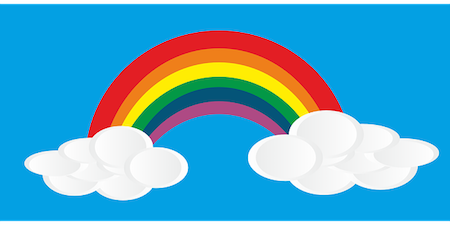
The rainbow contains all sorts of symbolism.
Frankenstein (Mary Shelley)
First off, let’s all be clear: as some will already know, Frankenstein is not a monster. Rather, the very human Victor Frankenstein is responsible for creating what we recognize as the monster from the story; the creature itself is nameless. Mary Shelley wrote this Gothic thriller in the early 1800s, and yet we remain fascinated by this tale of playing God and facing the consequences. It’s an eerie tale with themes that run deep.
The Grapes of Wrath (John Steinbeck)
John Steinbeck’s masterful The Grapes of Wrath centers around the Great Depression and the Dust Bowl in American history. It’s a story of hope and despair, moving from one to the other and back again seamlessly throughout the novel. While loaded with biblical allusions, it is not heavy-handed with them, and the writing is often praised as realistic and beautiful.
Great Expectations (Charles Dickens)
Great Expectations , by Charles Dickens, is a staple of English literature. It’s one of his most autobiographical works; it tells the story of a young boy, orphaned and poor, who ultimately experiences a drastic change in his fortunes. In addition, he learns much about love, trust, and relationships in this coming-of-age novel. As the title suggests, the novel also contains discussions of hope, disappointment, and expectations.
The Great Gatbsy (F. Scott Fitzgerald)
F. Scott Fitzgerald wrote in The Great Gatsby a novel that in many ways closely reflected his own experience. The decadence of the Jazz Age was, as is revealed in the novel, both enticing for many and revolting for some. The Great Gatsby follows the quest of a wealthy young man to win back the love of his life by extravagant displays of riches and social connections. As the plot builds to its climax, readers, along with Gatsby's simpler, humbler friend and neighbor, are left to ponder the passing of an era in American history.
BONUS: Reading The Great Gatsby for school but finding it hard to keep track of all the characters? We have several study guides that might be able to help, including our guide to all the characters in The Great Gatsby .
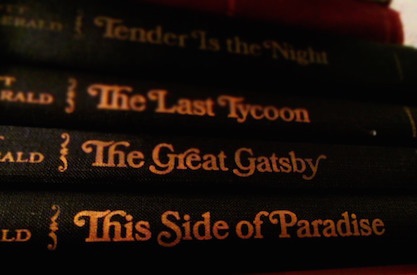
The Joy Luck Club (Amy Tan)
Amy Tan’s novel, The Joy Luck Club , deals with intergenerational and intercultural questions. Tan seeks to represent the Chinese-American experience while also representing issues of mother-daughter relationships and the passage of time. The book focuses on four mother and four daughters across four sections of the novel for a total of sixteen stories that come together to complete this total work.
Lord of the Flies (William Golding)
William Golding’s Lord of the Flies speaks to the evil and degenerate potential that lurks within each human. It can be interpreted religiously, politically, psychoanalytically, or any number of other ways, but the basic premise is that a group of schoolboys stranded on an island descend into grotesque savagery. It’s a disturbing story, to be sure, but one that is important to be familiar with in a world where savage instinct too often presents itself today.
The Lord of the Rings and The Hobbit (J. R. R. Tolkien)
As with any work, The Lord of the Rings and The Hobbit are not everyone’s cup of tea, but they’re hugely rewarding pleasure reading for too many fans to count. Tolkien’s masterpieces are more than just pleasure reading, though; the trilogy covers major themes of the epic struggle between good and evil, the necessity of persevering through immensely difficult ordeals, and how to apply mercy. Tolkien asks major questions about those who are evil versus those who are misguided and what we should do when our paths intertwine with any such individuals. The Hobbit is lighter and more kid-focused, but still addresses important themes.
The Odyssey (Homer)
The Odyssey is an epic poem nearly three thousand years old that’s attributed to the blind poet Homer. It tells the story of a war hero’s ten-year quest to return to his home, wife, and son. He encounters a number of varied setbacks along the way, and the trouble isn’t over when he gets home. The Odyssey deals with human interactions with the gods, bringing up questions of righteousness, wrongdoing, and pride as well as ideas of faithfulness and patience.
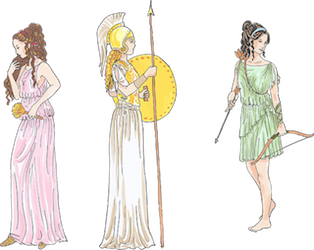
Oedipus Rex (Sophocles)
This play by Greek dramatist Sophocles is about a man who inadvertently kills his father and marries his mother. It’s dark subject matter, and nothing good comes of it, as you may well suspect. This another example, as in The Odyssey , of the divine tinkering with human lives and the great sin of pride.
One Flew Over the Cuckoo's Nest (Ken Kesey)
Ken Kesey documents in this work the darkest side of mental health care as it existed in the 1960s. While certainly not all mental health care was like what’s described in the book, nor is it all like that today, audiences of the novel are aghast that any care might even vaguely resemble the horrors discussed. Despite how disturbing the storyline is, it’s important for readers to recognize the vulnerability of this too often overlooked segment of society.
Pride and Prejudice (Jane Austen)
Jane Austen’s Pride and Prejudice follows a family with five daughters, all unwed, and all, due to English customs of the late 1700s and early 1800s, in need of wedding. Of the five daughters, Elizabeth is the focus of the novel, though the others are discussed aplenty. While marriage is one of the central ideas in the novel, there are plenty of other themes to be picked apart, including ones that touch on pride, prejudice, first impressions, love, misunderstanding, and manipulation. This is, all around, a classic piece of literature, and one with which to be familiar.

Next up: one of my favorites, William Shakespeare.
Romeo and Juliet or Hamlet (William Shakespeare)
William Shakespeare’s Romeo and Juliet is familiar to most people on some level: two teenagers from feuding families fall in love and ultimately sacrifice their lives to their passion. Of all of Shakespeare’s works, it's a particularly popular one to read in high school for a variety of reasons. For one thing, it deals explicitly with teenaged love, and, for another, it’s a relatively simple plot that’s nonetheless action-packed. It also opens with a shameless series of very witty dirty jokes, and such humor is scattered throughout the rest of the show. Then there’s the thematic material, which includes obedience, fate, and rash decisions, among others.
For those who don’t wish to read about teenagers mooning for each other to the point of suicide, there’s always Hamlet . This story follows a Danish prince whose father has died and whose mother has almost instantly married the father’s brother. When Hamlet discovers, via an appearance of his father’s ghost, that his uncle murdered his father, all sorts of interesting events ensue. There’s madness (real and feigned), murder, suicide, treason, and a lot of waffling over the right course of action.
As an added bonus, those who read Hamlet may wish to read Tom Stoppard’s Rosencrantz and Guildenstern Are Dead . It follows the events of Hamlet from the perspective of two minor and typically much-maligned characters. It’s also hilarious, if absolutely weird.
Slaughterhouse-Five (Kurt Vonnegut)
Slaughterhouse-Five is a fictional account of events in some ways very similar to what the author himself experienced as a prisoner of war in WWII. He writes about the atrocities humans commit upon each other, and he also mixes in a number of other concerns, some heavy, some light, such as death, aliens, and the ability to see other points in time, past or future.
Their Eyes Were Watching God (Zora Neale Hurston)
The novel Their Eyes Were Watching God by Zora Neale Hurston has been much criticized over the course of its history, and yet it stands as one of the great classics of American literature. It tells the story of a black woman who is full of zest and passion and who is passed from man to man as she goes through life. With her first husband, she is absolutely miserable; with her second husband, it’s more bearable, for a time; and with her third man, she finds happiness. The trials and tribulations she undergoes with all three make for an interesting examination of what it takes for Janie to free the strong, confident woman within.

(Not an actual representation of Janie. Same approach to life, though.)
Things Fall Apart (Chinua Achebe)
In Chinua Achebe’s Things Fall Apart , readers encounter a complex and beautifully rendered examination of life with the Igbo tribe in Africa, both before and after the white man’s interference. Okonkwo is the protagonist, and he goes through a number of difficulties that put him in the position of making distasteful decisions. Readers are left to wonder whether things are falling apart because that’s simply the way of the world or whether different decisions could have kept them together. The inevitability of change is neatly demonstrated.
To Kill A Mockingbird (Harper Lee)
Harper Lee’s To Kill a Mockingbird deals with elements of racism, courage, sympathy, understanding, and hope. It tells the story of a small town where a black man has been falsely accused of raping a white woman. The daughter of the lawyer defending the accused is the main protagonist, and another aspect of the story is her journey from bemused mockery to gentle understanding with regard to an eccentric man in the town. To Kill a Mockingbird rose to prominence during the Civil Rights Movement and remains as potent today as it ever was.
The Ugly American (Eugene Burdick and William Lederer)
The Ugly American by Burdick and Lederer is a denouncement of the American practice of sending insensitive diplomatic figures into foreign countries. Through a series of vignettes, it demonstrates American inefficiency overseas. It so impressed John F. Kennedy while he was a Democratic senator that he sent a copy to each and every one of his Senate colleagues. It can be an uncomfortable read, but a worthwhile one.
If you can read through these 30-odd books before you graduate high school, you'll be in a good shape, from a literary perspective.
Even if you can't read all of them, picking a few would not be a bad place to start. You might start with those that simply sound the most interesting to you, or you could look for themes in the books that relate to what you're learning in school. If you're studying McCarthyism, for instance, maybe try The Crucible ; if you're studying the Holocaust, maybe try The Diary of a Young Girl .
These stories are immensely powerful. Some are newer, having instantly won their place in the pantheon of classics, while others have proven themselves by withstanding the test of time.
Readers will find that they resonate with some books more than others, and that's fine; the point is that all of these books have important messages to communicate, and I encourage readers to be open to finding out what those messages are.
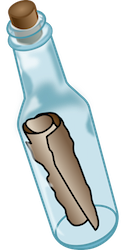
Open a book, and you'll find all sorts of messages! Usually not in bottles, though.

What's Next?
A lot of these books may be read or referenced in AP English Lit classes. Check out our guide to AP Literature for tips on preparing for the exam. If you're not sure whether to take AP English Language or AP English Literature, allow us to provide you with some thoughts on the topic .
While we're on the topic of literature, why don't you take a moment to read some recommendations on which English classes you should take during your high school career?
Are you both a reader and interested in becoming a doctor ? Then you should definitely take a look at our list of books to read as a pre-med student .
And as a reminder, if you decide to read The Great Gatsby or The Crucible , you can check out our analyses of each to help you along the way!

Thinking ahead to college applications?
If you’re a freshman, sophomore, or junior worried about college admissions, our world-class admissions counselors can help. We know exactly what kinds of students colleges want to admit and can make sure your profile shines.
PrepScholar Admissions is the world's best admissions consulting service. We've helped thousands of students get into their top choice schools , from state colleges to the Ivy League.
Join our mentoring program today:

Vero is a firsthand expert at standardized testing and the college application process. Though neither parent had graduated high school, and test prep was out of the question, she scored in the 99th percentile on both the SAT and ACT, taking each test only once. She attended Dartmouth, graduating as salutatorian of 2013. She later worked as a professional tutor. She has a great passion for the arts, especially theater.
Student and Parent Forum
Our new student and parent forum, at ExpertHub.PrepScholar.com , allow you to interact with your peers and the PrepScholar staff. See how other students and parents are navigating high school, college, and the college admissions process. Ask questions; get answers.

Ask a Question Below
Have any questions about this article or other topics? Ask below and we'll reply!
Improve With Our Famous Guides
- For All Students
The 5 Strategies You Must Be Using to Improve 160+ SAT Points
How to Get a Perfect 1600, by a Perfect Scorer
Series: How to Get 800 on Each SAT Section:
Score 800 on SAT Math
Score 800 on SAT Reading
Score 800 on SAT Writing
Series: How to Get to 600 on Each SAT Section:
Score 600 on SAT Math
Score 600 on SAT Reading
Score 600 on SAT Writing
Free Complete Official SAT Practice Tests
What SAT Target Score Should You Be Aiming For?
15 Strategies to Improve Your SAT Essay
The 5 Strategies You Must Be Using to Improve 4+ ACT Points
How to Get a Perfect 36 ACT, by a Perfect Scorer
Series: How to Get 36 on Each ACT Section:
36 on ACT English
36 on ACT Math
36 on ACT Reading
36 on ACT Science
Series: How to Get to 24 on Each ACT Section:
24 on ACT English
24 on ACT Math
24 on ACT Reading
24 on ACT Science
What ACT target score should you be aiming for?
ACT Vocabulary You Must Know
ACT Writing: 15 Tips to Raise Your Essay Score
How to Get Into Harvard and the Ivy League
How to Get a Perfect 4.0 GPA
How to Write an Amazing College Essay
What Exactly Are Colleges Looking For?
Is the ACT easier than the SAT? A Comprehensive Guide
Should you retake your SAT or ACT?
When should you take the SAT or ACT?
Stay Informed
Get the latest articles and test prep tips!
Looking for Graduate School Test Prep?
Check out our top-rated graduate blogs here:
GRE Online Prep Blog
GMAT Online Prep Blog
TOEFL Online Prep Blog
Holly R. "I am absolutely overjoyed and cannot thank you enough for helping me!”
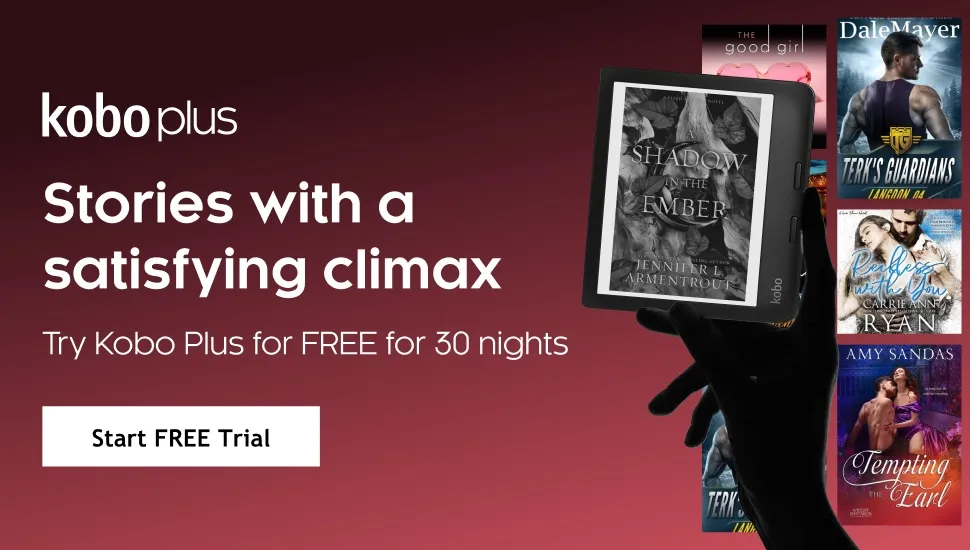
50 Must-Read Contemporary Essay Collections
Liberty Hardy
Liberty Hardy is an unrepentant velocireader, writer, bitey mad lady, and tattoo canvas. Turn-ons include books, books and books. Her favorite exclamation is “Holy cats!” Liberty reads more than should be legal, sleeps very little, frequently writes on her belly with Sharpie markers, and when she dies, she’s leaving her body to library science. Until then, she lives with her three cats, Millay, Farrokh, and Zevon, in Maine. She is also right behind you. Just kidding! She’s too busy reading. Twitter: @MissLiberty
View All posts by Liberty Hardy
I feel like essay collections don’t get enough credit. They’re so wonderful! They’re like short story collections, but TRUE. It’s like going to a truth buffet. You can get information about sooooo many topics, sometimes in one single book! To prove that there are a zillion amazing essay collections out there, I compiled 50 great contemporary essay collections, just from the last 18 months alone. Ranging in topics from food, nature, politics, sex, celebrity, and more, there is something here for everyone!
I’ve included a brief description from the publisher with each title. Tell us in the comments about which of these you’ve read or other contemporary essay collections that you love. There are a LOT of them. Yay, books!
Must-Read Contemporary Essay Collections
They can’t kill us until they kill us by hanif abdurraqib.
“In an age of confusion, fear, and loss, Hanif Willis-Abdurraqib’s is a voice that matters. Whether he’s attending a Bruce Springsteen concert the day after visiting Michael Brown’s grave, or discussing public displays of affection at a Carly Rae Jepsen show, he writes with a poignancy and magnetism that resonates profoundly.”
Would Everybody Please Stop?: Reflections on Life and Other Bad Ideas by Jenny Allen
“Jenny Allen’s musings range fluidly from the personal to the philosophical. She writes with the familiarity of someone telling a dinner party anecdote, forgoing decorum for candor and comedy. To read Would Everybody Please Stop? is to experience life with imaginative and incisive humor.”
Longthroat Memoirs: Soups, Sex and Nigerian Taste Buds by Yemisi Aribisala
“A sumptuous menu of essays about Nigerian cuisine, lovingly presented by the nation’s top epicurean writer. As well as a mouth-watering appraisal of Nigerian food, Longthroat Memoirs is a series of love letters to the Nigerian palate. From the cultural history of soup, to fish as aphrodisiac and the sensual allure of snails, Longthroat Memoirs explores the complexities, the meticulousness, and the tactile joy of Nigerian gastronomy.”
Beyond Measure: Essays by Rachel Z. Arndt
“ Beyond Measure is a fascinating exploration of the rituals, routines, metrics and expectations through which we attempt to quantify and ascribe value to our lives. With mordant humor and penetrating intellect, Arndt casts her gaze beyond event-driven narratives to the machinery underlying them: judo competitions measured in weigh-ins and wait times; the significance of the elliptical’s stationary churn; the rote scripts of dating apps; the stupefying sameness of the daily commute.”
Magic Hours by Tom Bissell
“Award-winning essayist Tom Bissell explores the highs and lows of the creative process. He takes us from the set of The Big Bang Theory to the first novel of Ernest Hemingway to the final work of David Foster Wallace; from the films of Werner Herzog to the film of Tommy Wiseau to the editorial meeting in which Paula Fox’s work was relaunched into the world. Originally published in magazines such as The Believer , The New Yorker , and Harper’s , these essays represent ten years of Bissell’s best writing on every aspect of creation—be it Iraq War documentaries or video-game character voices—and will provoke as much thought as they do laughter.”
Dead Girls: Essays on Surviving an American Obsession by Alice Bolin
“In this poignant collection, Alice Bolin examines iconic American works from the essays of Joan Didion and James Baldwin to Twin Peaks , Britney Spears, and Serial , illuminating the widespread obsession with women who are abused, killed, and disenfranchised, and whose bodies (dead and alive) are used as props to bolster men’s stories. Smart and accessible, thoughtful and heartfelt, Bolin investigates the implications of our cultural fixations, and her own role as a consumer and creator.”
Betwixt-and-Between: Essays on the Writing Life by Jenny Boully
“Jenny Boully’s essays are ripe with romance and sensual pleasures, drawing connections between the digression, reflection, imagination, and experience that characterizes falling in love as well as the life of a writer. Literary theory, philosophy, and linguistics rub up against memory, dreamscapes, and fancy, making the practice of writing a metaphor for the illusory nature of experience. Betwixt and Between is, in many ways, simply a book about how to live.”
Wedding Toasts I’ll Never Give by Ada Calhoun
“In Wedding Toasts I’ll Never Give , Ada Calhoun presents an unflinching but also loving portrait of her own marriage, opening a long-overdue conversation about the institution as it truly is: not the happy ending of a love story or a relic doomed by high divorce rates, but the beginning of a challenging new chapter of which ‘the first twenty years are the hardest.'”
How to Write an Autobiographical Novel: Essays by Alexander Chee
“ How to Write an Autobiographical Novel is the author’s manifesto on the entangling of life, literature, and politics, and how the lessons learned from a life spent reading and writing fiction have changed him. In these essays, he grows from student to teacher, reader to writer, and reckons with his identities as a son, a gay man, a Korean American, an artist, an activist, a lover, and a friend. He examines some of the most formative experiences of his life and the nation’s history, including his father’s death, the AIDS crisis, 9/11, the jobs that supported his writing—Tarot-reading, bookselling, cater-waiting for William F. Buckley—the writing of his first novel, Edinburgh , and the election of Donald Trump.”
Too Much and Not the Mood: Essays by Durga Chew-Bose
“ Too Much and Not the Mood is a beautiful and surprising exploration of what it means to be a first-generation, creative young woman working today. On April 11, 1931, Virginia Woolf ended her entry in A Writer’s Diary with the words ‘too much and not the mood’ to describe her frustration with placating her readers, what she described as the ‘cramming in and the cutting out.’ She wondered if she had anything at all that was truly worth saying. The attitude of that sentiment inspired Durga Chew-Bose to gather own writing in this lyrical collection of poetic essays that examine personhood and artistic growth. Drawing inspiration from a diverse group of incisive and inquiring female authors, Chew-Bose captures the inner restlessness that keeps her always on the brink of creative expression.”
We Were Eight Years in Power: An American Tragedy by Ta-Nehisi Coates
“‘We were eight years in power’ was the lament of Reconstruction-era black politicians as the American experiment in multiracial democracy ended with the return of white supremacist rule in the South. In this sweeping collection of new and selected essays, Ta-Nehisi Coates explores the tragic echoes of that history in our own time: the unprecedented election of a black president followed by a vicious backlash that fueled the election of the man Coates argues is America’s ‘first white president.'”
Look Alive Out There: Essays by Sloane Crosley
“In Look Alive Out There, whether it’s scaling active volcanoes, crashing shivas, playing herself on Gossip Girl, befriending swingers, or squinting down the barrel of the fertility gun, Crosley continues to rise to the occasion with unmatchable nerve and electric one-liners. And as her subjects become more serious, her essays deliver not just laughs but lasting emotional heft and insight. Crosley has taken up the gauntlets thrown by her predecessors—Dorothy Parker, Nora Ephron, David Sedaris—and crafted something rare, affecting, and true.”
Fl â neuse: Women Walk the City in Paris, New York, Tokyo, Venice, and London by Lauren Elkin
“Part cultural meander, part memoir, Flâneuse takes us on a distinctly cosmopolitan jaunt that begins in New York, where Elkin grew up, and transports us to Paris via Venice, Tokyo, and London, all cities in which she’s lived. We are shown the paths beaten by such flâneuses as the cross-dressing nineteenth-century novelist George Sand, the Parisian artist Sophie Calle, the wartime correspondent Martha Gellhorn, and the writer Jean Rhys. With tenacity and insight, Elkin creates a mosaic of what urban settings have meant to women, charting through literature, art, history, and film the sometimes exhilarating, sometimes fraught relationship that women have with the metropolis.”
Idiophone by Amy Fusselman
“Leaping from ballet to quiltmaking, from the The Nutcracker to an Annie-B Parson interview, Idiophone is a strikingly original meditation on risk-taking and provocation in art and a unabashedly honest, funny, and intimate consideration of art-making in the context of motherhood, and motherhood in the context of addiction. Amy Fusselman’s compact, beautifully digressive essay feels both surprising and effortless, fueled by broad-ranging curiosity, and, fundamentally, joy.”
Not That Bad: Dispatches from Rape Culture by Roxane Gay
“In this valuable and revealing anthology, cultural critic and bestselling author Roxane Gay collects original and previously published pieces that address what it means to live in a world where women have to measure the harassment, violence, and aggression they face, and where they are ‘routinely second-guessed, blown off, discredited, denigrated, besmirched, belittled, patronized, mocked, shamed, gaslit, insulted, bullied’ for speaking out.”
Sunshine State: Essays by Sarah Gerard
“With the personal insight of The Empathy Exams , the societal exposal of Nickel and Dimed , and the stylistic innovation and intensity of her own break-out debut novel Binary Star , Sarah Gerard’s Sunshine State uses the intimately personal to unearth the deep reservoirs of humanity buried in the corners of our world often hardest to face.”
The Art of the Wasted Day by Patricia Hampl
“ The Art of the Wasted Day is a picaresque travelogue of leisure written from a lifelong enchantment with solitude. Patricia Hampl visits the homes of historic exemplars of ease who made repose a goal, even an art form. She begins with two celebrated eighteenth-century Irish ladies who ran off to live a life of ‘retirement’ in rural Wales. Her search then leads to Moravia to consider the monk-geneticist, Gregor Mendel, and finally to Bordeaux for Michel Montaigne—the hero of this book—who retreated from court life to sit in his chateau tower and write about whatever passed through his mind, thus inventing the personal essay.”
A Really Big Lunch: The Roving Gourmand on Food and Life by Jim Harrison
“Jim Harrison’s legendary gourmandise is on full display in A Really Big Lunch . From the titular New Yorker piece about a French lunch that went to thirty-seven courses, to pieces from Brick , Playboy , Kermit Lynch Newsletter, and more on the relationship between hunter and prey, or the obscure language of wine reviews, A Really Big Lunch is shot through with Harrison’s pointed aperçus and keen delight in the pleasures of the senses. And between the lines the pieces give glimpses of Harrison’s life over the last three decades. A Really Big Lunch is a literary delight that will satisfy every appetite.”
Insomniac City: New York, Oliver, and Me by Bill Hayes
“Bill Hayes came to New York City in 2009 with a one-way ticket and only the vaguest idea of how he would get by. But, at forty-eight years old, having spent decades in San Francisco, he craved change. Grieving over the death of his partner, he quickly discovered the profound consolations of the city’s incessant rhythms, the sight of the Empire State Building against the night sky, and New Yorkers themselves, kindred souls that Hayes, a lifelong insomniac, encountered on late-night strolls with his camera.”
Would You Rather?: A Memoir of Growing Up and Coming Out by Katie Heaney
“Here, for the first time, Katie opens up about realizing at the age of twenty-eight that she is gay. In these poignant, funny essays, she wrestles with her shifting sexuality and identity, and describes what it was like coming out to everyone she knows (and everyone she doesn’t). As she revisits her past, looking for any ‘clues’ that might have predicted this outcome, Katie reveals that life doesn’t always move directly from point A to point B—no matter how much we would like it to.”
Tonight I’m Someone Else: Essays by Chelsea Hodson
“From graffiti gangs and Grand Theft Auto to sugar daddies, Schopenhauer, and a deadly game of Russian roulette, in these essays, Chelsea Hodson probes her own desires to examine where the physical and the proprietary collide. She asks what our privacy, our intimacy, and our own bodies are worth in the increasingly digital world of liking, linking, and sharing.”
We Are Never Meeting in Real Life.: Essays by Samantha Irby
“With We Are Never Meeting in Real Life. , ‘bitches gotta eat’ blogger and comedian Samantha Irby turns the serio-comic essay into an art form. Whether talking about how her difficult childhood has led to a problem in making ‘adult’ budgets, explaining why she should be the new Bachelorette—she’s ’35-ish, but could easily pass for 60-something’—detailing a disastrous pilgrimage-slash-romantic-vacation to Nashville to scatter her estranged father’s ashes, sharing awkward sexual encounters, or dispensing advice on how to navigate friendships with former drinking buddies who are now suburban moms—hang in there for the Costco loot—she’s as deft at poking fun at the ghosts of her past self as she is at capturing powerful emotional truths.”
This Will Be My Undoing: Living at the Intersection of Black, Female, and Feminist in (White) America by Morgan Jerkins
“Doubly disenfranchised by race and gender, often deprived of a place within the mostly white mainstream feminist movement, black women are objectified, silenced, and marginalized with devastating consequences, in ways both obvious and subtle, that are rarely acknowledged in our country’s larger discussion about inequality. In This Will Be My Undoing , Jerkins becomes both narrator and subject to expose the social, cultural, and historical story of black female oppression that influences the black community as well as the white, male-dominated world at large.”
Everywhere Home: A Life in Essays by Fenton Johnson
“Part retrospective, part memoir, Fenton Johnson’s collection Everywhere Home: A Life in Essays explores sexuality, religion, geography, the AIDS crisis, and more. Johnson’s wanderings take him from the hills of Kentucky to those of San Francisco, from the streets of Paris to the sidewalks of Calcutta. Along the way, he investigates questions large and small: What’s the relationship between artists and museums, illuminated in a New Guinean display of shrunken heads? What’s the difference between empiricism and intuition?”
One Day We’ll All Be Dead and None of This Will Matter: Essays by Scaachi Koul
“In One Day We’ll All Be Dead and None of This Will Matter , Scaachi Koul deploys her razor-sharp humor to share all the fears, outrages, and mortifying moments of her life. She learned from an early age what made her miserable, and for Scaachi anything can be cause for despair. Whether it’s a shopping trip gone awry; enduring awkward conversations with her bikini waxer; overcoming her fear of flying while vacationing halfway around the world; dealing with Internet trolls, or navigating the fears and anxieties of her parents. Alongside these personal stories are pointed observations about life as a woman of color: where every aspect of her appearance is open for critique, derision, or outright scorn; where strict gender rules bind in both Western and Indian cultures, leaving little room for a woman not solely focused on marriage and children to have a career (and a life) for herself.”
Tell Me How It Ends: An Essay in 40 Questions by Valeria Luiselli and jon lee anderson (translator)
“A damning confrontation between the American dream and the reality of undocumented children seeking a new life in the U.S. Structured around the 40 questions Luiselli translates and asks undocumented Latin American children facing deportation, Tell Me How It Ends (an expansion of her 2016 Freeman’s essay of the same name) humanizes these young migrants and highlights the contradiction between the idea of America as a fiction for immigrants and the reality of racism and fear—both here and back home.”
All the Lives I Want: Essays About My Best Friends Who Happen to Be Famous Strangers by Alana Massey
“Mixing Didion’s affected cool with moments of giddy celebrity worship, Massey examines the lives of the women who reflect our greatest aspirations and darkest fears back onto us. These essays are personal without being confessional and clever in a way that invites readers into the joke. A cultural critique and a finely wrought fan letter, interwoven with stories that are achingly personal, All the Lives I Want is also an exploration of mental illness, the sex industry, and the dangers of loving too hard.”
Typewriters, Bombs, Jellyfish: Essays by Tom McCarthy
“Certain points of reference recur with dreamlike insistence—among them the artist Ed Ruscha’s Royal Road Test , a photographic documentation of the roadside debris of a Royal typewriter hurled from the window of a traveling car; the great blooms of jellyfish that are filling the oceans and gumming up the machinery of commerce and military domination—and the question throughout is: How can art explode the restraining conventions of so-called realism, whether aesthetic or political, to engage in the active reinvention of the world?”
Nasty Women: Feminism, Resistance, and Revolution in Trump’s America by Samhita Mukhopadhyay and Kate Harding
“When 53 percent of white women voted for Donald Trump and 94 percent of black women voted for Hillary Clinton, how can women unite in Trump’s America? Nasty Women includes inspiring essays from a diverse group of talented women writers who seek to provide a broad look at how we got here and what we need to do to move forward.”
Don’t Call Me Princess: Essays on Girls, Women, Sex, and Life by Peggy Orenstein
“Named one of the ’40 women who changed the media business in the last 40 years’ by Columbia Journalism Review , Peggy Orenstein is one of the most prominent, unflinching feminist voices of our time. Her writing has broken ground and broken silences on topics as wide-ranging as miscarriage, motherhood, breast cancer, princess culture and the importance of girls’ sexual pleasure. Her unique blend of investigative reporting, personal revelation and unexpected humor has made her books bestselling classics.”
When You Find Out the World Is Against You: And Other Funny Memories About Awful Moments by Kelly Oxford
“Kelly Oxford likes to blow up the internet. Whether it is with the kind of Tweets that lead Rolling Stone to name her one of the Funniest People on Twitter or with pictures of her hilariously adorable family (human and animal) or with something much more serious, like creating the hashtag #NotOkay, where millions of women came together to share their stories of sexual assault, Kelly has a unique, razor-sharp perspective on modern life. As a screen writer, professional sh*t disturber, wife and mother of three, Kelly is about everything but the status quo.”
Too Fat, Too Slutty, Too Loud: The Rise and Reign of the Unruly Woman by Anne Helen Petersen
“You know the type: the woman who won’t shut up, who’s too brazen, too opinionated—too much. She’s the unruly woman, and she embodies one of the most provocative and powerful forms of womanhood today. In Too Fat, Too Slutty, Too Loud , Anne Helen Petersen uses the lens of ‘unruliness’ to explore the ascension of pop culture powerhouses like Lena Dunham, Nicki Minaj, and Kim Kardashian, exploring why the public loves to love (and hate) these controversial figures. With its brisk, incisive analysis, Too Fat, Too Slutty, Too Loud will be a conversation-starting book on what makes and breaks celebrity today.”
Well, That Escalated Quickly: Memoirs and Mistakes of an Accidental Activist by Franchesca Ramsey
“In her first book, Ramsey uses her own experiences as an accidental activist to explore the many ways we communicate with each other—from the highs of bridging gaps and making connections to the many pitfalls that accompany talking about race, power, sexuality, and gender in an unpredictable public space…the internet.”
Shrewed: A Wry and Closely Observed Look at the Lives of Women and Girls by Elizabeth Renzetti
“Drawing upon Renzetti’s decades of reporting on feminist issues, Shrewed is a book about feminism’s crossroads. From Hillary Clinton’s failed campaign to the quest for equal pay, from the lessons we can learn from old ladies to the future of feminism in a turbulent world, Renzetti takes a pointed, witty look at how far we’ve come—and how far we have to go.”
What Are We Doing Here?: Essays by Marilynne Robinson
“In this new essay collection she trains her incisive mind on our modern political climate and the mysteries of faith. Whether she is investigating how the work of great thinkers about America like Emerson and Tocqueville inform our political consciousness or discussing the way that beauty informs and disciplines daily life, Robinson’s peerless prose and boundless humanity are on full display.”
Double Bind: Women on Ambition by Robin Romm
“‘A work of courage and ferocious honesty’ (Diana Abu-Jaber), Double Bind could not come at a more urgent time. Even as major figures from Gloria Steinem to Beyoncé embrace the word ‘feminism,’ the word ‘ambition’ remains loaded with ambivalence. Many women see it as synonymous with strident or aggressive, yet most feel compelled to strive and achieve—the seeming contradiction leaving them in a perpetual double bind. Ayana Mathis, Molly Ringwald, Roxane Gay, and a constellation of ‘nimble thinkers . . . dismantle this maddening paradox’ ( O, The Oprah Magazine ) with candor, wit, and rage. Women who have made landmark achievements in fields as diverse as law, dog sledding, and butchery weigh in, breaking the last feminist taboo once and for all.”
The Destiny Thief: Essays on Writing, Writers and Life by Richard Russo
“In these nine essays, Richard Russo provides insight into his life as a writer, teacher, friend, and reader. From a commencement speech he gave at Colby College, to the story of how an oddly placed toilet made him reevaluate the purpose of humor in art and life, to a comprehensive analysis of Mark Twain’s value, to his harrowing journey accompanying a dear friend as she pursued gender-reassignment surgery, The Destiny Thief reflects the broad interests and experiences of one of America’s most beloved authors. Warm, funny, wise, and poignant, the essays included here traverse Russo’s writing life, expanding our understanding of who he is and how his singular, incredibly generous mind works. An utter joy to read, they give deep insight into the creative process from the prospective of one of our greatest writers.”
Curry: Eating, Reading, and Race by Naben Ruthnum
“Curry is a dish that doesn’t quite exist, but, as this wildly funny and sharp essay points out, a dish that doesn’t properly exist can have infinite, equally authentic variations. By grappling with novels, recipes, travelogues, pop culture, and his own upbringing, Naben Ruthnum depicts how the distinctive taste of curry has often become maladroit shorthand for brown identity. With the sardonic wit of Gita Mehta’s Karma Cola and the refined, obsessive palette of Bill Buford’s Heat , Ruthnum sinks his teeth into the story of how the beloved flavor calcified into an aesthetic genre that limits the imaginations of writers, readers, and eaters.”
The River of Consciousness by Oliver Sacks
“Sacks, an Oxford-educated polymath, had a deep familiarity not only with literature and medicine but with botany, animal anatomy, chemistry, the history of science, philosophy, and psychology. The River of Consciousness is one of two books Sacks was working on up to his death, and it reveals his ability to make unexpected connections, his sheer joy in knowledge, and his unceasing, timeless project to understand what makes us human.”
All the Women in My Family Sing: Women Write the World: Essays on Equality, Justice, and Freedom (Nothing But the Truth So Help Me God) by Deborah Santana and America Ferrera
“ All the Women in My Family Sing is an anthology documenting the experiences of women of color at the dawn of the twenty-first century. It is a vital collection of prose and poetry whose topics range from the pressures of being the vice-president of a Fortune 500 Company, to escaping the killing fields of Cambodia, to the struggles inside immigration, identity, romance, and self-worth. These brief, trenchant essays capture the aspirations and wisdom of women of color as they exercise autonomy, creativity, and dignity and build bridges to heal the brokenness in today’s turbulent world.”
We Wear the Mask: 15 True Stories of Passing in America by Brando Skyhorse and Lisa Page
“For some, ‘passing’ means opportunity, access, or safety. Others don’t willingly pass but are ‘passed’ in specific situations by someone else. We Wear the Mask , edited by Brando Skyhorse and Lisa Page , is an illuminating and timely anthology that examines the complex reality of passing in America. Skyhorse, a Mexican American, writes about how his mother passed him as an American Indian before he learned who he really is. Page shares how her white mother didn’t tell friends about her black ex-husband or that her children were, in fact, biracial.”
Feel Free: Essays by Zadie Smith
“Since she burst spectacularly into view with her debut novel almost two decades ago, Zadie Smith has established herself not just as one of the world’s preeminent fiction writers, but also a brilliant and singular essayist. She contributes regularly to The New Yorker and the New York Review of Books on a range of subjects, and each piece of hers is a literary event in its own right.”
The Mother of All Questions: Further Reports from the Feminist Revolutions by Rebecca Solnit
“In a timely follow-up to her national bestseller Men Explain Things to Me , Rebecca Solnit offers indispensable commentary on women who refuse to be silenced, misogynistic violence, the fragile masculinity of the literary canon, the gender binary, the recent history of rape jokes, and much more. In characteristic style, Solnit mixes humor, keen analysis, and powerful insight in these essays.”
The Wrong Way to Save Your Life: Essays by Megan Stielstra
“Whether she’s imagining the implications of open-carry laws on college campuses, recounting the story of going underwater on the mortgage of her first home, or revealing the unexpected pains and joys of marriage and motherhood, Stielstra’s work informs, impels, enlightens, and embraces us all. The result is something beautiful—this story, her courage, and, potentially, our own.”
Against Memoir: Complaints, Confessions & Criticisms by Michelle Tea
“Delivered with her signature honesty and dark humor, this is Tea’s first-ever collection of journalistic writing. As she blurs the line between telling other people’s stories and her own, she turns an investigative eye to the genre that’s nurtured her entire career—memoir—and considers the price that art demands be paid from life.”
A Twenty Minute Silence Followed by Applause by Shawn Wen
“In precise, jewel-like scenes and vignettes, A Twenty Minute Silence Followed by Applause pays homage to the singular genius of a mostly-forgotten art form. Drawing on interviews, archival research, and meticulously observed performances, Wen translates the gestural language of mime into a lyric written portrait by turns whimsical, melancholic, and haunting.”
Acid West: Essays by Joshua Wheeler
“The radical evolution of American identity, from cowboys to drone warriors to space explorers, is a story rooted in southern New Mexico. Acid West illuminates this history, clawing at the bounds of genre to reveal a place that is, for better or worse, home. By turns intimate, absurd, and frightening, Acid West is an enlightening deep-dive into a prophetic desert at the bottom of America.”
Sexographies by Gabriela Wiener and Lucy Greaves And jennifer adcock (Translators)
“In fierce and sumptuous first-person accounts, renowned Peruvian journalist Gabriela Wiener records infiltrating the most dangerous Peruvian prison, participating in sexual exchanges in swingers clubs, traveling the dark paths of the Bois de Boulogne in Paris in the company of transvestites and prostitutes, undergoing a complicated process of egg donation, and participating in a ritual of ayahuasca ingestion in the Amazon jungle—all while taking us on inward journeys that explore immigration, maternity, fear of death, ugliness, and threesomes. Fortunately, our eagle-eyed voyeur emerges from her narrative forays unscathed and ready to take on the kinks, obsessions, and messiness of our lives. Sexographies is an eye-opening, kamikaze journey across the contours of the human body and mind.”
The Nature Fix: Why Nature Makes Us Happier, Healthier, and More Creative by Florence Williams
“From forest trails in Korea, to islands in Finland, to eucalyptus groves in California, Florence Williams investigates the science behind nature’s positive effects on the brain. Delving into brand-new research, she uncovers the powers of the natural world to improve health, promote reflection and innovation, and strengthen our relationships. As our modern lives shift dramatically indoors, these ideas—and the answers they yield—are more urgent than ever.”
Can You Tolerate This?: Essays by Ashleigh Young
“ Can You Tolerate This? presents a vivid self-portrait of an introspective yet widely curious young woman, the colorful, isolated community in which she comes of age, and the uneasy tensions—between safety and risk, love and solitude, the catharsis of grief and the ecstasy of creation—that define our lives.”
What are your favorite contemporary essay collections?

You Might Also Like

- Grades 6-12
- School Leaders
FREE Book Bracket Template. For March and Beyond!
10 Winning Scholarship Essay Examples From Real Students
Make your application shine.
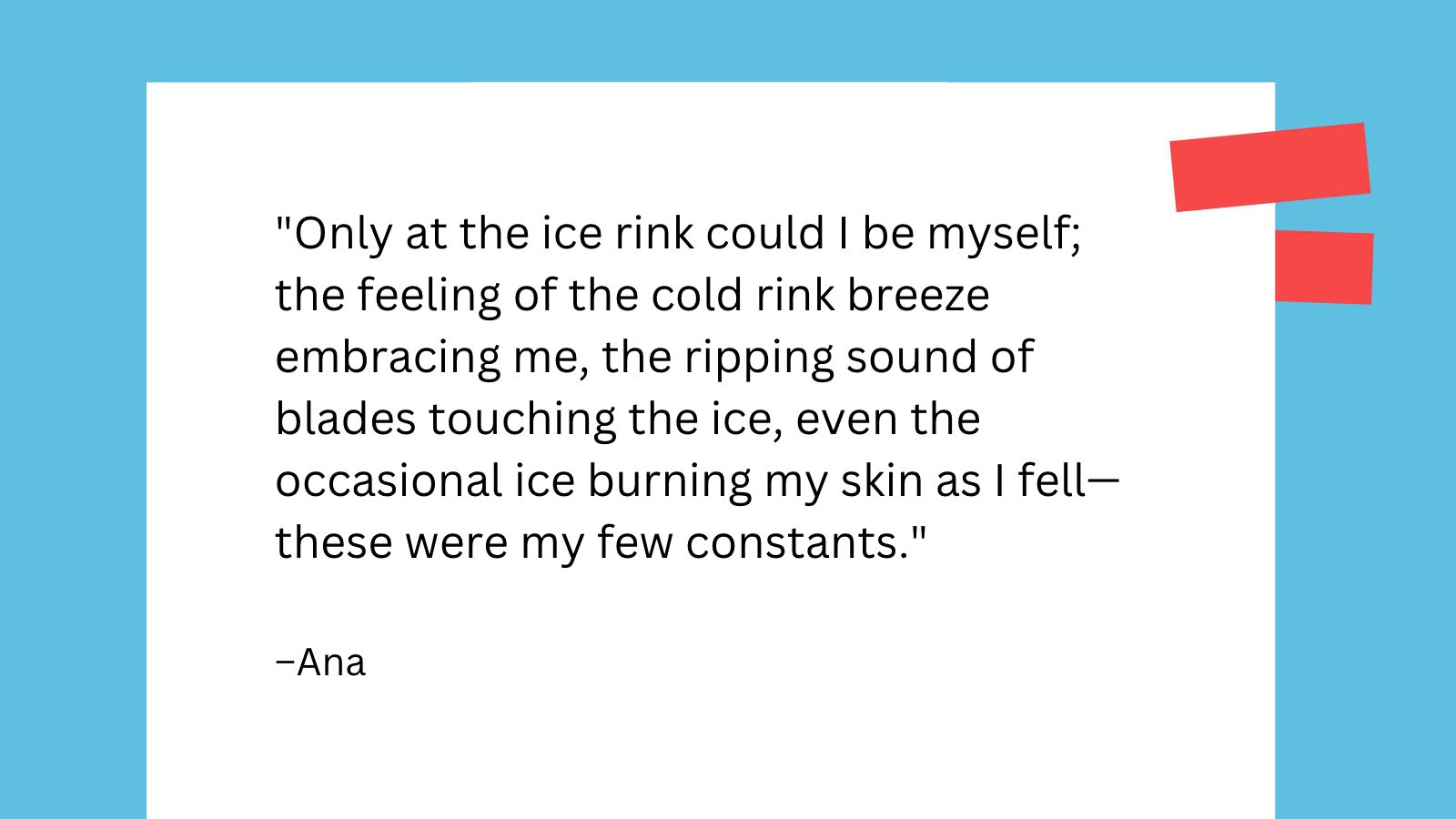
Writing a scholarship essay can be intimidating. The competition is fierce and the stakes are high, so students are bound to feel the pressure. It may be helpful, therefore, to look at essays that were successful. What did those students do to impress the committee? These scholarship essay examples will give you a better idea of how to make an application shine!
Tips for Writing a Scholarship Essay
We’ve put together a whole guide for how to write a scholarship essay , so if you haven’t read it already, definitely give it a look! In addition, here are some quick tips to help students get started.
Carefully read the rules
The last thing you need is to be disqualified from winning a scholarship because you didn’t do the right thing.
Start early
Don’t wait until the last minute to start researching and applying for scholarships. Give yourself plenty of time to work through the process.
Get to know the provider
Think of the scholarship provider as your target audience. You want to tailor your essay to impress them, so do your research. What kinds of candidates are they looking for? What causes do they support? Dig deep for the information you need!
Think about who you are, what you want to say, and how to appeal to the scholarship committee. Write everything down and then choose the best ideas.
The scholarship committee will be reviewing many applications. How can you make yours unforgettable? Highlight your strongest assets, share hard lessons if they showcase your growth as a person and/or student, and be honest. Never lie in a scholarship essay!
Be professional
Consider this the most important academic paper you’ve ever written. Don’t use slang or casual language. Submit a properly formatted essay that’s been well-edited and proofread by multiple people.
One last tip
Don’t reuse scholarship essays! Yes, it’s time-consuming, but students need to put the same effort into every application. Use the same process and it will get faster and easier every time!
Scholarship Essay Examples
Afc visionary scholarship essay by nicole kuznetsov.
Award Amount: $5,000
Essay prompt: Why do you want to go to college? Why is it important to you?
Why it was successful: The beauty of this essay is that it’s well-organized and simple. Nicole Kuznetsov chose to outline her story by using chronology and provided a clean, concise story following a linear path.
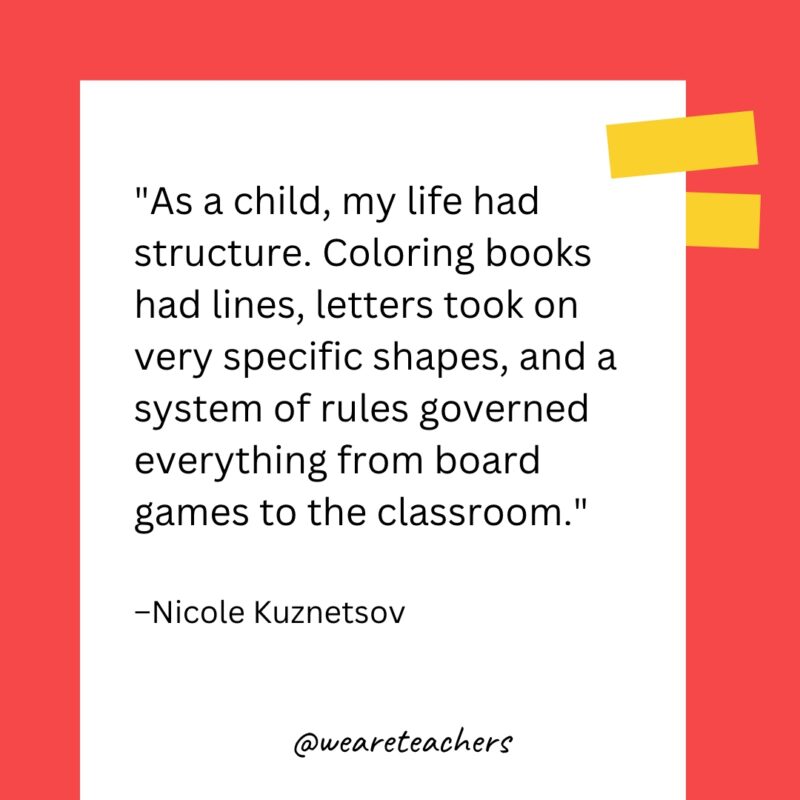
North Coast Section Foundation Scholarship Essay by Christine Fung
Award Amount: $1,000
Why it was successful: Christine Fung masterfully shared how her upbringing instilled strong values, a love for education, and a passion for medicine .
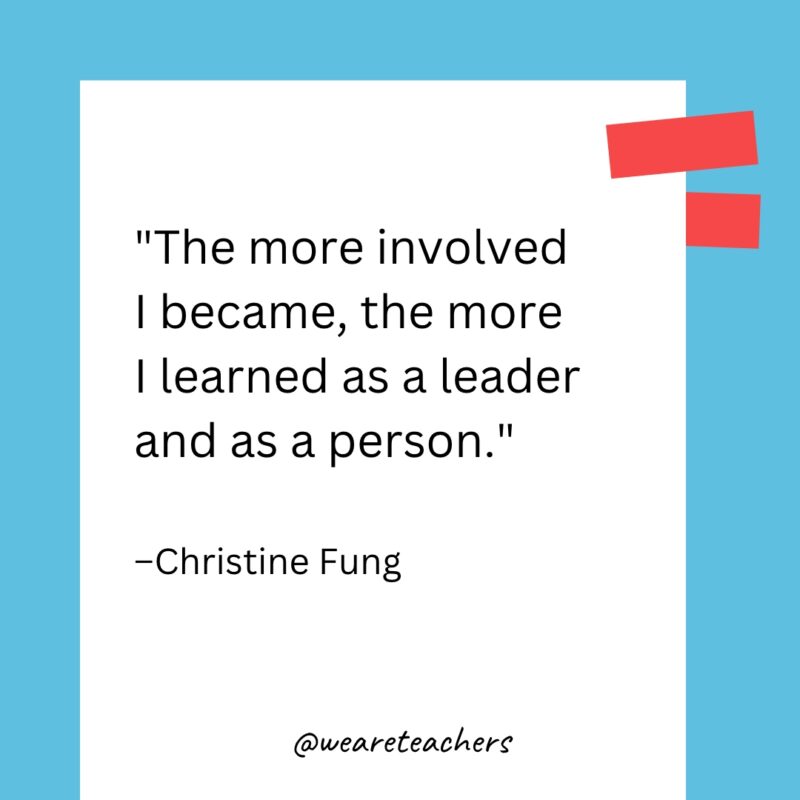
The Bill Browning Scholarship Essay by Gabby DeMott
Award Amount: $10,000
Essay prompt: Discuss an accomplishment, event, or realization that sparked a period of personal growth and a new understanding of yourself or others.
Why it was successful: Gabby DeMott shared her experiences with personal growth and overcoming fears in Germany. She also appealed to the very human feeling of wanting to belong in a way that was inspiring.
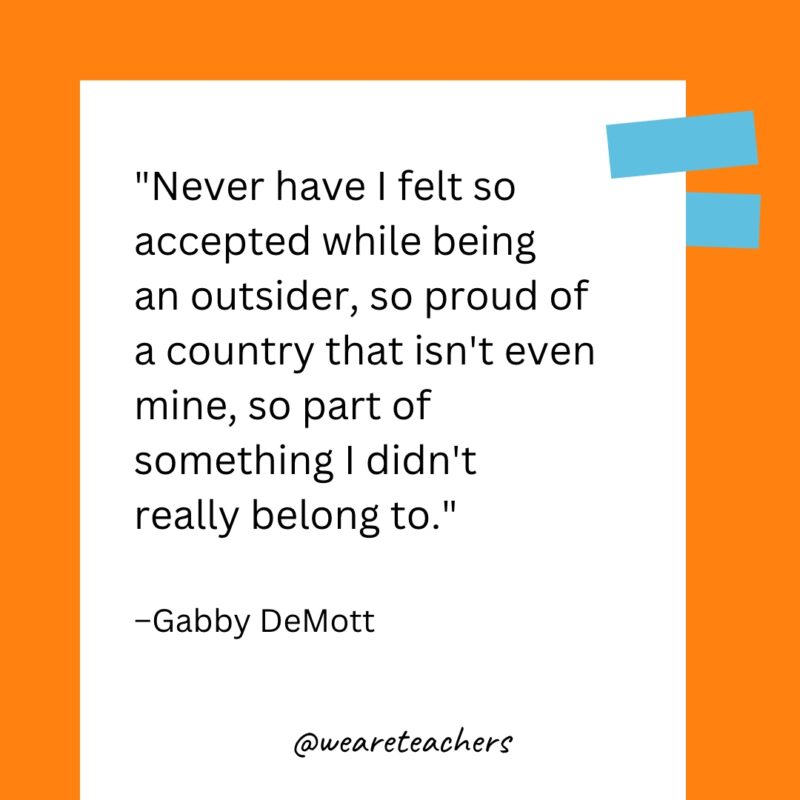
Life Happens Scholarship Essay by Emily Trader
Award Amount: $15,000
Essay prompt: How has the death of a parent or guardian impacted your life financially and emotionally? Be sure to describe how the loss of your parent/guardian impacted your college plans, and explain how the lack of adequate (or any) life insurance coverage has impacted your family’s financial situation.
Why it was successful: Emily Trader fully addressed the prompt in honest, beautiful detail. She knew her audience and tailored her essay to appeal to them while telling her compelling story.
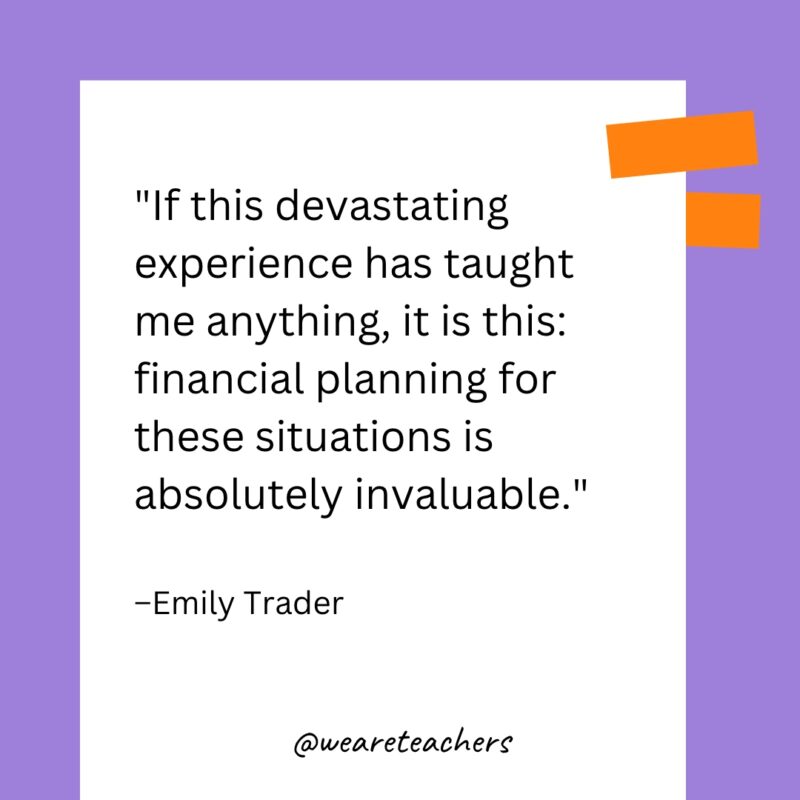
Change a Life Foundation Scholarship Essay by Isabella Mendez-Figueroa
Essay prompt: Please explain how your experience volunteering and participating in community service has shaped your perspective on humanity. Elaborate on how these experiences have influenced your future ambitions and career choice.
Why it was successful: Isabella Mendez-Figueroa shared an empowering story about her parents overcoming financial adversity so that she and her sister could be the first in their family to go to college.
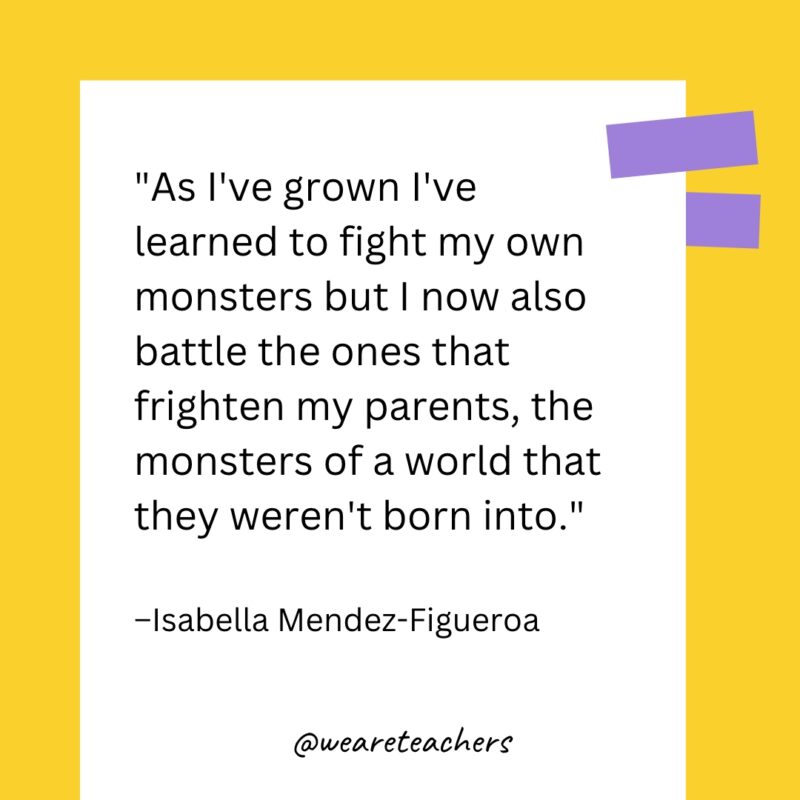
Giva Scholarship Essay by Joseph Lee
Essay prompt: Who is (or what makes) a good doctor?
Why it was successful: Joseph Lee offered a captivating , personal story that was essentially a list of things that make someone a good doctor without it feeling boring or calculated.
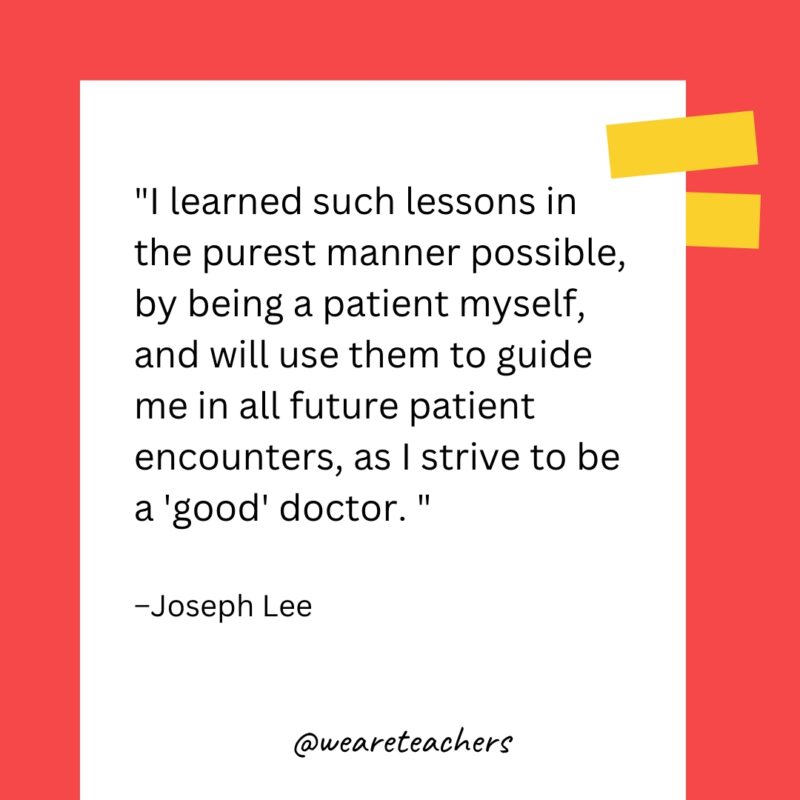
New York University College of Arts and Science Scholarship by Ana
Award amount: $39,500
Essay prompt: Explain something that made a big impact in your life.
Why it was successful: Ana discussed how early experiences w ith learning difficult things has contributed to her passion for teaching and supporting students.
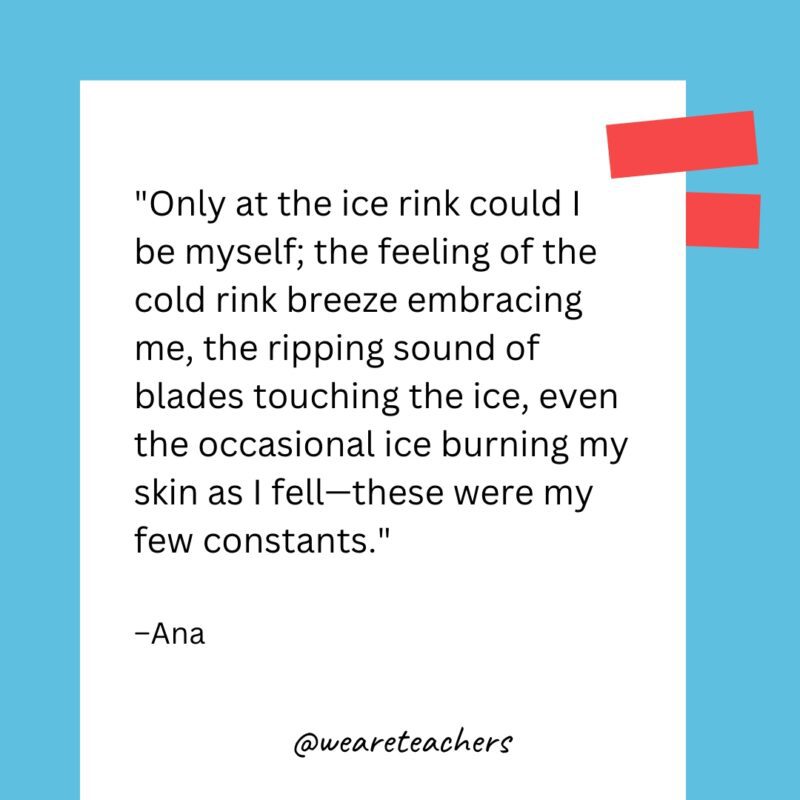
The Fund for Education Abroad Rainbow Scholarship Essay by Steven Fisher
Award amount: $7,500
Essay prompt: The Fund for Education Abroad is committed to diversifying education abroad by providing funding to students who are typically under-represented in study abroad. Please describe how you and/or your plans for study abroad could be viewed as under-represented.
Why it was successful: Steven Fisher’s powerful essay connected his realizations about his own sexual identity with embracing the beautiful diversity found all around the world.
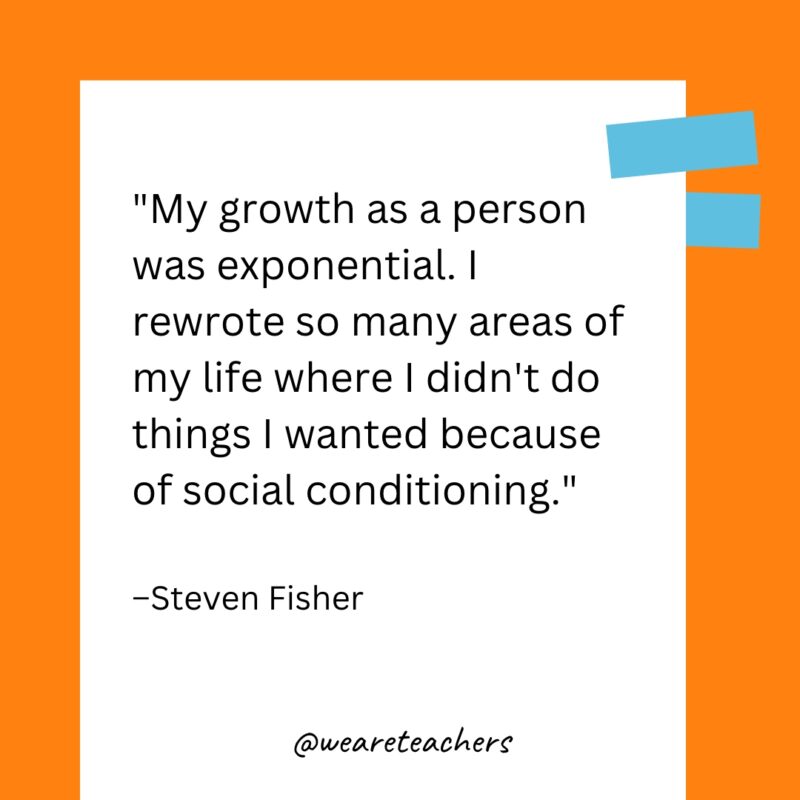
Women’s World Banking Founder’s Scholarship Essay by Rosaisha Ozoria
Essay prompt: Write about your hopes for the future of women and girls worldwide.
Why it was successful: Rosaisha Ozoria focused on a very specific topic , financial literacy for Hispanic women, and emphasized its importance and relevance to her own life.
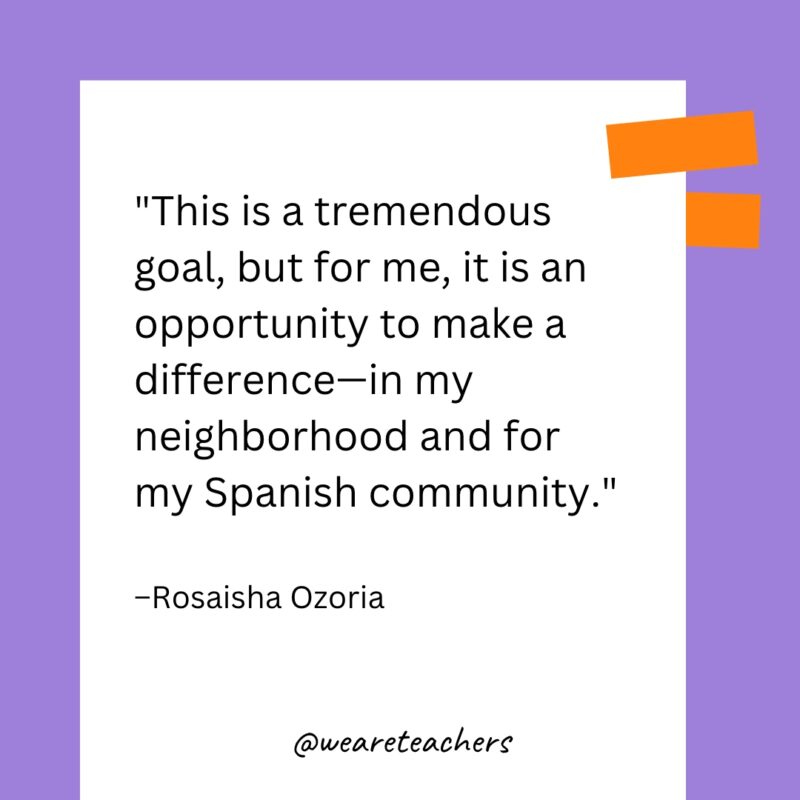
The Millennium Gates Last Dollar Scholarship Essay by Famyrah Lafortune
Award amount: $3,500
Essay prompt: Education is the most powerful weapon which you can use to change the world.” —Nelson Mandela Describe a change you would like to make in the world. Tell us about how you would plan to make that change, and what obstacles you might encounter along the way.
Why it was successful: Famyrah Lafortune starts with a strong statement about ending racial inequality and then details the steps she’ll take to make it happen.
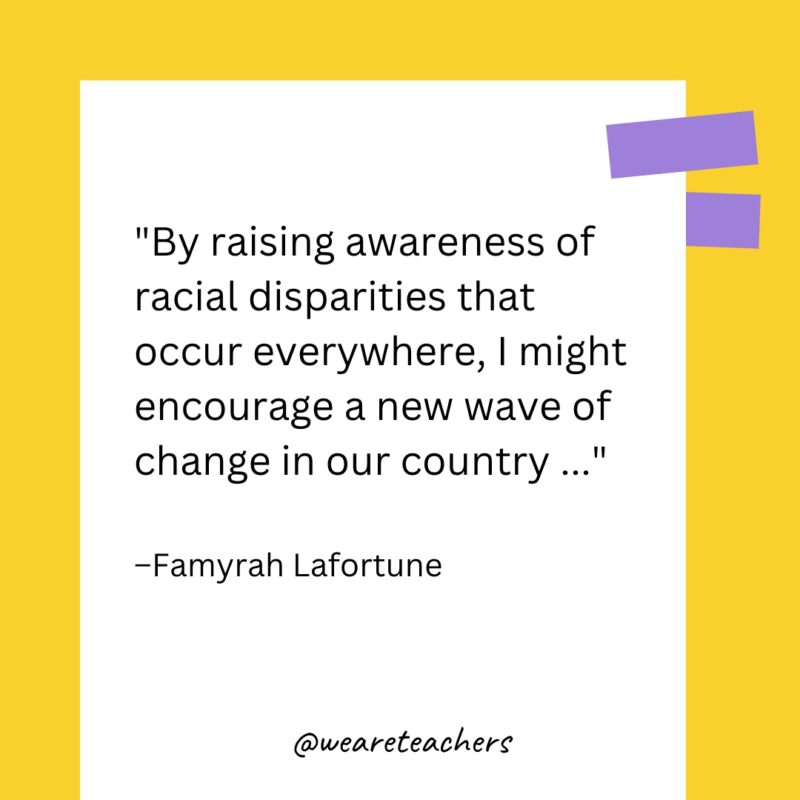
Do you have any great scholarship essay examples? Share them below!
Plus, check out the ultimate guide to college scholarships, want more suggestions be sure to subscribe to our newsletters ..
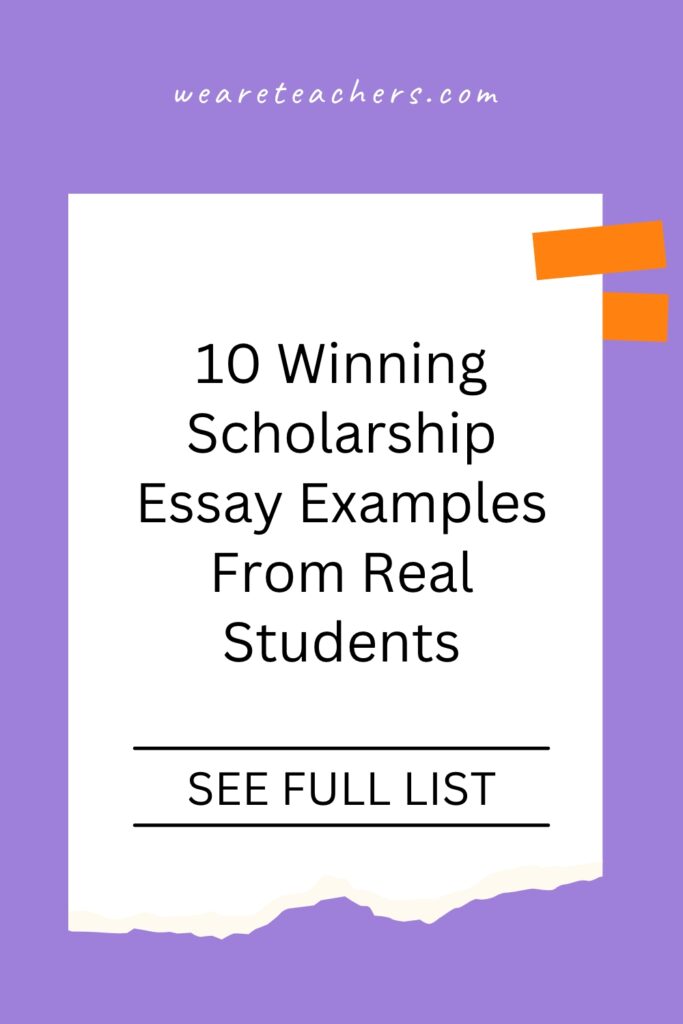
You Might Also Like
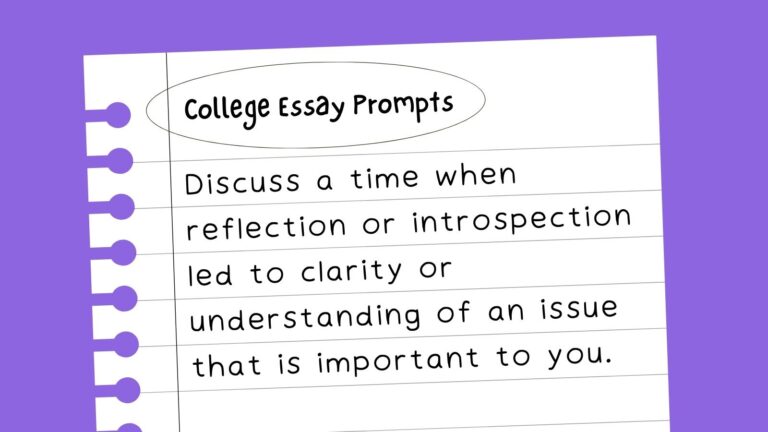
60+ College Essay Prompts From Actual 2023-2024 Applications
Ideas to inspire every college applicant. Continue Reading
Copyright © 2023. All rights reserved. 5335 Gate Parkway, Jacksonville, FL 32256
Home — Essay Samples — Geography & Travel — Travel and Tourism Industry — The History of Moscow City
The History of Moscow City
- Categories: Russia Travel and Tourism Industry
About this sample

Words: 614 |
Published: Feb 12, 2019
Words: 614 | Page: 1 | 4 min read

Cite this Essay
Let us write you an essay from scratch
- 450+ experts on 30 subjects ready to help
- Custom essay delivered in as few as 3 hours
Get high-quality help

Dr Jacklynne
Verified writer
- Expert in: Geography & Travel

+ 120 experts online
By clicking “Check Writers’ Offers”, you agree to our terms of service and privacy policy . We’ll occasionally send you promo and account related email
No need to pay just yet!
Related Essays
9 pages / 3936 words
6 pages / 3010 words
2 pages / 1026 words
4 pages / 2143 words
Remember! This is just a sample.
You can get your custom paper by one of our expert writers.
121 writers online
Still can’t find what you need?
Browse our vast selection of original essay samples, each expertly formatted and styled
Related Essays on Travel and Tourism Industry
Travelling is a topic that has been debated for centuries, with some arguing that it is a waste of time and money, while others believe that it is an essential part of life. In this essay, I will argue that travelling is not [...]
Paris, known as the City of Light, is one of the most iconic and culturally rich cities in the world. My recent visit to Paris was an unforgettable experience that allowed me to immerse myself in the history, art, and beauty of [...]
Traveling is an enriching experience that allows individuals to explore new cultures, meet people from different backgrounds, and broaden their perspectives. In the summer of 2019, I had the opportunity to embark on an amazing [...]
Travelling has always been an exhilarating experience for me, and my recent trip to Rome was no exception. The ancient city, with its rich history and breathtaking architecture, left a lasting impression on me. It was a journey [...]
When planning a business trip all aspects and decisions rely heavily on the budget set by the company for the trip. Once Sandfords have confirmed the location careful consideration should be used to choose the travel method and [...]
4Sex Tourism in ThailandAs we enter a new millenium the post-colonial nations in the world are still searching for ways to compete in an increasingly globalized, consumption driven economic environment. Many developing countries [...]
Related Topics
By clicking “Send”, you agree to our Terms of service and Privacy statement . We will occasionally send you account related emails.
Where do you want us to send this sample?
By clicking “Continue”, you agree to our terms of service and privacy policy.
Be careful. This essay is not unique
This essay was donated by a student and is likely to have been used and submitted before
Download this Sample
Free samples may contain mistakes and not unique parts
Sorry, we could not paraphrase this essay. Our professional writers can rewrite it and get you a unique paper.
Please check your inbox.
We can write you a custom essay that will follow your exact instructions and meet the deadlines. Let's fix your grades together!
Get Your Personalized Essay in 3 Hours or Less!
We use cookies to personalyze your web-site experience. By continuing we’ll assume you board with our cookie policy .
- Instructions Followed To The Letter
- Deadlines Met At Every Stage
- Unique And Plagiarism Free
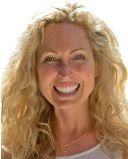
High School Students Thrive as Researchers
Authentic exploratory research hones students’ investigation and analysis skills..
Posted April 1, 2024 | Reviewed by Monica Vilhauer
- Why Education Is Important
- Find a Child Therapist

This post is Part I in a series.
I got to speak with students at Laguna Beach High School (LBHS) recently when giving a career talk there. They kept asking me advanced questions about conducting studies, writing, and science, and they spoke with passion about their own research projects. I was taken aback by how much these high school teens sounded like my adult college students and peers. They kept mentioning “AER”, and I had to learn more.
LBHS’s Authentic Exploratory Research (AER) Program is an independent research course inspired by Palo Alto Unified School District’s Advanced Authentic Research Program. In AER, students are paired with adult mentors (such as LBUSD staff, industry experts, and academics) who assist the teens in researching their own big questions in fields of their choice. Students spend about 60 hours per semester on coursework that includes both instruction and working on each project itself.
No such courses were offered at LBHS when I graduated there back in 1990, and I wonder how much sooner I could have enjoyed my career as a researcher if I had gotten to participate in AER as a youth. Though the program was introduced in 2019 by Laguna Beach Unified School District (LBUSD) Superintendent Jason Viloria, Ed.D., Jun Shen is the passionate teacher and edtech coordinator who runs it. I had the pleasure of partnering with Shen for an interview series where we’ll first explore how AER works before hearing from students about their experiences with AER honing skills for future success. Students’ feedback (in interviews to follow) and Shen’s answers (which follow each question below) can help others implement such a program.
Jenny Grant Rankin: What were the biggest challenges to implementing a successful AER program, and how did you tackle them?
Jun Shen: The biggest ongoing challenge is to find the balance between respecting the students’ individual freedom in their projects on one hand, and on the other, closely managing the students so they’d make adequate progress. Tackling this is an iterative process. Through the last four years, I have tried many different methods like online journaling, different grading rubrics and requirements, different communication protocols, and it seems to be steadily getting better.
JGR: When pairing students with adult mentors, how do you find and secure mentors who are appropriate for students' different interests?
JS: We have a dedicated Mentor Coordinator for AER, at first the ASB Director Jennifer Lundblad, then our District’s Career Education Coordinator Kellee Shearer. After students register for AER in March, we interview them in April and May to get a good feel for their field of interest, and Kellee spends the summer finding them mentors.
JGR: When speaking to your students about AER, I was impressed by the sophistication with which they discussed their studies. What was the most powerful strategy you used to help high schoolers understand research concepts that are hard for even college students to grasp?
JS: Most AER students are definitely wise beyond their years but I can’t claim credit for this one. It’s definitely a team effort, with a splash of selection bias thrown in. Most (though not all) students who take on the challenge of AER are already high-performing and highly-motivated students; thus, they’ve already learned a lot of the research and analysis skills in some of their other upper-level classes. In addition to that, we have a full-time Library Media Specialist, first Stephanie Gamache then Glen Warren, who works with the students to help them find what they need. Their mentor is another obviously valuable asset. As for me, I do very little whole-group, one-size-fits-all instruction about research and data analysis. Most of the students’ research methodologies are created individually with my advice.
JGR: What can you tell educators who are nervous about giving students so much independence and freedom in a course?
JS: First, be curious. If you love learning new things, then you’ll have a great time with your students as you explore some obscure topics together. The more you communicate that you’re personally invested in their study, the harder they will work with you. Second, it won’t be perfect your first year and that’s OK. Looking back, my first year running AER was rather lackluster, with a sizable portion of students dropping out or barely finishing their projects. Every year we learn our lessons and improve the course for the following year. Third, don’t reinvent the wheel. We based our program on Palo Alto USD’s program and, year after year, have modified it to suit our culture and needs. Start with their or our curriculum and see where it leads you.
JGR: What else should readers know about AER?
JS: It’s one of the highlights of my career. I’ve always been that kid who watched as many Discovery Channel Documentaries as I could because I loved learning about everything. I never thought that I’d get to geek out with kids about Aerospace Engineering and Fashion Design in a high school teaching job!
I’ve always been that kid, too. It’s heartwarming to learn how AER can be as rewarding for staff as it is for students, who we’ll hear from next. To continue reading, look for Part II.

Jenny Grant Rankin, Ph.D., is a Fulbright Specialist for the U.S. Department of State.
- Find a Therapist
- Find a Treatment Center
- Find a Support Group
- International
- New Zealand
- South Africa
- Switzerland
- Asperger's
- Bipolar Disorder
- Chronic Pain
- Eating Disorders
- Passive Aggression
- Personality
- Goal Setting
- Positive Psychology
- Stopping Smoking
- Low Sexual Desire
- Relationships
- Child Development
- Therapy Center NEW
- Diagnosis Dictionary
- Types of Therapy

Understanding what emotional intelligence looks like and the steps needed to improve it could light a path to a more emotionally adept world.
- Coronavirus Disease 2019
- Affective Forecasting
- Neuroscience
New Saint Andrews College
- Rating 3.92 out of 5 37 reviews
Report Card
- Academics grade B minus
- Value grade unavailable
- Diversity grade B
- Campus grade unavailable
- Athletics grade unavailable
- Party Scene grade unavailable
- Professors grade C minus
- Location grade B minus
- Dorms grade unavailable
- Campus Food grade unavailable
- Student Life grade B
- Safety grade unavailable
New St. Andrews Admissions
Students also applied to ....
- grade B Lewis-Clark State College
- grade B minus The College of Idaho
- grade B minus Idaho State University
- grade B minus Eastern Oregon University
- grade B minus Carroll College
- grade A minus University of Idaho
- grade B minus Patrick Henry College
- grade B minus University of Providence
Will You Get In?
Will you get into new st. andrews.
Test Scores and High School GPA for New Saint Andrews College See Other Colleges
Find Student Loans
Scholarship, most popular majors.
- Liberal Arts and Humanities 28 Graduates
- Mix of Online and on Campus 97%
- On Campus 1%
- More opinions are needed to display this poll. Take our survey to add your opinion.
After College
More opinions are needed to display this poll. Take our survey
Similar Colleges
- LEWISTON, ID
- Rating 3.84 out of 5 541 reviews
- CALDWELL, ID
- Rating 3.8 out of 5 472 reviews
- POCATELLO, ID
- Rating 3.61 out of 5 1,464 reviews
- LA GRANDE, OR
- Rating 3.72 out of 5 426 reviews
New Saint Andrews College Reviews
- Rating 5 out of 5 Excellent 15 reviews ( 41 %)
- Rating 4 out of 5 Very Good 10 reviews ( 27 %)
- Rating 3 out of 5 Average 9 reviews ( 24 %)
- Rating 2 out of 5 Poor 0 reviews ( 0 %)
- Rating 1 out of 5 Terrible 3 reviews ( 8 %)
- 3 months ago
- Overall Experience
- 9 months ago
- Feb 10 2023
Add to List
Moscow District
- Environment
District Summary Ratings
- Top Rated Schools
College Success Award
District student progress, advanced courses.
- ENVIRONMENT
Student Demographics
Teachers & staff, district calendar, district finances.
- Nearby homes for sale
A larger number of schools in this district are rated above average in school quality.
Top Rated Schools in This District
A larger number of schools in this district have students who are making more academic progress than their peers at other schools in the state.
Academic Summary
Greatschools district data sources & information, 8th grade algebra 1 participation rate.
Source : Civil Rights Data Collection, 2018
8th grade Algebra 1 pass rate
Ap math course participation, ap science course participation, other ap course participation, students per teacher.
The average number of students per full-time teacher in this district; please note that this is not a reflection of average class size.
Students per counselor
The average number of students per counselor in this district.
% of teachers with 3 or more years experience
The percentage of full-time teachers in this district who have been teaching for 3 or more years.
% of full time teachers who are certified
The percentage of full-time teachers in this district who have met all applicable state standard teacher certification requirements.
Average teacher salary
The average salary for full-time teachers in this district.
This indicates the percentage of schools in this district that have a full-time or part-time registered nurse on staff.
Psychologist
This indicates the percentage of schools in this district that have a full-time or part-time licensed psychologist on staff.
Law enforcement officer
This indicates the percentage of schools in this district that have a full-time or part-time sworn law officer on campus.
Total district revenue
This reflects the total annual funds this district received from local, state, and federal sources, compared to the average across the state. (See examples below).
Source : National Center for Education Statistics, 2017
Average revenue per student
This reflects how much annual revenue per student this district has compared to the state average. The revenue per student figure offers a helpful way to compare districts, since total revenues will vary greatly between large and small districts.
Funds from the federal government, which can include money for Title 1 schools, vocational and tech education, bilingual education, and the Child Nutrition Act, and more.
Funds from the state government, which can include money for staff improvement, special education, gifted and talented, bilingual, and vocational education, school lunch, transportation, and employee benefits, and more.
Funds from local sources, which can include money from parent organizations like a PTA/PTO; local property, sales, or utility taxes, and transportation, and more.
Total district spending
This is a breakdown of this district’s total spending, including spending on preK-12 education, adult education, payments to governments, private or charter schools, spending on buildings, roads, and equipment, and more.
Average spending per student
This reflects how much money this district spent on a per-student basis, compared to the state average. This figure can help you compare districts to one another.
Instruction
Spending on preK-12 instruction, including teacher salaries and materials for regular, special, and vocational programs during the school year and summer, and more.
Support services
Spending on administrative support for preK-12 education, including professional development, counselors, transportation, materials, and more.
Other preK-12 spending
Spending on preK-12 spending outside of instruction and support services.
Other spending
Other spending, including community services, adult education, and spending on things like buildings and roads.
Homes Nearby
Homes for rent & sale near this district
Reviews From Schools in Moscow District
- ADVERTISING OPPORTUNITES
- ORDER OBITUARY
- ORDER CLASSIFIED ADS
- ORDER BUSINESS CARD ADS
- ORDER LEGAL NOTICES
- HAVE A NEWS TIP?

Westfield High School students learn practical skills

A well-rounded education at Westfield High School is about more than reading, writing and arithmetic. The school’s Family and Consumer Sciences program has seen a boom in development and participation since it was first reimagined a decade ago.
Nikki Heflin is a culinary educator in the department. While Heflin and her partner Bryan Ferreire are well known around Westfield as the leaders of the culinary arts program and sponsors of Foodies Rock — a full-service catering organization made up of high school students — Heflin said there’s more to family and consumer sciences than what’s cooking in the kitchen.
“What brings me such great pride in having a true, comprehensive family and consumer sciences program at Westfield High School is that we are able to provide a lot of experiential education here for our students that provides them with several different career pathways,” Heflin said. “In the courses they are really able to explore what they want to do post-graduation.”
The department has five educators and multiple classes. The courses, taught by Heflin, Ferreire, Katie Duda, Julie McComb and Renee Kohlmann, include culinary arts, early childhood education, interpersonal relationships, adult roles, tourism and visual arts and designs.
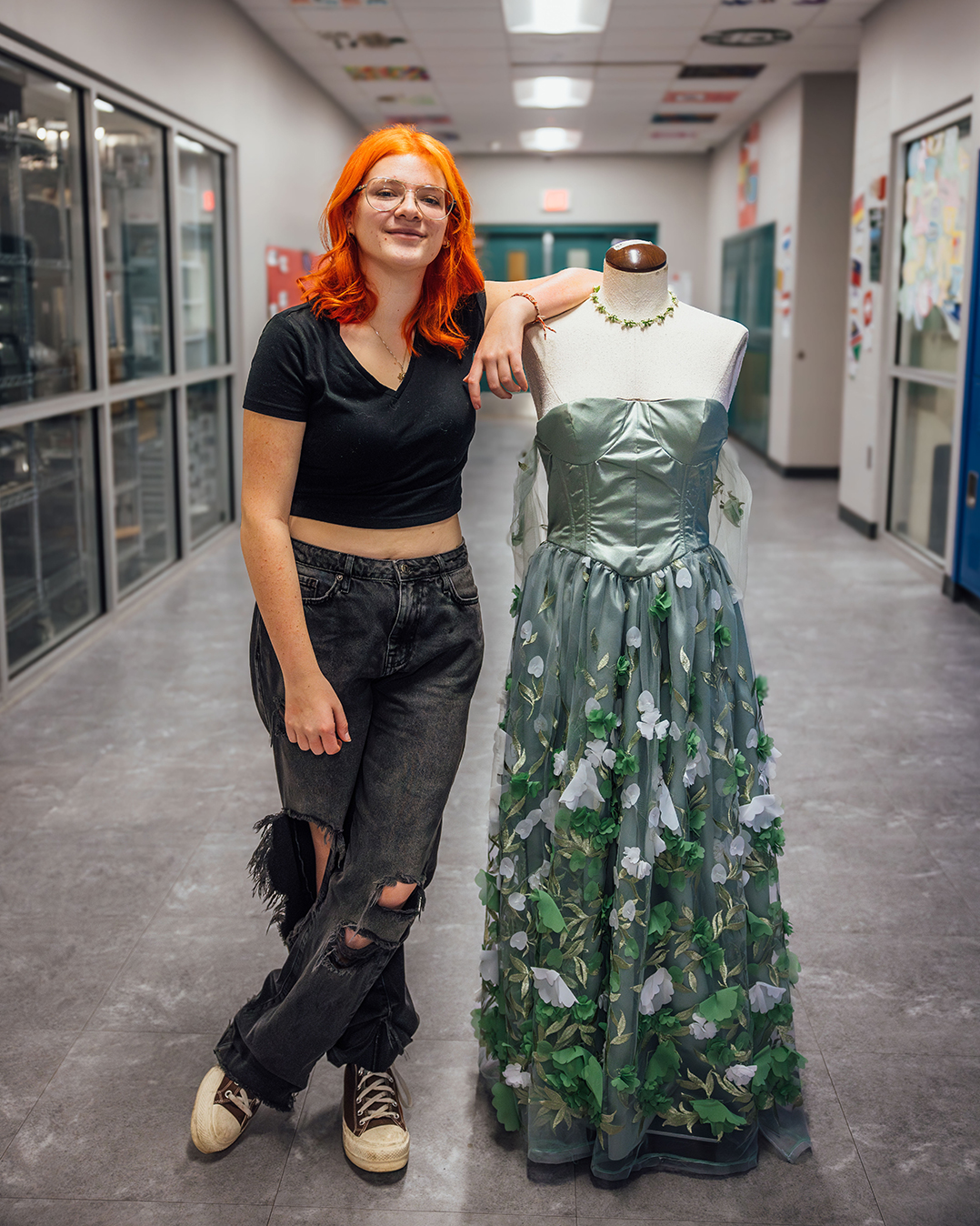
Freshman Emmy Watson participates in fashion construction with FCCLA, the family and consumer sciences national technical organization.
“It really inspired me to do something more creative,” Watson, 15, said of family and consumer sciences. “I was able to do fashion construction this year, where you design and make your own garment, then you present a marketing plan and how you made it as well as a budget, pricing, and future plans for your design career.”
Watson designed a formal gown called “Someone New” for the FCCLA competition on March 1, where she qualified as an alternate for Nationals, held June 29 in Seattle.
“I love that it’s such a practical product at the end,” Watson said. “You have an end product that can be used not just by yourself, but it can be appreciated by almost everyone.”
Alyssa Pazdernik, 17, is a junior who spent one trimester this year in early childhood education, spending time at the early learning center three times a week for hands-on experience with children in preschool and younger.
“I’ve always had the interest in becoming a teacher, but I didn’t know if it was something that I really wanted to pursue, so it allowed me that time and opportunity to see if this is something I want to pursue in college,” Pazdernik said.
Sofia Arocha, 17, a WHS senior, said family and consumer sciences introduced her to interior design.
“It was a class that really interested me because I think I am going to go into (design),” Arocha said. “You learn about the principles of how everything in a room should feel together, how things should be unified and nothing should feel odd. There are a lot of things that go into that, it’s all about balance, lines, shapes. We don’t even think about it but rooms are thought out to be not only pretty but also useful. That’s something you really learn in the class.”
Family and consumer science courses teach students not only practical know-how, but career skills.
“Hospitality careers play a pivotal role in the growth of Indianapolis and central Indiana, contributing significantly to the local economy by attracting tourists, creating employment opportunities, and fostering overall development,” Ferreira said, noting that Indianapolis is front and center for hospitality needs this year, with events such as the NBA All Star Weekend, the eclipse, U.S. Olympic swim trials and three nights of Taylor Swift.
“Teaching students about these careers and having guest speakers from the local industry help to create awareness and build the next generation of hospitality leaders from our local community,” Ferreira said.
Enrollments for family and consumer sciences courses for next year are already at 1,100 students.
“I’m very proud of our home economics roots. Where we used to be preparing students just to take care of the home, now we’re preparing students to be life ready,” Heflin said. “It’s not just about taking a course and getting through the day. Family and consumer science is about preparing students to be successful in their everyday lives, their communities, their families and their careers. That’s what it meant to me about building this program and why I’m so proud to be an educator in the family and consumer sciences field.”

Stay CURRENT with our daily newsletter (M-F) and breaking news alerts delivered to your inbox for free!
Email (required) *
Phone Number
Yes, I would like to receive emails from Current Publishing. (You can unsubscribe anytime)
More Headlines
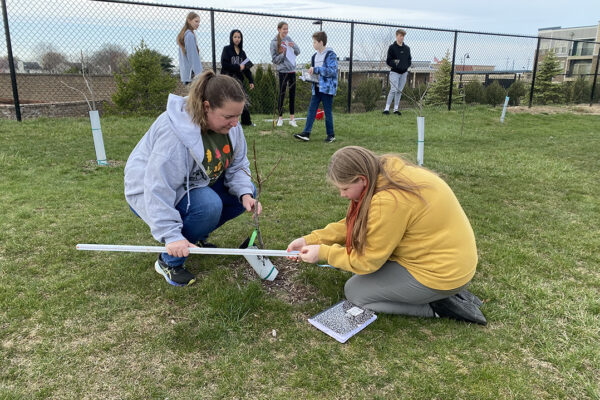
- Add new school
- Provide access to existing school
- Private schools
- England / UK
- USA / America
- Switzerland
- University preparation
- Netherlands
- Universities Abroad
- Kids language camps
- Secondary school education
- Boarding schools
- Higher education abroad
- Learning languages
- English courses abroad
- English courses in England
- English courses in USA
- English courses in Ireland
- English courses in Canada
- Primary, secondary education
- Higher education
- Adult language courses
- Academic languages
- Language test preparation
- Business courses
- Online courses
- United Kingdom
- United Arab Emirates
- private school
- language school
- boarding school
- international college
- public school
- About Smapse Education
- Why work with us
- Why trust us
- Client's reviews
- Arranging your studies
- Financial guaranties
- Customer video reviews
- Services and prices
- Immigration and citizenship
- Scholarships
- Tutoring and preparation for schools, universities abroad
- Advertising
- Group travel
- For teachers
- Terms of partnership (for agents)
- Instructions (for agents)
- FAQ (for agents)
- For schools
- Educational fairs
School №1501

Description of School №1501
- Established: in 1989
- Location: Moscow, Russia
- Age of students: 7 - 17 years.
- Type of education: joint (mixed)
- Type of accommodation: accommodation is provided only for pupils of the orphanage for students with hearing impairments
- Language of instruction: Russian.
School No. 1501 is a large educational complex, where, together with prestigious universities, they offer programs that allow them to start nurturing qualified medical, engineering and scientific personnel from school. Such an opportunity arose due to the historical features of the institution: the Lyceum No. 1, established at the Moscow University in 1989, became one of the first educational institutions representing the continuous cycle of school and higher education. In 1999, the Lyceum received a new building and the title of “Multi-profile Technical Lyceum No. 1501”, and in 2014, 6 schools and 3 kindergartens were attached to it. All graduates of the school annually become students of the most famous higher educational institutions of the country, including:
- Technical University MSTU. N.E. Bauman;
- Technological University MSTU "Stankin";
- Medical and Dental University MSMU them. A.I. Evdokimova;
- Automobile and Road Technical University MADI (STU).
After enrollment, graduates often continue to develop research projects that began in school. Today, the entire pedagogical team of the educational complex sees its mission and main goal in bringing up not just a harmonious personality, able to easily adapt to the needs of a rapidly changing world, but to nurture responsible citizens who in the future will turn into high-class specialists and will be able to solve state problems in the best way. tasks.
Programs and prices, tuition fees in School №1501
Medical program.
Medical program - a course for students of grades 6-11, including natural science preparatory and medical specialized education. 95% of its graduates associate their profession with medicine and become students of the best universities in the country. The average grade of exam in biology and chemistry among students of this program is 73 out of 100 - such results can be achieved due to the following features of the course:
- the functioning of the "Club of the Young Medic", in which students learn about the work of clinics and laboratories, attend lectures of famous academicians and doctors, and study the departments of the Medical and Dental University. A.I. Evdokimova;
- the study of Latin, the basics of medical terminology, the rules of first aid;
- participation in conferences, research contests;
- continuous improvement of their knowledge and skills of teachers who undergo advanced courses, participate in professional conferences, contests, seminars, master classes.
At the end of the school medical course, graduates of the eleventh grades have the opportunity to pass a specialized pre-vocational exam, the points of which are added to the amount of points previously received by the student during the Unified State Examination (subject to admission to the First Medical University of Moscow State Medical University).
Engineering program
The engineering program is a natural science and technical course designed to help pupils of the tenth and eleventh grades decide on the choice of a future engineering specialty during school. Together with the Moscow Lyceum No. 1501, the project participants are federal higher education institutions and high-tech Russian enterprises. Each party has its own role in the program.
Secondary school educational institutions:
- directly implement engineering profile programs;
- organize extracurricular activities of schoolchildren taking into account their technological interests;
- assess the performance of students mastering specialized subjects, additional related courses, practices in non-school organizations.
Higher education institutions:
- develop specialized programs and prepare materials, criteria for diagnosing students' knowledge;
- organize events to improve the qualifications of school teachers participating in the program;
- popularize scientific knowledge;
- organize specialized conferences, competitions, practical courses.
Engineering industry enterprises:
- take an active part in the formation of requirements for the competencies of graduates;
- help organize the research activities of schoolchildren;
- assist in the organization and practice;
- they are working on vocational guidance: they acquaint students with specific engineering specialties and positions, explain which direct duties each of them provides.
Academic (scientific and technological program)
The scientific and technological program at lyceum No. 1501 allows high school students (students of 10-11 grades) to prepare themselves in the best way for getting higher academic education in the field of economics and in the future to work in high-tech industries, the development of which will determine Russia's economic capacity as a whole. Full implementation of the course is possible thanks to the close cooperation of the Lyceum with the Institute of Design and Technological Informatics of the Russian Academy of Sciences and the Moscow State Pedagogical University.
The course contains elements of pre-vocational education, special attention in its framework is paid to the formation of the following skills in students:
- ability to work in a team, find a common language with students from other educational institutions of different ages under the guidance of scientists;
- conduct effective search operations in conditions where the result is not known in advance;
- correctly formulate and verify their own hypotheses;
- apply modern methodology for scientific research;
- critically assess the accuracy and significance of the results obtained in the process of research.
In order to ensure maximum immersion of schoolchildren in the world of academic research on the basis of the school are:
- a circle from the academician, where students can attend lectures of university professors, famous scientists;
- Summer academic practice, which allows students to improve their research skills.
- algebra (3 hours);
- geometry (3 hours);
- probability theory and statistics (1 hour).
The "Mathematical vertical"
The Mathematical Vertical program is the flagship course of the Center for Educational Excellence, in which students in grades 7–9 will study in-depth modern mathematics and the subjects of the natural science cycle. In high school, such a knowledge base will allow them to successfully master specialized, preprofessional, academic, IT courses. Weekly, in addition to other compulsory subjects, students will study:
Also provided for individual and group counseling (2 hours) and classes in a circle (1 hour).
Education in the sixth grade is considered as a preparatory stage of the program, including:
- writing a preparatory program in mathematics (in December);
- visiting the circle of in-depth study of the exact sciences;
- writing an introductory work (in April).
Course performance is assessed according to criteria such as:
- the level of passing the OGE;
- successful completion of specialized diagnostics after the end of the seventh and eighth grades;
- performance at the All-Russian School Olympiad.
- continuous improvement of their knowledge and skills of teachers who undergo advanced training courses, participate in professional conferences, contests, seminars, master classes.
The Mathematical Vertical program is the flagship course of the Center for Educational Excellence, in which students in grades 7–9 will study in-depth modern mathematics and the subjects of the natural science cycle. In high school, such a knowledge base will allow them to successfully master specialized, preprofessional, academic, IT courses. Weekly, in addition to other compulsory subjects, students will study:
Accommodation, meals, prices
As part of the educational complex, there is an institution for studentrs with hearing impairments, which provides for the possibility of 24-hour free stay of pupils on full board basis: with full five meals a day and living on the boarding school territory. All the other constituent educational units of Lyceum No. 1501 provide exclusively for full-time education for high school students living in Moscow.
The school administration organizes meals for students together with the “Social Nutrition Center” enterprise in the form of hot breakfasts and lunches. There are 2 power formats:
- at the expense of the Moscow city budget (for students from socially unprotected and large families);
- on a paid basis.
Since the educational institution consists of several buildings, there are a number of differences between the modes of operation of canteens in different buildings:
- for pre-school offices provided four meals (including lunch and afternoon tea);
- for students living in the Lyceum and studying in the buildings along Malaya Dmitrovka Street and Uspensky Lane, full board is available: the first and second breakfasts, lunch, afternoon tea and dinner.
Activities School №1501
In order to help the lyceum students to develop comprehensively and strengthen their health, there are clubs and sections in various areas in lyceum No. 1501:
- photo studio
- guitar lessons,
- vocal studio;
- communication skills development circle
- Club "Young Journalist";
- French club,
- German language club;
- table tennis,
- basketball,
- volleyball.
Classes in the sections have practical application: the Lyceum students publish the internal newspaper "Lyceum Bulletin", annually prepare calendars with school data, perform and take prizes at various sports competitions, provide photo reports of all school events.
- Included in the TOP-20 of the best schools in Moscow over the past five years.
- The winner of the competition of educational institutions introducing innovations in the educational process (2006).
- Grant winner of Moscow for high results of educational activities (2011).
- Lyceum received a letter of appreciation for the successful and effective implementation of research programs.
- The organizer of the scientific and practical international conference for stuednts "What, how and why - I will figure it out and explain."
- Each graduate of the Lyceum performs design and research work under the guidance of school teachers or teachers of technical universities.
- The Lyceum became the platform from which the webcast of the All-Russian Parent Meeting was held with the participation of the Minister of Education (2015).
Facilities and equipment at School №1501
Versatile educational institution № 1501 consists of seven schools and three kindergartens, which occupy 11 buildings in different streets of Moscow. In total, the school buildings of the institution consist of 202 classrooms + all of them are additionally equipped with the following specialized rooms:
- computer classes;
- workshops for labor lessons;
- art studio;
- technology cabinets;
- study rooms for extended day groups;
- libraries with reading rooms;
- sports and gyms with all necessary equipment;
- street game and sports grounds;
- dining rooms;
- medical offices.
All buildings of the school complex have access to the Internet, as well as connected to the corporate network of the Moscow Department of Education.
Admission dates and extra charges
The school year at school number 1501 starts on September 1 and ends:
- May 21 for elementary school students;
- May 24 for high school students and high school students;
- in accordance with the schedule of final state exams for graduates of the ninth and eleventh grades.
The whole educational process is divided into quarters, each of which ends with a vacation:
- additional February for the first classes.
The cost of education in lyceum No. 1501 is formed from the sum of expenses for food and visits to various sections of the child. Directly the school itself is fully funded from the city budget, but all types of additional extracurricular education are on a paid basis. Prices for school № 1501 in different sections differ from 170RUB / hour for attending the course “Introduction to Logic” to 560RUB for an hourly occupation of foreign languages.
Entry requirements, how to apply, what is required to enrol
School № 1501 enrolls students of different age categories.
Features of the admission of studens in elementary school (grades 1 - 4):
- Parents need to submit an online application on the municipal site of the city of Moscow;
- there are no entrance tests;
- when visiting kindergartens of the multi-disciplinary institution No. 1501, enrollment in the first class takes place in the order of transfer from the pre-school department.
The enrollment of students in grades 7–10 occurs through the process of transferring students from other educational institutions, while taking into account:
- participation in competitions at various levels;
- the results of the monitoring of the Moscow Center for the Quality of Education in core subjects;
- the success of passing the final state certification;
- results of entrance examinations developed by the Lyceum Commission.
Institution on the map
Residence permits, citizenship and other services.
- Guardianship services during the studies
- Student supervision
Review about School №1501
Recommendations on when to apply, similar educational institutions.

Interested in studying in School №1501?
Explore more than just language.

Join us and stay up to date with the latest news and promotions!
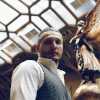
Office of the Vice President for Research
Ovpr announces recipients of 2024 discovery and innovation awards.
The Office of the Vice President for Research (OVPR) is honoring 11 faculty and staff for their exceptional contributions to research, scholarship, and creative activity as part of the 2024 Discovery and Innovation Awards .
“ The winners represent the best and the brightest of our University of Iowa faculty and staff, who are making an impact across a range of disciplines,” said Marty Scholtz, vice president for research. “Their research and scholarship enhance undergraduate and graduate education on campus, and their efforts to expand the frontiers of discovery betters our community, state, and world.”
The OVPR solicited nominations from across campus for the awards, which include: Scholar of the Year, Early Career Scholar of the Year, Leadership in Research, and awards that recognize achievement in communicating scholarship with public audiences, community engagement, arts and humanities, mentorship, research administration and safety. A campuswide event on April 30 will celebrate the winners.
Faculty Awards

Jun Wang , James E. Ashton Professor and interim departmental executive officer in the College of Engineering’s
Department of Chemical and Biochemical Engineering, is the 2024 Scholar of the Year . The award celebrates nationally recognized recent achievement in outstanding research, scholarship, and/or creative activities.
Wang’s research centers on the development of novel remote sensing techniques to characterize aerosols and fires from space. He serves as the University of Iowa’s lead investigator on NASA’s TEMPO, Tropospheric Emissions: Monitoring Pollution, which Time magazine named one of its best inventions of 2023.
“Professor Wang's scholarly endeavors over the past two years stand out as a paradigm of excellence, serving as an exemplary model for both emerging and seasoned faculty members to aspire toward,” said Karim Abdel-Malek, professor of biomedical engineering and director of the Iowa Technology Institute.
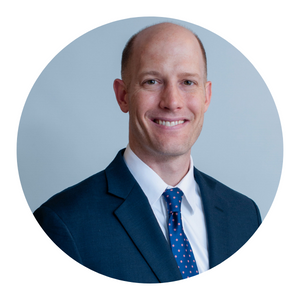
James Byrne , assistant professor of radiation oncology in the Carver College of Medicine ( CCOM ), is the 2024 Early Career Scholar of the Year . The award honors assistant professors who are currently involved in research, scholarship, and/or creative activity and show promise of making a significant contribution to their field.
As a physician scientist, Byrne continues to care for patients while developing novel biomedical therapies for cancer, finding inspiration in everything from latte foam to tardigrades. In his first two years as faculty at the UI, he has earned more that $2.5M in external research funding, including a K08 award from the NIH.
“Dr. Byrne’s scientific creativity stems from both an active and curious mind as well as his ability to bridge diverse fields from engineering to biology to medicine,” said Michael Henry, professor and interim director of the Holden Comprehensive Cancer Center. “These interdisciplinary boundaries are where some of the most interesting and important work is happening today.”

Donna Santillan , research professor and director of the Division of Reproductive Science Research in the CCOM Department of Obstetrics and Gynecology, received the Leadership in Research Award , which recognizes research and scholarly accomplishments throughout a career.
While Santillan’s research has spanned across the field of reproductive science, she has a particular interest in the deadly diseases of pregnancy, including preeclampsia and its intergenerational effects. She designed and directs the Women’s Health Tissue Repository. Santillan’s work has been cited more than 2,700 times, and she has mentored 114 early career scientists and students, a testament to her expansive impact.
“Dr. Santillan has consistently demonstrated an unwavering commitment to fostering the professional and personal development of trainees in research, including myself,” said Banu Gumusoglu, assistant professor of obstetrics and gynecology. “Her mentorship extends beyond the confines of traditional academic settings, touching the lives of many aspiring trainees from high school through residency, clinical fellowship, and faculty levels.”

Stephen Warren , professor of history and American studies in the College of Liberal Arts and Sciences (CLAS), received the Distinguished Achievement in Publicly Engaged Research Award . The award recognizes an individual faculty member who has put addressing public needs and direct engagement with the public, in the service of improving quality of life through research, at the forefront of his or her academic activities.
A prolific scholar of Native American culture, Warren’s research has centered on the Shawnee people of Oklahoma for the past two decades. He has published four books and co-authored the most recent one , Replanting Cultures: Community-Engaged Scholarship in Indian Country, with Chief Benjamin Barnes of the Shawnee Tribe.
“Over the last two decades, Professor Warren has established himself as a leading community-engaged scholar, and his achievements in research and publishing demonstrate that community engagement and strong scholarship are not mutually exclusive,” said Nick Benson, director of the Office of Community Engagement. “Professor Warren’s work serves as an inspiration for researchers at Iowa and nationally who seek not only to make a difference in academia, but also in our communities.”
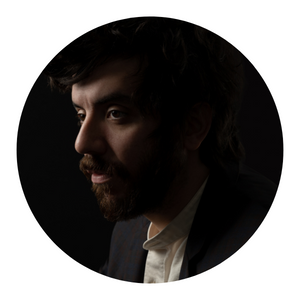
Kaveh Akbar , associate professor of English in CLAS, received the Distinguished Achievement in Arts and Humanities Research Award . This award honors distinguished achievement in humanities scholarship and work in the creative, visual and performing arts.
Akbar joined Iowa in 2022 to serve as the director of the English and creative writing major. In January, his new novel, Martyr!, was published to critical acclaim. Akbar previously published two prize-winning poetry collections and has served as poetry editor for The Nation since 2021.
“Akbar’s leadership in the profession and on campus continues: his transformative work in our department not only enriches the academic experiences of 700+ English and creative writing majors, but also enhances the profile of UI as ‘The Writing University,’” said Blaine Greteman, professor and departmental executive officer of the Department of English.
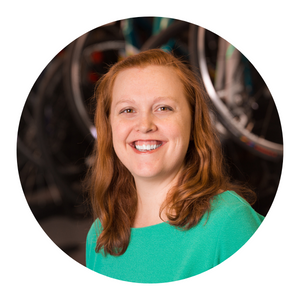
Cara Hamann , associate professor of epidemiology, received the Faculty Communicating ideas Award . This award recognizes excellence in communication about research and scholarship in the sciences and humanities and the study of creative, visual, and performing arts to a general audience directly or via print and electronic media.
Hamann has frequently shared her work on transportation issues, including teen driving, bike and scooter safety, and pedestrian safety, through peer-reviewed journals and extensive media outreach. Her recent op-ed, “The most deadly traffic policy you’ve never heard of leaves you vulnerable, too,” drew widespread attention to a legal loophole in crosswalk laws and appeared in more than 50 news outlets nationwide, including USA Today .
“Dr. Hamann’s work is not only academically rigorous but also accessible and impactful to a
wide audience,” said Diane Rohlman, associate dean for research in the College of Public Health. “Her ability to communicate with clarity, creativity, and passion coupled with her extensive media outreach, exemplifies how she utilizes multiple approaches to address transportation challenges impacting society.”
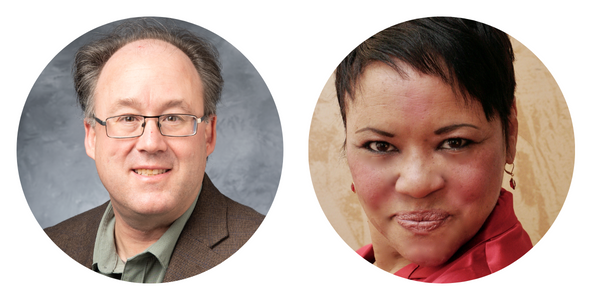
Bob McMurray , F. Wendell Miller Professor in the Department of Psychological and Brain Sciences, and Caroline Clay , assistant professor of acting in the Department of Theatre Arts, were recipients of the Office of Undergraduate Research (OUR) Distinguished Mentor Awards . The awards honors mentors’ dedication to making their students research experiences successful.
“I can’t imagine my research journey without Bob’s welcoming kindness, thriving lab community, and confident mentorship, and I am so deeply grateful for his impact on me,” said Hannah Franke, a psychology and linguistics major mentored by McMurray.
“I know I am far from the only student whose life has been impacted by Caroline Clay,” said Isabella Hohenadel, a second-year theatre arts major. “She deserves to be recognized of all of the wonderful work she does and how much she cares about us as students. I cannot think of anyone more deserving of recognition than her.”
Staff Awards

Angie Robertson , department administrator for CCOM’s Department of Microbiology and Immunology, received the Distinguished Research Administrator Award . The award recognizes staff members who performed exceptional service in support of research at the UI by exploring funding opportunities, assisting in grant proposal preparation, submission, post-award administration, and operational support.
In addition to overseeing every aspect of daily operations for the department, Robertson manages nearly 100 research grants for the department and three longstanding NIH T32 training grants.
“Angie plays a leading role in our department office, inspiring us to achieve all aspects of our missions ,” said Li Wu, professor and department chair. “She is innovative, collaborative, accountable, and respectful in her daily work. She exceeds any expectations and sets a great example for staff members in the department.”

Min Zhu , research specialist in the Iowa Institute for Oral Health Research (IIOHR) within the College of Dentistry, received the Distinguished Research Professional Award . The award recognizes staff members who performed exceptional service in support of research at the UI by conducting experiments, collecting, and analyzing results and performing operational duties associated with a laboratory or research program.
Zhu has worked as a lab bench scientist in the College of Dentistry since 2006, executing experimental work for grants and other research, working closely with IIOHR faculty members, overseeing lab maintenance and environmental health and safety efforts.
“Beyond her research skills, Dr. Zhu has been an exceptional mentor and educator for my students and other junior researchers,” said Liu Hong, professor of prosthodontics. “Her kindness and willingness to share her knowledge have made her a beloved figure among them.”
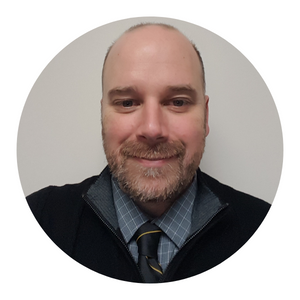
Curtis Iberg , manager of sterilization services in the College of Dentistry, received the Innovation in Safety Award, which celebrates exceptional and ground-breaking innovations that advance safety at the UI. Iberg led a major renovation of the College of Dentistry’s instrument processing and sterilization area, with the aim of encouraging better workflow and support for future growth.
“His innovations in workspace are a valuable asset to the greater University and demonstrates that the most important people to be involved in a space renovation are those that use the area because they can see how the facility can better function and how it can be designed for future needs,” said Kecia Leary, associate dean of clinics.

IMAGES
VIDEO
COMMENTS
Essays Every High School Student Should Read. December 4, 2016 in Pedagogy. One of the most important goals of any English class should be to help students learn how to express themselves to an audience — how to tell their own stories, how to provide much-needed information, and how to convince others to see things from a different perspective.
Changes over the past decade. Stereotype changes in history. Exploration of healthcare. College education costs. Keeping exotic animals in captivity for personal use. The ethics of keeping wild animals in zoos. Selling a piece of art as an NFT. Implementing school uniforms in public schools in America. So get to it and use these essay topics ...
The following ideas work well for compare-contrast essays. ( Find 80+ compare-contrast essay topics for all ages here.) Public and private schools. Capitalism vs. communism. Monarchy or democracy. Dogs vs. cats as pets. WeAreTeachers. Paper books or e-books. Two political candidates in a current race.
With this in mind, here are suggestions to help you get started compiling a good list of articles and essays to read in high school with your homeschoolers. Many of these can be found in their entirety on the internet. John Milton's "Areopagitica". Jonathan Swift's "A Modest Proposal". Thomas DeQuincey's "On the Knocking at the ...
List of 113 Good Persuasive Essay Topics. Below are over 100 persuasive essay ideas, organized into ten categories. When you find an idea that piques your interest, you'll choose one side of it to argue for in your essay. For example, if you choose the topic, "should fracking be legal?" you'd decide whether you believe fracking should ...
In high school, you may have to write many different types of essays to develop your writing skills. Academic essays at college level are usually argumentative : you develop a clear thesis about your topic and make a case for your position using evidence, analysis and interpretation.
1. David Sedaris - Laugh, Kookaburra. A great family drama takes place against the backdrop of the Australian wilderness. And the Kookaburra laughs…. This is one of the top essays of the lot. It's a great mixture of family reminiscences, travel writing, and advice on what's most important in life.
A good narrative essay will begin with an attention-grabbing opening line. But make sure to avoid common clichés, such as "It was the best of times, it was the worst of times.". Instead, come up with something original and specific to you and your situation. For example: "My pre-calc teacher was obsessed with circles.
I could see the horizon again. 2. Narrative Essay. A narrative high school essay is similar to a descriptive essay but focuses more on the story description rather than object description. The story can be about a personal experience that the writer has had, an event, a story, an incident.
What Essay Topics Are Suitable for HighSchool Students. High school is a time of self-discovery, exploration, and development, and your essay topics should reflect these important years in your life. Good essay topics for high school students cover a full range - from analyzing classic literature to researching contemporary social issues.
In this argumentative article , Brent Staples asks readers to consider the ways growing up with such connectivity could impact them as they age. This is a great text to push students to create their own piece of thoughtful argumentative writing. Use Discussion Question 2 as a writing prompt that must be supported with evidence: "What costs ...
Check out our analysis of 3 great personal narrative essay examples, plus tips for writing. Call Direct: 1 (866) 811-5546 ... say you want to write a narrative essay about how your first day in high school helped you establish your identity. You might discuss events like trying to figure out where to sit in the cafeteria, having to describe ...
Those are some of the most interesting, opinionated essay topics for high school level. The biggest perk of the above examples is that most of them are based on a student's opinion. At the same time, most of these topics presuppose some research — so any idea you're proving will not be without confirmation. If you want to get more ...
You may want to share the following five steps with your class to teach them how to write this style of essay—and then use the 23 persuasive essay topics for high school students listed below to help them get started! 1. Choose a Clear Position. Before you begin writing and researching, choose the position you want to take.
Now He's Out." by Ashley C. Ford. Ford describes the experience of getting to know her father after he's been in prison for almost all of her life. Bridging the distance in their knowledge of technology becomes a significant—and at times humorous—step in rebuilding their relationship.
The Bell Jar (Sylvia Plath) This autobiographical novel by poet Sylvia Plath explores the deep, dark reality of mental illness. The protagonist, Esther, a stand-in for Plath herself, is a college student exploring her talents, interests, and sexuality as she descends into an unsettling spiral of mental instability.
The Best American Essays of the Century — anthology, edited by Joyce Carol Oates. 8. The Best American Essays series — published every year, series edited by Robert Atwan. 9. Book of Days — Emily Fox Gordon. 10. The Boys of My Youth — Jo Ann Beard. 11. The Braindead Megaphone — George Saunders.
Insomniac City: New York, Oliver, and Me by Bill Hayes. "Bill Hayes came to New York City in 2009 with a one-way ticket and only the vaguest idea of how he would get by. But, at forty-eight years old, having spent decades in San Francisco, he craved change.
New York University College of Arts and Science Scholarship by Ana. Award amount: $39,500. Essay prompt: Explain something that made a big impact in your life. Why it was successful: Ana discussed how early experiences w ith learning difficult things has contributed to her passion for teaching and supporting students.
The History of Moscow City. Moscow is the capital and largest city of Russia as well as the. It is also the 4th largest city in the world, and is the first in size among all European cities. Moscow was founded in 1147 by Yuri Dolgoruki, a prince of the region. The town lay on important land and water trade routes, and it grew and prospered.
I got to speak with students at Laguna Beach High School (LBHS) recently when giving a career talk there. They kept asking me advanced questions about conducting studies, writing, and science, and ...
Only 47 percent of public high schools say they're doing a "very good" or "excellent" job preparing students for college, according to a new survey from the National Center for Education Statistics, a branch of the U.S. Education Department.. The data, gathered from over 1,600 public schools across all 50 states, also showed that schools in low-income neighborhoods were much less ...
View Full Report Card. New Saint Andrews is a private, Christian college located in Moscow, Idaho. It is a small institution with an enrollment of 188 undergraduate students. The New Saint Andrews acceptance rate is 86%. The only major offered is Liberal Arts and Humanities. New Saint Andrews graduates 63% of its students. nsa.edu. 405 S MAIN ST.
These are some of the best public high schools in Moscow District at preparing students for success in college. The College Success Award recognizes schools that do an exemplary job getting students to enroll in and stick with college, including those that excel at serving students from low-income families.
A well-rounded education at Westfield High School is about more than reading, writing and arithmetic. The school's Family and Consumer Sciences program has seen a boom in development and participation since it was first reimagined a decade ago. Nikki Heflin is a culinary educator in the department.
Established: in 1989. Location: Moscow, Russia. Age of students: 7 - 17 years. Type of education: joint (mixed) Type of accommodation: accommodation is provided only for pupils of the orphanage for students with hearing impairments. Language of instruction: Russian. School No. 1501 is a large educational complex, where, together with ...
The Office of the Vice President for Research (OVPR) is honoring 11 faculty and staff for their exceptional contributions to research, scholarship, and creative activity as part of the 2024 Discovery and Innovation Awards. "The winners represent the best and the brightest of our University of Iowa faculty and staff, who are making an impact across a range of disciplines," said Marty ...